


























My note to you, dear readers, is usually the last thing that I work on each week. There is so much that goes into putting out an issue and so much that has to be dealt with before we go to print. And so, this column usually ends up getting pushed off until the last few hours before the deadline looms. But this week, I decided that I’m not going to leave it until the very end.
You see, we’ve been gearing up for this election for many months. First, it was Biden vs. Trump, which morphed into Harris vs. Trump, but either way, it’s been a long election season. There are many people who are going to be disappointed on election night. And that’s to be expected. There can only be one winner, and the people who supported the other candidate are bound to feel frustrated. The rhetoric in this election will only have exacerbated and intensified those feelings. We’ve been told that if we vote for candidate A, the world as we know it will fall apart – and vice versa.
But as much as our hishtadlus is important and as much as it is imperative that we all vote, we need to keep in mind that the person in the White House –regardless of how inflated their head is – does not run the world. It may look as if they’re strengthening the economy, closing the border, sending arms to Israel…and yet, the true Master is the
One Who is really running the show. It is upon Him whom we rely. It is to Him we turn each day. And ultimately, it is His plan that will decide how the world will look after he or she strides into the Oval Office on the first day.
This election season has given people a lot of anxiety. There is a lot of fearmongering being promulgated by both sides, and the media has used that anxiety to ramp up the rhetoric. But reminding yourself that, after doing your hishtadlus, there should be no cause for concern is a freeing feeling. Regardless of what happens on November 5 – and even the days and weeks after that, should the results be undecided on Election Day –you can rest assured that your future is being taken care of by the One Who cares for you most.
With this thought in mind, I decided to write this note to you before Election Day. It’s Monday night – hours before millions of Americans will line up to vote for the candidate of their choice – and I’ve already voted during early voting. I’ve done my hishtadlus. And now, regardless of who wins, I know that my future is secure because I put my trust in Him.
Wishing you a wonderful week, Shoshana

Yitzy Halpern, PUBLISHER publisher@fivetownsjewishhome.com
Yosef Feinerman, MANAGING EDITOR ads@fivetownsjewishhome.com
Shoshana Soroka, EDITOR editor@fivetownsjewishhome.com
Nate Davis
Editorial Assistant
Nechama Wein
Copy Editor
Rachel Bergida Shana Brecher
Lani White
Design & Production
Gabe Solomon Distribution & Logistics
P.O. BOX 266
Lawrence, NY 11559
Phone | 516-734-0858
Fax | 516-734-0857
Classified Deadline: Monday 5:00PM classifieds@fivetownsjewishhome.com text 443-929-4003
PAYMENT VIA
The Jewish Home is an independent weekly magazine. Opinions expressed by writers are not necessarily the opinions of the publisher or editor. The Jewish Home is not responsible for typographical errors, or for the kashrus of any product or business advertised within. The Jewish Home contains words of Torah. Please treat accordingly.











Dear Editor,
After intense examination of the relevant polling data and in-depth analysis of the voter registration maps combined with abstract algorithms of previous voting trends, professional political pundits have determined that the results of the next presidential election will be determined by the results in only seven swing states!
However, upon further examination they have subsequently narrowed it down to only one state: Pennsylvania.
Incredibly, using more focused scrutiny, they have narrowed it down even further to a single county in Wilkes Barre: Crawford County.
But now, utilizing state-of-the-art Artificial Intelligence, they have been able to narrow the field down even further and identify the swing neighborhood, the very block, and indeed, unbelievably, even zero in on the one person whose singular vote will determine the next president of the United States!
His name is Chaim Yonkle Stupechefski, an Orthodox Jew living in a predominantly chasidic enclave in western Pennsylvania.
Thousands of reporters from assorted media around the world have descended upon and surrounded his modest one family home, and he has suddenly become the focal point of world attention. Who will he vote for? He wouldn’t reveal.
Having correctly decided the last ten presidential elections with his vote, he was being closely monitored yesterday morning when he quickly left his home and headed briskly to a building which reporters assumed was an early voting
location. The by-now frantic media mob followed him in a frenzy. Pushing and shoving, they waited anxiously for his return, breathlessly waiting to learn how he voted.
When he emerged somberly sometime later, he was promptly surrounded and pressed for whom he voted, knowing full well that his choice would be the leader of the free world and ,indeed, the entire planet.
In response, Chaim Yonkel triumphantly held up his blue velvet bag and with a wink and a smile said, “I voted for G-d!”
Country Yossi Toiv
Dear Editor,
I was surprised that not one panelist in the “Dating Dialogue” suggested that this young man was perhaps a bit nervous meeting the family. This is the first time he is meeting the family. Perhaps he was told beforehand that they’re conservativeleaning and that makes him a bit strident when he meets them. But do not turn away this young man just by meeting him once. And do not tell your daughter you don’t like him just by meeting him once. You’ll chase your daughter away and you’ll end up regretting this one conversation. Instead, spend some time with the couple. Tell your daughter how it was nice to meet her “young man” and that you’d like to spend more time with them to get to know him better. Perhaps you can all meet for dinner one night at a restaurant near them. The more you get to know him, the more you’ll understand why your daughter likes him. Alternatively, if there is something wrong with this young man, being Continued on page 12


nonjudgemental with him while meeting him and your daughter over coffee or dinner will help her open her eyes. She’ll start to see him in the context of her family and maybe she’ll start to understand that the way he speaks with her is not OK (if he does speak with her rudely during these dates). She will remember that you support her and that you love her. Ultimately, if he is not the right match, cultivating this relationship and not being confrontational with her will allow her the support and love to make the right decisions.
Thank you,
Beth Rotenberg
Dear Editor,
With the clocks “falling back” one hour, I want to remind all parents – and children – that many kids are coming home from school in the dark. Remind your children about crossing the streets safely. Make sure they have reflective strips on their knapsacks or coats. Many kids are wearing dark-colored coats and clothing, which makes it hard to see them in the dark.
Ariel Hertz
Dear Editor,
We are almost at 400 days since October 7. 400 days!!! That’s 400 days that our people have been kept hostage in dark, dim, airless tunnels. In fear and in terror. Never knowing what the next moment, day, hour will bring.
We must strengthen ourselves to beg Hashem to bring them home. We must take on something in their zechus so that they will be released. Every small thing counts! Inviting guests to your home, bringing in Shabbos early, benching with a bencher, standing in one place for Asher
Yatzer…whatever you choose, write it down and keep to it!!
In that zechus, may Hashem bring our hostages home and protect our soldiers and may they all have a complete recovery and health.
Sincerely, Leah Weider
Dear Editor,
I am a big fan of Ettie Siegel, whose column in your paper is always so full of wonderful information! Recently, she wrote an article about speaking in the right way and with the right words when speaking with kids. She related a story about a teacher who was telling her students that Yosef was put in the pit, and the student became turned off from parsha because he couldn’t picture Yosef being put into the pit of a fruit! Thankfully, the teacher managed to explain what she meant, so the student was able to understand and appreciate the stories he heard in the parsha.
I had a similar experience while reading my daughter a book recently. She is four years old. In the book, it spoke about a man who wouldn’t work on Shabbos and so he was fired from his job. A page or two later, she asked me, “Where is the fire?” I couldn’t understand what she was talking about. Why would there be any fire. But she kept on asking me again why there weren’t any pictures of a fire. And then I realized that when I told that the man was “fired” from his job, she thought it had to do with fire. Thankfully, we were able to clear up what the story was about.
Lesson learned: kids are always listening. We have to remember to speak their language!
Aviva Lehrer
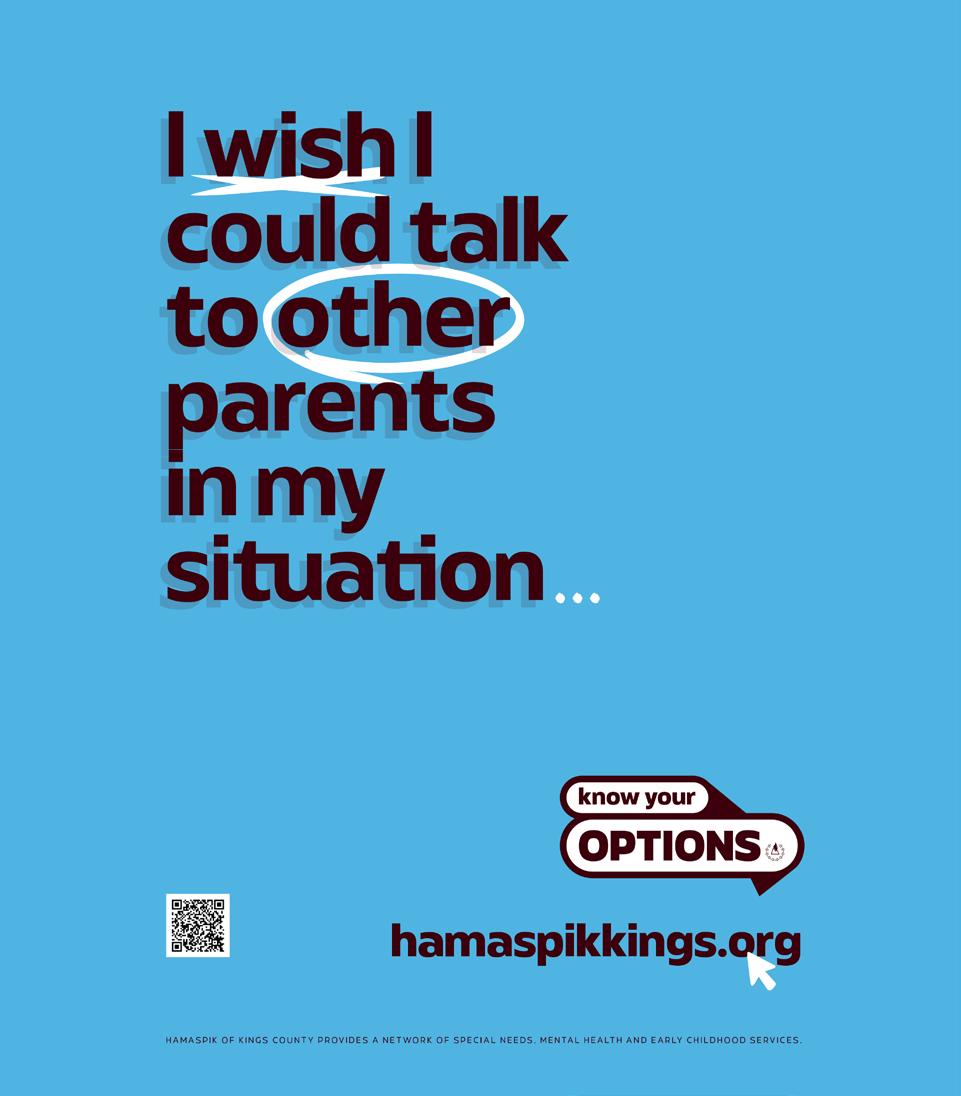


Following the worst floods in the country’s modern history, eastern Spain’s death toll rose to at least 218 people killed in the natural disaster. All the while, dozens more are missing, with rescue services working to save survivors and recover the dead.
Last Tuesday, some areas of the Valencia region saw a year’s worth of rain in the span of just eight hours.
The storms concentrated over the Magro and Turia river basins and, in the Poyo canal, produced walls of water that overflowed riverbanks, catching people unaware as they went on with their daily lives on Tuesday evening and early Wednesday.
In a matter of moments, the muddy water covered roads and railways, entering houses and businesses in towns on the outskirts of Valencia. Drivers had to take shelter on car roofs, while residents took refuge on higher ground.
Spain’s national weather service said that in the hard-hit locality of Chiva, it rained more in eight hours than it had in the preceding 20 months, calling the deluge “extraordinary.” Other areas on the southern outskirts of Valencia city didn’t get rain before they were wiped out by the wall of water that overflowed the drainage canals.
When authorities sent alerts to mobile phones warning of the seriousness of the flooding and asking people to stay at home, many were already on the road, working, or covered in water in low-lying areas or underground garages, which became death traps
On Thursday, rescue services recovered eight bodies from a flooded garage near the border of Valencia city, according to Mayor Maria Jose Catala. One of the bodies belonged to a local police officer. A woman, aged 45, was found dead at home in La Torre, the neighbor -
hood where the other five bodies were found.
Political opponents spoke out against the central Spanish government, alleging they failed to alert residents of the incoming floods in time for them to evacuate and have been taking too much time deploying rescue missions.
In the nearby town of Paiporta, 62 people perished, according to Mayor Maribel Albalat.
“We found a lot of elderly people inside their homes and people who went to get their cars. It was a trap,” she said, adding that locals were not informed in advance about the flooding.
Floods damaged around 50 miles worth of roads in eastern Spain, according to Oscar Puente, the country’s transport minister. Deserted cars, some of which had bodies inside, obstructed many other roads. Many bridges, rail tracks, and acres of farmland were also damaged.
At a local rescue coordination center, Pedro Sanchez, the prime minister of Spain, warned residents near Valencia to remain indoors because of the possibility of more bad weather.
“Right now, the most important thing is to safeguard as many lives as possible,” Sanchez declared.
Europe is no stranger to deadly floods. At least 185 people were killed by intense flooding in Germany in 2021. In 1970, floods killed 209 in Romania, and another 500 were killed in Portugal in 1967.

On Monday, Arvin Nathaniel Ghahremani, a 20-year-old Jewish man, was executed by the Islamic Republic of Iran.
Ghahremani, who lived in Iran, was arrested at the age of 18 on murder charges. He had been sentenced to death. Jewish communities around the world tried to intervene on his behalf to prevent his death. Sadly, he was executed at Kermanshah Central Prison.
Ghahremani was supposed to be







































killed in May. He had been charged over the death of Amir Shokri, an Iranian, who died after a fight between the two. Ghahremani had been ambushed outside a gym by Shokri and seven other men. Shokri had owed Ghahremani money. Ghahremani fought back to defend himself; Shokri eventually died. Ghahremani was sentenced to death by sharia law. Shokri’s family needed to forgive Ghahremani for the alleged killing in order to spare his life. Despite offers of huge sums of money, the family refused to forgive Ghahremani.
Earlier this year it was reported that Shokri’s family had come under pressure from a close aide to Ayatollah Ali Khamenei and the intelligence division of Iran’s Islamic Revolutionary Guard Corps to not accept the financial settlement, according to Ynet. The motive for the objection was reportedly Ghahremani’s Jewish ethnicity.
Advocates petitioned the court for a retrial but it was rejected.
Evo Morales was president of Bolivia from 2006 to 2019. He was declared the winner of the 2019 election but re -
signed weeks later amid nationwide protests over claims of election fraud. Now, 200 Bolivia soldiers are being held hostage by armed supporters of Morales.
On Friday, Bolivia’s military reported that the armed group had taken control of a military facility near the Bolivian city of Cochabamba, home to many supporters of Morales.

Bolivia’s foreign ministry said the group had “seized weapons and ammunition,” adding that three military units were “assaulted by irregular groups.”
Shortly after the facility was taken over by the group, the military announced the evacuation of personnel and their families.
Morales’ supporters have created blockades around the country for the past three weeks, demanding an end to investigations into Morales. The hostages are supposedly being held in ex-

change for authorities to stop interfering with the blockades.
Morales’ supporters had clashed with followers of his rival, current President Luis Arce, on several occasions earlier this year. Both men intend to run as candidates for the ruling Mas party in the country’s 2025 presidential elections.
On Sunday, Morales shared a video of his car supposedly being shot at, calling it an assassination attempt.

Brazil’s environmental agency levied $64 million in fines against 23 meatpacking companies and their suppliers for buying and selling cattle raised illegally on deforested land in the Amazon.
The operation, dubbed Cold Meat 2, launched just a few weeks ago. It tracked 18,000 head of cattle raised in 100 square miles of pasture that has been banned for commercial use due to illegal deforestation. The agents also apprehended 8,854 head of cattle found inside the restricted areas.
Cattle raising is the main driver of deforestation in the Brazilian Amazon, with 90% of the total area cleared between 1985 and 2023 converted to pasture – a total of 227,800 square miles.
“We are inspecting the production chain to hold offenders accountable for acquiring products from deforestation and to ensure that crime does not pay,” Jair Schmitt, chief of environmental protection at Brazil’s federal environmental agency, known as Ibama, said.
Among those fined was JBS, the world’s largest meat-packing company.
The JBS fine was $108,000 for purchasing 1,231 head of cattle, the fifth largest penalty among the fined companies.
The operation followed three months of investigation by Ibama’s intelligence unit and is the latest episode linking JBS to illegal deforestation. In December, it was revealed that JBS is facing lawsuits for allegedly purchasing cattle raised illegally in Jaci-Parana, a protected area in the Brazilian Amazon.
In a statement, JBS denied buying cattle from embargoed areas and said it had already submitted documents to Ibama demonstrating their legal origin.
Agropam, a meatpacker in Boca do Acre city, received the largest fine, $493,000, for buying 5,624 head of cattle from illegal areas. The company, which operates under the name of Frizam, sells beef only for Brazil’s internal market.
The other top companies targeted were Mafrico, Frigol and 163 Beef.

During the Soviet Union’s occupation of East Germany from 1949 to 1990, the German Democratic Republic (GDR), which had been ruling the region at the time, enslaved tens of thousands of political prisoners and jailed criminals. Many of these prisoners were forced to construct flatpack furniture for IKEA, a prominent furniture company. Some of the furniture was built as recently as the 1970s and 1980s.
Following reports of how the forced labor benefited IKEA, the company hired Ernst & Young, an independent auditor, to investigate the matter. The investigation found that IKEA did, in fact, benefit from cheap prison labor in communist Germany and that the company’s representatives probably knew about it at the time.
In response to the investigation, IKEA’s German branch, this past week, volunteered to give 6 million euros ($6.5 million) to a government fund to reimburse the prisoners coerced into forced labor. The fund is expected to be established in the weeks to come, after Germany’s parliament approves it.
The company’s decision came after years of talks between IKEA Germany and the Union of the Victims’ Associations of Communist Dictatorship (UOGK), an organization dedicated to compensating the victims of communist Germany.
“We deeply regret that products for IKEA were also produced by political

prisoners in the GDR. Since it became known, IKEA has consistently worked to clarify the situation,” said IKEA Germany’s CEO and Chief Sustainability Officer Walter Kadner. “We have given our word to those affected that we will participate in providing support. We therefore welcome the implementation of the hardship fund and are pleased to be able to keep our promise.”
IKEA’s move is unprecedented, as few companies have voluntarily compensated victims of forced labor. The decision was praised by UOGK’s chairman, Dieter Dombrowski, who called the move “groundbreaking.”
“After it became known that the company was involved in forced prison labor, IKEA accepted our invitation to talk. Together we have taken the path of enlightenment and IKEA has met those affected on an equal footing,” said Dombrowski. “We hope that other companies will follow IKEA’s example.”
Many other companies benefited from communist Germany’s forced prison labor. In 2012, Rainer Wagner, the former chairman of UOGK, called IKEA “just the tip of the iceberg” and urged other companies to pay former prisoners for the forced labor they benefited from.
“IKEA’s pledge to support the hardship fund is an expression of a responsible approach to dealing with dark chapters in the company’s own history,” said the GDR victims’ special representative in the German parliament. “We can’t undo what prisoners had to suffer in the GDR’s prisons, but we can treat them with respect today and support them.”
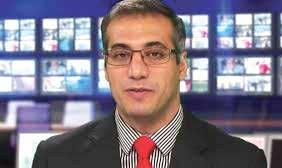
The State Department confirmed Sunday that it was looking into reports that an Iranian-American citizen had been arrested in Iran. The news comes amid renewed tensions between Iran, which has long used Western detainees for leverage, and the United States, Israel’s biggest ally, following Israeli air -
strikes on Iran last month.
“We are aware of reports that this dual U.S.-Iranian citizen has been arrested in Iran,” a State Department spokesperson wrote Sunday in an email in response to questions from The New York Times about Reza Valizadeh, an Iranian-American journalist who rights groups said last month had been arrested and was being held in a Tehran prison without access to a lawyer. The State Department did not respond to a follow-up email asking if Valizadeh was the dual citizen being detained.
The reports come amid increasingly heated rhetoric from Iranian leaders in the past few days, after the country’s leadership initially tried to minimize the effectiveness of the Israeli strikes on Iranian air-defense systems last month. On Saturday, Ayatollah Ali Khamenei, Iran’s supreme leader, threatened a “crushing response” to Israel and the United States.
Rights groups said last month that Valizadeh was arrested around September and was being detained in Evin Prison, one of Iran’s most notorious detention centers.
Valizadeh once worked for Radio Farda, a Persian-language outlet that is part of Radio Free Europe/Radio Lib -
erty, which is funded by the U.S. government. He left the organization in November 2022, RFE/RL said in a text message to the Times on Sunday.
“We have had no official confirmation of the charges against him,” said the media organization, which confirmed his detention.
Iran’s foreign ministry, its permanent mission to the United Nations in New York, and its permanent mission to the U.N. in Geneva did not respond to requests for comment Sunday. (© The New York Times)

Gerardo Werthein, a Jewish veterinarian, was named Argentina’s foreign minister by President Javier Milei this week..



Werthein replaced Diana Mondino, whom Milei dismissed after Argentina voted in the United Nations to condemn the U.S. embargo on Cuba. The United States and Israel — which Milei, elected last year, has defined as Argentina’s main allies, in a shift for Argentina — were the only two votes opposing the non-binding resolution.
Werthein had been Milei’s ambassador to the United States, one of two
Jewish ambassadors that Milei appointed. The other is Axel Wahnish, an Orthodox rabbi who represents Argentina in Israel.
Werthein will lead a “transformation in our country’s foreign policy,” according to a statement from Milei’s office.
Milei has been a vocal supporter of Israel, in contrast to his predecessor, who was a sharp critic of the Jewish
Argentina has defined Hamas as a terrorist group and has formally named Hezbollah as the perpetrators of two deadly attacks on Jewish targets in Buenos Aires in the 1990s. Last week, Security Minister Patricia Bullrich disclosed the identity of the Hezbollah chief in Latin America, Hussein Ahmad Karaki. She said he participated in the terrorist attacks in Buenos Aires and continues to lead Hezbollah’s operations in the region, likely from Lebanon. She said she would seek his prosecution.
Werthein, whose only direct diplomatic experience includes his short stint as ambassador, is expected to draw on his years in international sports collaboration and his role in the family business.
That business started in 1904 when an ancestor, an immigrant from Bessarabia in what was then Russia, founded a country store in the agricultural La Pampa province called “The Hebrew.” Today, the Werthein Group has interests in agriculture and livestock, retail, telecommunications, real estate, financial services, wineries and energy. Gerardo Werthein left the company in 2019.
Werthein traveled to New York with Milei a year ago to visit the gravesite of the Lubavitcher Rebbe in Queens.
“It was a special, symbolic and pretty moment,” he said about his visit to the gravesite at the time.
The U.S. ambassador to Argentina, Marc Stanley, is also Jewish and active in the local Jewish community in Buenos Aires.
State. Similarly, many of his counterparts in Latin America are pro-Palestinian. The leaders of neighboring Brazil and Chile have condemned Israel for its military response to Hamas’s October 7, 2023 attack, as has Colombia’s Gustavo Petro. Milei, in contrast, has offered full-throated support for Israel’s military campaign in Gaza and visited Israel in February on his first international trip as president.

Mohsen Fakhrizadeh was killed when his car was ambushed on a highway outside Tehran in November 2020. Iran blamed the assassination of one of its top nuclear scientists on Israel. This week, Iran announced that it had sentenced to death three people who it accuses of being involved in the assassination.

Commenting on the death sentences related to Fakhrizadeh’s assassination, judiciary spokesman Asghar Jahangir said that the Revolutionary Court in northeast Iran’s Urmia had sentenced the three suspects to death “in the initial stage, and the case is currently in the appeal stage.”
He added, “After some investigations, three people out of eight arrested in West Azerbaijan province were accused of committing espionage for the occupying regime of Israel.”
He said that the three are also “accused of transporting equipment into Iran for the assassination of martyr Fakhrizadeh under the guise of smuggling alcoholic beverages.”
In December 2022, then-judiciary spokesman Massoud Setayeshi said nine people had been charged with the capital offense of “corruption on earth” for their suspected collusion with Israel in the assassination.
Fakhrizadeh had been under U.S. sanctions for his role in Iran’s nuclear program when he was killed. In 2018, Israel accused him of leading Iran’s efforts to develop an atomic bomb, which Iran has denied.
Separately, Iran’s judiciary said that Iranian-German national Jamshid
Sharmahd died before his execution, which was announced by Tehran late last month. His death sentence in 2023 for “terrorist attacks” had set off a diplomatic rift between Iran and Germany.
Islamic Republic authorities said Sharmahd, also called Jimmy, had headed a pro-monarchist group accused of a deadly 2008 bombing and planning other attacks in the country.
Sharmahd’s death exacerbated a diplomatic rift between Tehran and Berlin, with the latter closing Iranian consulates across Germany.
German Foreign Minister Annalena Baerbock accused Iran of playing politics with hostages and of trying to use Germany’s support for Israel in the widening Middle East conflict to justify Sharmahd’s killing.
Defense Minister Yoav Gallant from his position. The premier cited a “crisis of trust” that “gradually deepened.”
Israel Katz will replace Gallant as defense minister. United Right Chairman MK Gideon Sa’ar, who joined the coalition in late September as a Minister-without-portfolio, will replace Katz as Foreign Minister.

“My supreme commitment as Prime Minister of Israel is to safeguard Israel’s security and lead us to an absolute victory,” Netanyahu said in a video statement to the nation.
In a stunning move on Tuesday evening, Prime Minister Benjamin Netanyahu announced the dismissal of

“In the midst of a war, more than ever, there needs to be full trust between the Prime Minister and the Defense Minister. Unfortunately, although in the first few months of the campaign there was such trust and very fruitful work, over the last few months, this trust has cracked between myself and the Defense Minister.
“Significant gaps have emerged between myself and Gallant in the management of the campaign, and these gaps have been accompanied by statements and actions that contradict the government’s decisions and the decisions of the Cabinet. I made many attempts to bridge these gaps, but they widened. They also reached the public in an unacceptable way, and worse, they reached the enemy – our enemies took satisfaction from this and derived a lot of benefit from it,” Netanyahu said.
Gallant wrote on X, “The security of the State of Israel was and will always remain my life’s mission.”
Gallant’s firing will come into effect in 48 hours. The appointment of Katz and Saar requires the approval of the government and then of the Knesset.
Netanyahu lauded Katz, “Katz has proven his capability and dedication to national security, as both foreign minister, finance minister, and intelligence minister for five years, as well as a longstanding member of the Security Cabinet. He brings an impressive combination of experience and practical skill, known as a ‘bulldozer’ with a quiet strength and responsible determination—all essential qualities in the campaign’s leadership.”
Netanyahu noted that Sa’ar’s “long experience as a member of the government and cabinet gives him valuable insights in both policy and security matters, and he will add great strength to our leadership.”
The prime minister first announced that he would fire Gallant after the latter warned in March 2023 that the government’s judicial reforms were endangering national security. Hundreds of thousands of Israelis took to the streets in protest in what became known as “the Night of Gallant,” and Netanyahu backtracked from his decision.
The prime minister and defense minister’s relationship deteriorated since the outbreak of war on October 7. Gallant publicly accused Netanyahu of involving political considerations in his decision-making, while Netanyahu accused Gallant of attempting to topple the government from within.

On Sunday, an Israeli court named Eli Feldstein as one of the people associated with the Prime Minister’s Office who allegedly illegally leaked classified information to shoot down hostage deals. Three other suspects have yet to be named due to a court gag order.
“The investigation began after significant suspicions arose in the Shin Bet and IDF — including as a result of media publications — that secret and sensitive intelligence information was taken from the IDF and removed illegally, sparking concerns of serious harm to national security and a danger to the sources of the information,” the Rishon Lezion Magistrate’s Court said. “As a result, damage could have been done to the ability of defense bodies to achieve the goal of freeing the hostages [held in Gaza].”
Although Netanyahu said that no individuals suspected or charged in the case worked for his office, Feldstein played a role in the Prime Minister’s Office. The spokesperson didn’t work directly with Netanyahu (because he failed a polygraph test), but rather, with


the premier’s director-general. Feldstein was thus in close contact with the prime minister but didn’t have high security clearance.
Two documents were supposedly leaked to the press. The first, a document that noted that Hamas prolonged hostage talks as an act of psychological warfare against Israel and to regain its military capabilities was seemingly handed to Bild , a German newspaper,
which wrote an article on the leak. Another document, suggesting that the now-deceased Hamas leader, Yahya Sinwar, was plotting to smuggle the hostages into Egypt and Iran, inspired the Jewish Chronicle to write a now-redacted article. These leaks were allegedly meant to sabotage hostage deals by turning the Israeli public against any agreements with Hamas.
Although both ideas were most-
According to Ynet, officials have four problems with the situation: top-secret documents were leaked; advisors without proper security clearance were allowed in meetings and off-limit areas; classified documents were handled sloppily; and documents were used to change the public’s thoughts regarding a hostage agreement.
Netanyahu’s office maintained on Saturday that Feldstein “never participated in security discussions, was not exposed to or received classified information, and did not take part in secret visits.”
It added, “The published document never came to the Prime Minister’s Office from the IDF Military Intelligence Directorate, and the prime minister learned about it from the media.”
Of the Bild article, which asserted that Hamas seeks a ceasefire deal solely to restore its military power, the PMO said it was “ridiculous” to say such a piece “caused any damage to the negotiations for the release of the hostages or to the security of Israel.”
Netanyahu’s political opponents, including Opposition Leader Yair Lapid and National Unity party leader Benny Gantz, slammed Netanyahu for his alleged connection with the leaks.

ly dismissed by the Israeli media, the leaks mirror thoughts expressed by Netanyahu during meetings held around the times when the two articles were published.
Feldstein, a 32-year-old Israeli who grew up in a charedi family in Bnei Brak, was detained on October 27 in an early-morning raid. Police arrested three others. The suspects may reportedly be imprisoned for up to fifteen years.
On Thursday, Israeli officials charged Rafael and Lala Guliyev, a couple in their thirties who live in Lod, with spying for Iran. Later that day, prosecutors announced that, last week, they indicted a man from Bnei Brak, Asher Binyamin Weiss, on suspicion of carrying out tasks for Iran, including surveilling an Israeli nuclear scientist whom the Islamic Republic planned to assassinate.
According to the Shin Bet and Israel Police, Elshan Agyeiv, a 56-year-old Israeli of Azerbaijani origin, recruited the Guliyev couple. The husband was tasked with surveilling Israeli security sites, including the Mossad’s headquarters and stalking one of the Institute




for National Security Studies’ (INSS) female academics, whom Iran sought to target. He was also supposed to help find an assassin for Iran. The man’s wife frequently helped him out.
For each day that Rafael Guliyev stalked the INSS academic, he was paid $600. In all, Iran allegedly gave the couple $26,000. As part of the man’s role, he photographed and videoed the woman’s home and car for hours, the indictment claims.
The husband and wife also allegedly took pictures and videos of Tel Aviv’s Moldovan consulate, Israel Electric Corporation sites, the Haifa Port, an Hadera water pumping state, public bomb shelters in Tel Aviv, and the graves of October 7 victims. Additionally, they purportedly took photos near Tel Aviv’s Kirya military base of posters of the hostages who were kidnapped on October 7 and remain in Gaza.
Guliyev communicated with the Iranians via the Telegram app. His contacts urged him to buy a dedicated phone, high-quality cameras, and a laptop with encrypted software.
Weiss allegedly filmed a nuclear scientist’s house and car using a GoPro camera. He then sent the video to a young man in East Jerusalem who had been hired to assassinate the scientist. Last month, Israeli officials arrested seven residents of East Jerusalem who were allegedly involved in the plot.
Additionally, Weiss purportedly set cars ablaze, sprayed graffiti, and posted hundreds of posters in Tel Aviv and Ramat Gan urging the public to revolt against the government. Iranian officials paid him thousands of dollars worth of cryptocurrency, in return for which he sent them photo evidence of his crimes.
Many others have been charged with working on behalf of Iran. Seven young adult men from East Jerusalem’s Beit Safafa were also hired by Iran to assassinate an Israeli nuclear scientist and a mayor in a large central Israeli city, vandalize parts of Jerusalem, take pictures of different sites, and spray graffiti.
Twenty-year-old Rami Alian, who was one of the detained boys from Beit Safafa, was told to throw a hand grenade at a security serviceman, but he didn’t end up following through. His Iranian contacts offered to pay him $53,000 if he successfully killed a particular Israeli nuclear scientist.
The investigation shows “once again the efforts of the Iranian intelligence agencies to recruit and exploit Israeli
citizens in order to promote espionage and terrorist activity in Israel,” said a Shin Bet official.

On Thursday, Rabbi David Lau was succeeded by Rabbi Kalman Ber as Israel’s Ashkenazi chief rabbi, following a 77-58 vote which saw Rabbi Ber defeating Rabbi Micha Halevi, the chief rabbi of Petah Tikva.
Two months prior, Rabbi Ber and Rabbi Halevi tied with 40 votes each, thus prompting Gali Baharav-Miara, the attorney general, to call a runoff election.
In July, Rabbi Lau and his Sephardi counterpart, Rabbi Yitzchak Yosef, stepped down from their positions, as their ten-year terms had ended. Their positions had been vacant until recently. Last month, Rabbi Yosef was succeeded as chief Sephardi rabbi by his brother Rabbi David Yosef.
The Ashkenazi and Sephardi chief rabbis have several responsibilities, including organizing Israel’s kashrus system and rabbinical courts, which are authorized to rule on matters such as marriage, divorce, and burials.
While Rabbi Halevi was backed by the Religious Zionism party of Bezalel Smotrich, and Shas, Aryeh Deri’s charedi Sephardic party, Rabbi Ber was supported by the United Torah Judaism party. Some backed Rabbi Halevi because Rabbi Ber didn’t portray himself as an explicitly religious Zionist candidate.
Rabbi Ber’s win was “an important development for Jewish heritage,” said UTJ lawmaker and Jerusalem Affairs and Jewish Heritage Minister Meir Porush, adding that Rabbi Ber would “undoubtedly succeed in uniting all of Israel in this difficult time” due to his diverse appeal.
The vote was postponed several times by the Knesset due to concerns about municipal voting. During one Supreme Court ruling, the court ordered the Chief Rabbinate Council to “consid-


Al-Akhbar, a Hezbollah-affiliated news publication, reported on Sunday that, during an Israeli naval raid in northern Lebanon on Friday, Israel’s Shayetet 13 naval commando unit impersonated Lebanese security forces before capturing a Hezbollah terrorist named Imad Amhaz. The paper claims that Israel’s raid in Batroun was only four minutes long and involved twenty terrorists and a number of unnamed civilians.
According to the IDF, Israeli forces brought Ahmaz to Israel in order to be interrogated by the Military Intelligence Directorate’s Unit 504, which focuses on HUMINT (human intelligence) regarding the terror group’s naval operations. Al-Akhbar said that Ahmaz is not a “significant source of knowledge” in Hezbollah’s navy.
During the same report, the terror-affiliated publication claimed that the Germany Navy, working as part of UNIFIL, the U.N.’s peacekeeping forces, helped Israel carry out the naval attack. The peacekeeping force rejected such reports, noting that it “has no involvement in facilitating any kidnapping or any other violation of Lebanese sovereignty.”
Fighting between Israel and Hezbollah started on October 8, 2023, a day after Hamas unleashed its unspeakable October 7 massacre. To avoid a similar attack on the northern border, the Jewish state evacuated those who live near Lebanon. Those 60,000 citizens have yet to return home.
In September, Israel wiped out most of Hezbollah’s leadership and weakened the group. A month later, the Jewish state launched a ground campaign into southern Lebanon in an operation meant to ensure that those living by the border can return home without fearing for their lives.

It was a beautiful, sunny fall day on Sunday when thousands of runners took to the streets of New York to run the NYC Marathon.
Abdi Nageeye, 35, a Somali-Dutch man, won the marathon with a time of 2:07:39, edging out second place winner Evan Chebet.
Sheila Chepkirui defeated reigning women’s champion Hellen Obiri by clinching the women’s title with a time of 2:24:35. Chepkirui hails from Kenya.
Three American men placed in the Top 10 of the race: Connor Mantz, Clayton Young, and CJ Albertson. The top American woman finisher was Sara Vaughn, who was followed by Jessica McClain and Kellyn Taylor.
The 26.2-mile race began with more than 50,000 runners crossing the Verrazano Narrows Bridge, which links the borough of Staten Island to Brooklyn’s Fort Hamilton neighborhood. Runners then passed through the scenic Sunset Park and Park Slope neighborhoods before crossing the Pulaski bridge from Williamsburg into Queens.
Runners continued through the Long Island City neighborhood of Queens until crossing the Queensboro Bridge over Roosevelt Island to Manhattan.
The race followed First Avenue north on the Upper East Side, through East Harlem and over yet another bridge into the Bronx before passing back into Manhattan via the Madison Avenue Bridge. Runners then darted down Fifth Avenue along the eastern boundary of Central Park before turning into the park and reaching the finish line.
More than a million spectators lined the streets of New York to cheer on the more than 50,000 runners during the 26.2-mile race.

On Monday, Boeing workers voted to accept the company’s most recent offer, ending the strike that began on September 13. It was the costliest strike in the United States in more than 25 years.
The International Association of Machinists (IAM) said rank-and-file members voted by 59% to approve the deal.
“I’m proud of our members. It is a win,” said Jon Holden, president of the largest IAM local at Boeing and the union’s chief negotiator. “They achieved a lot, and we’re ready to move forward.”
“While the past few months have been difficult for all of us, we are all part of the same team,” Boeing CEO Kelly Ortberg said in a statement. “We will only move forward by listening and working together. There is much work ahead to return to the excellence that made Boeing an iconic company.”
The 33,000 union workers who had been on strike are set to go back to work on Wednesday.
The deal calls for an immediate raise of 13% and raises of 9% for each of the next two years, and then another 7% in the fourth and final year of the contract. Taken together, members will receive a pay raise that exceeds 43%.
Workers also get a ratification bonus of $12,000, part of which they can contribute to 401(k) retirement accounts. The deal did not restore the traditional pension plan they lost in 2014 from their previous labor deal, a stipulation that had seen workers reject Boeing’s previous two offers.
Companies, both unionized and nonunion, have generally moved away from a traditional pension plan, known as defined benefit plans, in recent decades. Such plans generally pay retirees a set amount every month no matter how long they live or how well pension fund assets perform.
Union leadership had urged members to accept the latest offer, even though it was not significantly different from the one they rejected on October
23 . The union had urged members “to lock in these gains and confidently declare victory” and warned members that another rejection could “risk a regressive or lesser offer in the future.”
The strikers have lost more than $600 million in combined wages but the cost to Boeing has been significantly greater, according to estimates from Anderson Economic Group, a Michigan-based research firm, which puts Boeing’s losses through the end of last week at $6.5 billion. Overall, the cost to the U.S. economy has topped $11.5 billion.
Those losses come on top of the nearly $40 billion in core operating losses that Boeing has reported since two fatal crashes led to a 20-month grounding of its best-selling jet, the 737 Max, in 2019 and 2020.
Despite its problems, Boeing is still a major contributor to the U.S. economy, as it is the largest American exporter.

Bernard Marcus, cofounder of The Home Depot, died this week at the age of 95. Marcus had been a major supporter of Republican causes and a vocal advocate for former President Donald Trump.
“The entire Home Depot family is deeply saddened by the death of our cofounder Bernie Marcus,” The Home Depot said in a statement. “We owe an immeasurable debt of gratitude to Bernie.”
Marcus, who had a net worth of about $7.4 billion, according to Bloomberg’s Billionaire Index, earned his fortune from establishing The Home Depot with Arthur Blank in 1978. The two of them grew the hardware store into a retail behemoth that now has 2,300 stores and a stock market valuation of nearly $400 billion.
Marcus was born in Newark, New Jersey, to Russian Jewish immigrants. He was the youngest of four siblings. Marcus earned his degree in merchandising and marketing at Rutgers University and went into the retailing industry working for various chains.

He met Blank when they worked at Handy Dan Home Improvement, a chain in California. They both were fired after new management came in, so the two of them hatched a plan to start a new chain that was bigger than traditional hardware stores with better-trained staff. Thus, The Home Depot was born.
Marcus was The Home Depot’s CEO until 1997 and served as the company’s chairman until his retirement in 2002.
Marcus has also donated to several charities, Jewish and medical organizations, in addition to a $250 million grant that helped opened the famous Georgia Aquarium in 2005.
An outspoken Republican, Marcus donated millions of dollars to the campaigns of right-wing politicians, including the late John McCain, current Florida governor Ron DeSantis, and Trump.
Later in his life, he frequently made appearances on right-wing television shows on Fox News and Fox Business, often talking about his support of Trump’s presidential aspirations. Some Trump opponents attempted to launch a boycott of The Home Depot in 2016 and in 2019 because of Marcus’ support of the Republican nominee for president.
Marcus also said in 2022 in an in-
terview with the Financial Times that he was “worried about capitalism” and that because of what he called the spread of “socialism” in America “nobody works. Nobody gives a [darn].
‘Just give it to me. Send me money. I don’t want to work — I’m too lazy, I’m too fat, I’m too stupid.’”
He added, “We used to have free speech here. We don’t have it. The woke people have taken over the world. You know, I imagine today they can’t attack me. I’m 93. Who gives a [care] about Bernie Marcus?”

Almost the entire United States faced drought conditions during the last week of October.

Only Alaska and Kentucky did not have at least moderate drought conditions, according to the U.S. Drought Monitor system.
The past four months were consistently warmer than normal over a wide swath of the country, said Rich Tinker, a drought specialist with the National Weather Service. But in June, while roughly a quarter of the country was dry to some degree, he said, now 87% of the nation is.
“Drought in many parts of the country and the world is becoming more frequent, longer and more severe,” said Erica Fleishman, director of the Oregon Climate Change Research Institute and a professor at Oregon State University.
Dry conditions over the past few months led New York City on Saturday to urge residents to start conserving “every drop possible.”
Last month was the driest October since record keeping began in 1869, according to the city, which issued a drought watch for the 9.8 million people who rely on the city’s water supply. A watch encourages voluntary water conservation and ensures city agencies are ready with water conservation plans. The last time a watch was issued was in 2001.
Rohit Aggarwala, the city’s chief climate officer and commissioner of the Department of Environmental Protection, noted that the problem is one of quantity, not quality. The city’s upstate reservoirs are below two-thirds full, and they are normally more than three-quarters full in the fall. But, he said, the water is completely safe to drink.
Even after Hurricane Helene dropped huge amounts of destructive rain across the Southeast, the region is experiencing drought. Not much rain has fallen since the storm, and warmer temperatures mean higher evaporation rates and drier soils.
Drought doesn’t just come from a lack of precipitation like rain or snow. Drought conditions are driven by abnormally high temperatures that can quickly suck moisture from the atmosphere and the ground.
Even if the total amount of precipitation stays the same or increases a bit, drought can occur. That is especially true as rain events get more episodic, with heavier deluges over a smaller number of events. When all the water comes at once, it’s more difficult for soil to soak it up or for water storage to contain it. (© The New York Times)

Want to cross the street against the light in the Big Apple? Be my guest. Jaywalking is now officially legal in New York.
Still, authorities caution that people need to be careful and look both ways while crossing the street.
In September, the City Council passed legislation allowing pedestrians to cross the street at any time without adhering to traffic signals. Over the weekend, the bill became law after Mayor Eric Adams neither signed nor vetoed the bill within a 30-day window.
Jaywalking had been illegal in New York from 1958 and carried a fine of up to $250.
At least 200 people over the past five years have died while crossing the street in the middle of the block or against traffic signals, accounting for around 34% of all pedestrian fatalities, according to the New York City Department of Transportation
Supporters of the bill, including one of the sponsors, Council Member Mercedes Narcisse, said that the jaywalking law was racist.
“In 2023, over 92% of jaywalking citations went to Black and Latino New Yorkers,” she said in a statement.
Now that the law has been approved, Narcisse believes that officers can focus on real community concerns.
“Police officers have shared with me that they prefer to focus on true public safety efforts, not issuing tickets for crossing the street.”
The law allowing jaywalking officially goes into effect in February, but it does not eliminate the risks associated with the longstanding practice. Last year, 62.2 million people visited New York City. They had better be on their guard while crossing the busy city streets.


Last week, Los Angeles County sued PepsiCo and Coca-Cola for allegedly lying about their products’ recyclability and hiding the extent to which their plastic bottles have purportedly damaged the environment and consumers’ health.
“Coke and Pepsi need to stop the deception and take responsibility for the plastic pollution problems your products are causing,” stated Lindsey Horvath, the LA County supervisor. “Los Angeles County will continue to address the serious environmental impacts caused by companies engaging in misleading and unfair business practices.”
According to Break Free from Plas -
tic, a global environmental group, PepsiCo, which also owns Gatorade, Mountain Dew, and Aquafina, produces around 2.5 million metric tons of plastic a year, while Coca-Cola, which owns Dasani, Fanta, Sprite, Vitamin Water, and Smartwater, produces 3.224 million metric tons of plastic, annually.
Over the past five years, both companies have been considered the world’s top plastic polluters, with Coca-Cola taking the number one spot, according to Break Free from Plastic.
Last November, environmental groups and a European Union consumer protection group filed a similar suit against Coca-Cola, Nestle, and Danone, with the plaintiffs alleging that the companies have deceived the public into believing that the plastic in their products are completely recycled or recyclable.
That same month, New York State filed a lawsuit against PepsiCo for allegedly contributing to the plastic waste in the Buffalo River. On Thursday, a judge dismissed the case, noting that the company didn’t fail to warn the public and that Pepsi shouldn’t be punished because other people decide to litter the company’s bottles.
LA County’s suit accuses the two

companies of engaging in “disinformation campaigns” and falsely promoting the reality of a “circular economy,” wherein plastic bottles can be infinitely recycled and reused, thus leading customers to buy plastic that can only be used once but is marketed as environmentally friendly and recyclable.
The American Beverage Association, which represents Coca-Cola and PepsiCo, dismissed the allegations as “simply not true.” The company’s spokesman, William Dermody, added that the packaging is and can be recycled, noting California’s 71% bottle recycling rate in 2023.
Another concern is with microplastics, which, when consumed, could potentially cause heart disease, Alzheimer’s and dementia, or other conditions, according to some research.
The suit asks that the court stop the companies’ “unfair and deceptive business practices” and force them to compensate consumers up to $2,500 for each violation.

The Transportation Department now requires airlines to provide quick, automatic refunds to passengers whose flights are canceled or majorly delayed. The rule, which was introduced in April, was put into law on October 28.
Passengers who opt not to fly after their flights are seriously delayed – three hours for domestic flights, six hours for international flights – must be refunded in the same way that the customer originally paid (e.g. by cash, credit card, or miles). Flights purchased by credit card must be refunded within seven days, while flights purchased through other means must be refunded within twenty days.
“Passengers deserve to get their money back when an airline owes them — without headaches or haggling,” said Pete Buttigieg, the Secretary of Transportation.
Until now, airlines generally had their own definitions for “major delays” and usually don’t give quick or automatic refunds, often requiring customers to jump through hoops, including long phone calls and paperwork, to get their money back.
Additionally, passengers may be eligible for refunds in the following scenarios: they arrive or depart from a different airport than the one they booked; a person with disabilities’ flight is connected to a less accessible airport or flight; or more connections are added than originally scheduled. Additionally, Wi-Fi and seat selection fees must be refunded if the customer doesn’t end up receiving the services.
Passengers can file a mishandled baggage report and receive a refund for their checked luggage fees if their luggage is missing for over 12 hours for a domestic flight or 15 hours for an international flight.

Prosecutors and defense lawyers agreed on a couple of points as they opened a closely watched trial in Manhattan on Friday: Jordan Neely, a 30-year-old homeless man, had been menacing passengers in a subway car. And Daniel Penny, a former Marine, put him in a chokehold to subdue him.
On whether Penny was guilty of manslaughter after Neely died, they very much disagreed.
Prosecutors with the Manhattan district attorney’s office argued that Penny’s actions during the altercation, on May 1, 2023, became “unnecessarily reckless” and criminal when he refused to let go of Neely long after he had gone limp, after the train doors had opened, and after passengers were able to leave the subway car.
As a former Marine with a green belt in martial arts, Penny should have known when his chokehold had become deadly, prosecutors said.
Penny’s legal team told the jury he

had stepped in to protect his fellow riders and that he did not squeeze Neely’s neck hard enough to kill him.
Penny, 26, is charged with manslaughter and criminally negligent homicide. He told detectives at the time that he had stepped in to restrain Neely, who had a history of mental illness, after he started threatening passengers on the train.
The case centers on what happened as an F train traveled between stations and in the minutes after it stopped at the Broadway-Lafayette Street station that day.
In the weeks after video of Penny, who is white, choking Neely, who was Black, reverberated across the internet, New Yorkers became divided. For some, it was a criminal act that highlighted the city’s failure to address mental illness and homelessness. Others saw Penny’s actions as the manifestation of transit riders’ fears and frustrations.
At the hearing, lawyers on both sides started laying out their cases to the 12 jurors and four alternates who will spend the next several weeks listening to witnesses and experts. The trial is expected to last through Thanksgiving. (© The New York Times)

According to Texan officials, over 200 people cheated on the state’s teacher certification exam, paying a professional test-taker to take it for them.
The scam was allegedly orchestrated by Booker T. Washington High School’s veteran teacher and head basketball coach Vincent Grayson. The state has accused the school’s assistant principal, Nicholas Newton, of working as the test-taker, getting passing grades for hundreds of people.
“The most important thing to me is the ringleaders have been identified and are being rooted out of our home school district … and the fact that they held

positions of power there, where they were held in esteem by the children, is the very worst part of this crime,” said Kim Ogg, the Harris County District Attorney. “They didn’t deserve those kids’ respect, and I think it leaves children feeling betrayed, not knowing who to trust.”
“The extent of the scheme will never be fully known, but we know that at least 400 tests were taken and at least 200 teachers falsely certified,” Ogg added.
The assistant principal of Jack Yates Senior High School, LaShonda Roberts, was also arrested for purportedly working as the scheme’s “recruiter and referral agent who brought in many individuals who sought the services of the impersonator test taker.” Two test proctors, Darian Nikole Wilhite and Tywana Gilford Mason, were also charged. Yates and Booker T. Washington were the first two historically Black high schools established in Houston, Texas.
All five defendants have been charged with two counts of engaging in organized criminal activity: money laundering and tampering with a government document based on false statements issued during tests.
Grayson, the ringleader of the cheating scheme, worked at Booker T. Washington for almost twenty years. According to prosecutors, he charged $2,500 to people who wanted an imposter to take the test for them. Around 20% of the payment was given to the proctors. In all, Grayson is said to have made over $1 million from the scam. The scheme started in May 2020, if not earlier.
The scheme worked as follows: the individual that wanted the certification would come to the testing center and sign in before immediately leaving.
“A few minutes later, Nicholas Newton, the proxy tester, would sit in their seat, take and pass the test,” said Mike Levine, the county’s public corruption division’s felony chief prosecutor. In fact, there were occasions when Newton would take several tests simultaneously.
The Texas Education Agency began catching wind of the scheme in 2023 when the agency “became aware of certain irregularities” at a particular testing center in Houston, said Levine. Officials saw that, in droves, teachers who had failed the certification test in one part of Texas would suddenly drive hours away to Houston, where they would easily pass “with flying colors.”
“Often these people had previously failed one or more attempts at the certification exam. They then drove
sometimes four or more hours to the Houston area and suddenly they were passing the test,” said Levine.
“The fraudulently certified teachers run the gamut,” Levine said. “They’re not just in the Houston area. They’re not just in the Dallas area. They are literally littered throughout the state.”

The New York Times Tech Guild went on strike at midnight on Monday, just one day before the 2024 presidential election. The walk-out was sparked when the Times failed to reach an agreement with the union over several issues.
“We love our jobs and we’re looking forward to being able to do them,” said Kait Hoehne, a senior software engineer at the Times and a Tech Guild member, “but we haven’t seen enough movement from management and we’ve been bargaining for far too long.… The ball is in their court.”
“While we respect the union’s right to engage in protected actions, we’re disappointed that colleagues would strike at this time, which is both unnecessary and at odds with our mission,” Danielle Rhoades Ha, a spokesperson for the Time s, said of the strike.
Around 600 software engineers, product managers, data analysts, and designers are members of the Tech Guild. The Times is highly dependent on its programmers, who ensure that the paper’s app and website function normally.
The union’s timing is intentional. On election day, the Times ’ website will be flooded with users, putting “stress on the system,” noted Hoehne. The website will likely not be able to function without experts on call to manage the “infrastructural ripples in the pond that come from the extra traffic … teams can be impacted in a big way,” she added.
Since 2022, the Tech Guild, which is part of New York’s NewsGuild, has been negotiating with the Times regarding its first contract. The union and the paper have, however, failed to agree on

three issues: “just cause” protections for employees, making it that the company can’t fire a worker without reason and due process; remote work and the Times ’ insistence that tech workers return to the office; and pay equity.
Although the Times has agreed in principle to some of the guild’s demands, the newspaper has insisted on adding clauses that the union won’t agree to.
Each day, the Tech Guild will be striking in front of the Times ’ office in Times Square from 9 a.m. to 6 p.m. The guild asks that users boycott the Times ’ games and cooking apps for the time being in solidarity with the strike.
Before the strike started, 750 Times journalists signed a petition, begging publisher A.G. Sulzberger, CEO Meredith Kopit Levien, and executive editor Joseph Kahn to make sure a deal is reached before the election.
“We can’t do our jobs without the Tech Guild,” the journalists wrote. “Can you imagine if our election needle didn’t work, the app didn’t open or the homepage went down?”
According to Rhoades Ha, the Times has “robust plans in place to ensure that we are able to fulfill our mission and serve our readers” even in the absence of the Tech Guild. However, the spokesperson did not explain further, and Times employees have not been informed of the plans.
“I see it as: If the company really valued the work that our tech workers do, and valued their contributions, then they would never have let it get to this point,” said business reporter and Guild steward Jenny Vrentas, voicing her frustration that the Times failed to address the disagreement, thus jeopardizing the paper’s election day coverage.

Don’t take for granted the air you breathe – it could be worth lots of money.
In Lake Como, air is expensive. Sealed cans of “Lake Como Air” are being sold at a bookshop and a restaurant on the Italian lake, as well as in Menaggio and Lenno, two other popular destinations at the holiday hotspot.
The canned air have been on sale since early October.
Davide Abagnale is a consultant for Italy Comunica, the marketing company that dreamt up the cans.
“We wanted to create a reminder that people can easily take home in their suitcases,” Abagnale, 36, said. “When the can is opened, it obviously loses its charm a bit.”
The cans are made in the Netherlands and sealed in Como.
Last year, a record 5.6 million tourists came to the area to view the beautiful scenery and enjoy the idyllic towns.
While the cans are currently sold only in Como, Abagnale said this could

be extended online in the future.
Sounds like a bunch of hot air.

What has two heads and is slow on the take? A turtle with two heads, of course.
Joseph Morena, of New Jersey, has been taking care of a two-headed turtle for the past few months. His friend had hatched the interesting creature and had no idea how to care for it.
Morena happily took the reptile, who has been surviving despite the odds under his care.
“I am going to do whatever it takes to keep these guys happy and alive,” Morena pledged.
“Obviously I had to take him,” he said, explaining that raising the unique creature was difficult given the low birth and survival rates of multi-noggined critters.
To have multiple heads, also known as polycephaly, is generally caused by malformation of a developing embryo, due to either genetic or environmental factors. Two heads are not better than one in the animal kingdom as the dueling noodles often compete for resources
Indeed, Morena’s two-for-one turtle was double the trouble with two mouths that refused to eat.
“I continued to offer food, but they showed no interest. I began to get really worried,” he recalled.
Finally, the larger of the two heads began to eat, and slowly, the smaller head decided it wanted to nosh too.
Still, Morena is concerned for his pet. One morning, he awoke to find the turtle on its back, unresponsive.
“I was almost certain they had passed,” he recounted and said he frantically performed gentle chest compressions and mouth-to-mouth.
Moreno breathed a sigh of relief when they recovered almost two hours later.
“Somehow, they managed to almost drown in half an inch of water,” he said.
The turtle is now eight weeks old
and hopefully stronger.
“They are still young and they have a lot of challenges to overcome,” he said.
“I’m not saying that they are guaranteed to live but they are not giving up and every week it is looking better and better.”
Double trouble.

It’s hard to describe a decillion, since it’s just too many zeros following a 1. The 34-figure number ($2,000,00 0,000,000,000,000,000,000,000,00 0,000) is the fine that a Russian court imposed on Google for blocking content in the country. The penalty continues to grow each day for non-payment.
The world’s combined economy is estimated to be $110 trillion, a 15-figure number.
“Google was called by a Russian court to administrative liability under Art. 13.41 of the Administrative Offenses Code for removing channels on the YouTube platform,” attorney Ivan Morozov said. “The court ordered the company to restore these channels.”
Morozov said the ruling stipulates that if Google does not pay the fine within nine months, the fine will double every day, with no limit to the number.
The ruling also stipulates that Google will be permitted to return to Russia only after complying with the court’s decision. The Kremlin has demanded that Google lift its block on Russian TV channels broadcasting on YouTube .
Google stopped posting ads to users in Russia in March 2022 and paused monetization of content which it deemed to exploit, dismiss or condone Russia’s war in Ukraine. Since 2022, Google has blocked over 1,000 YouTube channels, including state-sponsored news, and over 5.5 million videos.
Kremlin spokesperson Dmitry Peskov noted that the huge sum, which he said he could not pronounce, was symbolic.
“These demands – they simply demonstrate the essence of our channels’ claims against Google,” Peskov explained. “Google should not restrict

the activities of our broadcasters, and Google is doing this.
“Probably, this (the huge legal claims mounting up) should be a reason for Google’s management to take notice and rectify the situation,” Peskov added. “It’s the best thing the company can do.”
Coming from Putin, that sounds pretty threatening.

We give this felon points for being honest.
Serial bank robber Terry Meach didn’t mince words at last week’s sentencing in South Florida. He asked the judge to put him back in prison.
Meach wrote “I like to be in prison” and “please, could you consider giving me the max or the most time so that I
can get back to my normal life in a controlled environment?”
Last week, in Fort Lauderdale, U.S. District Court Judge Rodney Smith gave Meach some of what he wanted after the repeat offender pleaded guilty to three counts of bank robbery. The judge sentenced Meach to 20 years in federal prison, which is the maximum for one count of bank robbery.
Meach’s September letter to Smith stated, “Prison keeps me from my own self destruction and keeps the outside community safer.
“I know I’m going to mess up again. I always have the same results, 100% truth. I love the life I have in prison. I made family and good jobs. Please, understand me. I know right from wrong, and I’m not crazy at all. I just know myself better than anyone else does.”
Meach went into federal prison in 2012 after pleading guilty to robbing a Miami SunTrust Bank branch and a Fort Lauderdale TD Bank branch. Just 10 days out of prison, in 2016, Meach robbed a bank in Doral. Meach was sentenced to eight years and three months for that.
Two weeks after his February 9 release, Meach strolled into a Hollywood Truist at 1800 Young Cir. at 9:44 a.m.
wearing a black head covering and makeup. He told a teller he wanted money and had a gun. The teller handed over $2,419 cash while hitting the alarm.
The manager of a nearby Circle K recognized Meach as being in the store that day and using the store phone to call a taxi. Taxi surveillance video showed Meach being dropped at the Truist branch.
Two days later, on February 25, Broward sheriff’s deputies ran into Meach at a Mobil station on U.S. 1 in Dania Beach. Body cameras showed Meach giving his name, saying that he’d been in prison for bank robbery, and telling the deputies he was wanted for a $4,000 bank robbery the previous day in Boca Raton that had been on the local TV news. He said he’d been “trying to turn himself in all day.”
Meach had the wrong day, amount and city — his stop at Truist was the only bank robbery in Miami-Dade, Broward or Palm Beach counties the previous two days — and BSO deputies couldn’t find any outstanding warrants against him. They dismissed his claims and told him to leave the gas station property.
“If you don’t take me today, I’m go -
ing to rob another bank,” Meach warned the deputies.
He was good for his word. Around 4:36 p.m., on February 27, Meach entered what was then a Fifth Third Bank at 808 SE 17th St. in Fort Lauderdale with his hand in his pocket.
“Give me the money, I have a bomb,” he said.
When the teller backed away from the counter, Meach backed out of the robbery, leaving and going 100 yards east to the Truist Bank at 900 SE 17th St. This time, he demanded money and claimed he had a gun. The teller gave Meach $2,379.
Though he tried to tell Hollywood police on March 1 he was a wanted bank robber, he wasn’t taken into custody until a probation violation petition was filed in April.
Meach, why do you rob banks? Because that’s where the money is.


Members of the Community Getting Out the Klalvote






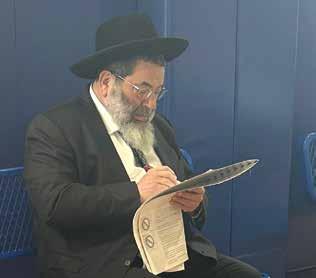
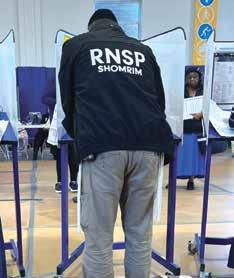




At the beginning of every school year, after the chagim pass, parents, students and teachers take a collective breath, and without realizing it, breathe in a new beginning. This year’s Open House at SKA represented this new beginning as eighth grade students from many different schools experienced what SKA has to offer.
At SKA, we are grateful for our history and traditions and work hard to embody the Torah values and principles that help propel us forward. As we anticipate the rest of the year, we do so eagerly, with excitement and hope as our students embark on a new journey and work together to forge new memories, embrace fresh
challenges and welcome new opportunities that reflect on the past and anticipate a promising future.


The polls were open at the Ganger Early Childhood division of TAG this week, when the talmidos had a chance to vote for their favorite healthy snack.
The winner was watermelon, with apple coming in as a close second.



HANC ECC brings Parshas Lech Lecha to life with a transportation fair
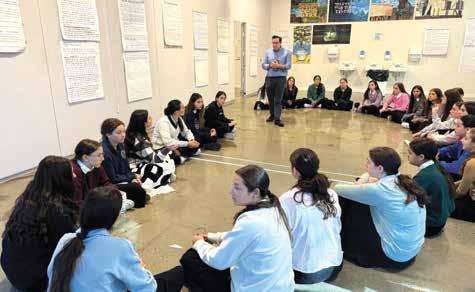
Last week, SHS history classes spent time focusing on the upcoming presidential election. Seniors have been studying the election in depth through an eight-week project, where they familiarized themselves and researched election related issues on a preliminary basic level. As the election approached, the next component of their project tasked each senior with isolating her top five issues that she felt were most important in this election. From those five, she was assigned one topic to research in depth.
Once prepared and armed with a stronger understanding of their given topics, they held a silent debate where they were randomly assigned either pro or con on the issue. They each went on to argue with their partner, silently, by writing down their arguments and counterpoints. Following the debate, the underclassmen all visited the gallery of the seniors’ debate posters. They in turn were asked to choose their
top five issues, read the arguments, and leave comments or questions. Once they had identified these top 5 issues of interest, they were asked to rank their importance to them from 1 to 5 and vote if they were pro or con, anonymously, of course.
Seniors and teachers led a discussion which addressed how some people are single issue voters, whether a person can feel one way about an issue and still vote for a candidate from an opposing political party, and influences that can sway one’s vote. They emphasized that there is a political spectrum on which candidates fall. Lastly, students were told whom they would have voted for in the election, based on their top ranked issues and their positions on them.
AP Statistics students used the information gathered in the gallery to create data sets on various election topics and to analyze where SHS students land on the issues. Seniors are looking forward to continuing their analysis when the actual election results are in!




Ezra Academy recently delivered a vibrant and engaging presentation to the eighth graders at Yeshiva of Central Queens (YCQ), aiming to introduce students to the unique educational environment that awaits them at Ezra. Known for its commitment to academic excellence, personal warmth, and a strong sense of family, Ezra Academy showcased the values and supportive culture that define the school.
The presentation emphasized how Ezra Academy combines rigorous academic programs with a nurturing atmosphere, creating a balanced environment where students are encouraged to thrive academically and spiritually. Alumni and current students spoke about the school’s challenging yet rewarding curriculum, which prepares students for higher education and meaningful lives rooted in Jewish values. From advanced coursework to extracurricular opportunities, Ezra Academy strives to cultivate well-rounded individuals.
A standout aspect of Ezra Academy
highlighted in the presentation was its warm, family-like environment. Faculty members treat students as family, making sure that each individual feels valued and supported. This connection helps foster a close-knit community where students feel comfortable to grow, ask questions, and pursue their interests confidently. For many of the prospective students from YCQ, this atmosphere resonated deeply, as they saw in Ezra a place where they could build lasting friendships and feel part of a caring, collaborative community.
The presentation was well received by the YCQ eighth graders, who left inspired and excited by what Ezra Academy had to offer. Many students eagerly signed up to receive additional information, intrigued by the prospect of joining a school where both academic excellence and personal warmth are prioritized. For Ezra Academy, this event marked a successful step in building connections with future students and expanding its school family.

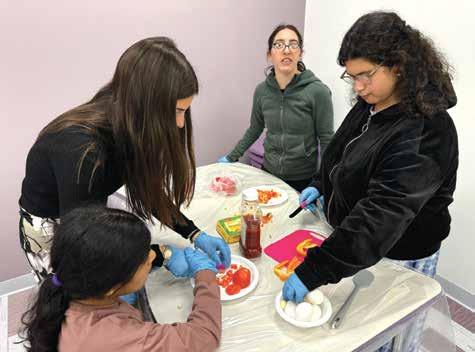
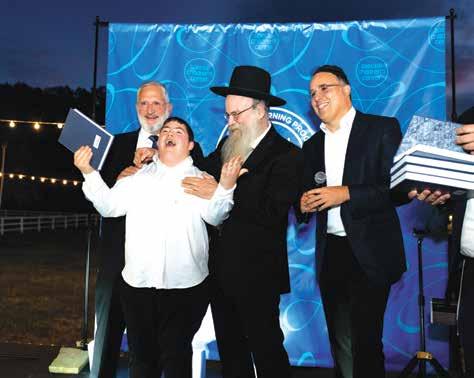
What a week at the Special Children’s Center! We had a “Choppe”d competition and some fall outdoor fun, amongst other amazing things which you can view on our instagram page. We had a haschalas Mishnayos for our boys program on our Center farm as well.


The Thank You Hashem team of Yaakov and Mendy came to inspire and be inspired by our Lower and Middle School students this past Friday. Students got a mini-kumsitz with song and dance with their classmates as well as showed off their knowledge of Torah. Everyone had a great time. Thanks for coming to visit!



By Monet Binder, Esq.
When it comes to estate planning, you may automatically think about taking legal steps to ensure the right people inherit your belongings when you’re gone. Although that thought is not wrong, it does leave out a very important aspect, and that is planning for life. Planning for life is perhaps the most critical part of estate planning.
Simply planning with a Will is not enough because it focuses solely on who gets what when you’re gone and ignores the fact that death isn’t the only thing you must prepare for. You need to consider that at some point you may lose capacity from an accident or illness. Whether we want to think about it or not, a devastating
accident or disease can prevent us from caring for ourselves or our loved ones. Planning for incapacity is so important because incapacity comes with an uncertain outcome and timeframe.
Where To Start
Planning for incapacity requires a different mindset and different legal documents. The most important thing to remember is that you must choose someone and include them in legal documents. If you don’t legally name someone to make medical and financial decisions during your incapacity, the court will choose someone for you.
The person a court chooses could be a family member you’d never want managing your affairs or a professional guardian who charges exorbitant fees, who could even potentially decimate

your estate. Either way, without the right legal documents, the choice is out of your hands. As with most court proceedings, the process of naming a guardian is difficult, often time-consuming, and very expensive.
The Proper Tools For The Job
There are multiple planning vehicles to choose from when creating an incapacity plan. This shouldn’t be just a single document. Though the planning strategies you ultimately put in place will be based on your particular circumstances, your incapacity plan will include some, or all, of the following:
Health Care Proxy/ Living Will Advanced directives that grant an individual of your choice the immediate legal authority to make decisions about your medical decisions and treatment in the event of your incapacity. They could be prepared to include a Rav for guidance your appointees may need.
financial power of attorney
A planning document that grants an individual of your choice the immediate legal authority to make decisions related to the management of your finances, real estate, and business interests, and is effective during your lifetime if you
cannot manage yourself.
Revocable living trust
A planning document that immediately transfers control of all assets held by the Trust to a person of your choosing to be used for your benefit in the event of your incapacity. The trust can include legally binding instructions for your care and how to determine incapacity.
If you are looking to prepare these documents with counsel and guidance by a personal lawyer who knows what’s important to you, knows how to locate your assets, and who can guide your family when they don’t know where to turn, call 718.514.7575 right away and schedule your Family Estate Planning Session and get started.
Monet Binder, Esq., has a practice Brooklyn, Queens, and in Lakewood areas, dedicated to protecting families, their legacies and values. All halachic documents are approved by the Bais Havaad Halacha Center in Lakewood, under the direction of Rabbi Dovid Grossman and the guidance of Harav Shmuel Kaminetsky, shlita, as well as other leading halachic authorities.

Fresh off the spirit of the yomim tovim, HAFTR kicked off its 5785 season of HAFTR Family Learning Night last Thursday, drawing over 550 participants from the Lower School, Middle School, and High School in a night that blended meaningful Torah learning, spirited games, and community bonding.
The Early Childhood, while not involved in the night program, during the day participated in delightful activities surrounding the week’s parsha including a fun petting zoo, learned about sinking and floating in their STEM classes, as well as painted a large rainbow, learning about the colors in their art classes.
The Lower School night learning program was the largest, led by HAFTR Lower School’s Mashgiach Ruchani Rabbi Asher Klein. In this program, he led students and parents through a structured learning program that engaged the learners with ideas and concepts relating to Israel and tefillah, all this while enjoying a delicious slice of pizza, courtesy

of the HAFTR PTA. After the learning session, students and parents were treated to an exciting Panapoly trivia game testing them on their recently gained knowledge, some fun geography and Israeli cultural questions riddles, and word games. Students who attended the event were also entered into a raffle, and winners were awarded fabulous prizes.
The Middle School held a similar learning experience, led by Rabbi Yisroel Moshe Siff for the boys and Mrs. Nechama Landau for the girls. Working with the same material as the Lower School,
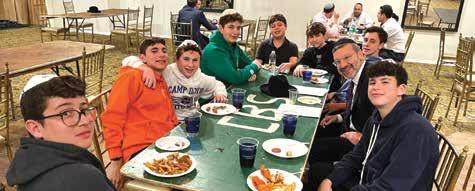
the Middle School students and parents tackled the material with equal zeal and interest. Equally exciting was the game night they held afterward, led by Mr. Stroock which also was fun and engaging.
Lastly, the High School kicked off its Mishmar program, this year in collaboration with Irving Place Minyan (IPM). With delicious food and inspiring learning materials, the High School students gained insights on the parsha and even learned a bit about the famous zemer “Yedid Nefesh” with Rabbi Blinder.
The night was a powerful way to “keep the spark alive,” following the inspiration of the recent Yomim Tovim. This event reminded all participants of the joy of learning, the strength of community, and the unifying spirit that comes with a shared dedication to Torah. HAFTR’s Family Learning Night fostered a love for Torah and Jewish pride and strengthened bonds between parents, students, and educators alike—setting a strong foundation for continued learning and connection within the HAFTR community.

G’day, mate! This year, our theme at Shulamith is “travel around the world.” Our focus for Chodesh Cheshvan is...Australia! Each of the

girls received their passports and hopped aboard, ‘round the world. We Zoomed with Naomi Nachman and made fairy bread, a classic Australian treat. Cheers!

At Yeshiva Har Torah, Rosh Chodesh is an opportunity to celebrate with simcha!
At our Early Learning Center (ELC), we combined our Rosh Chodesh festivities with our brand new Strive for 5 Core Values to introduce our students to two members of the “Strive for 5 family”: Compassionate Kalman and Connect-toHashem Keren!
These new friends, created by our Early Childhood Director, Morah Chaya Wernick, shared an important message with our talmidim and talmidot: even though the month of Cheshvan has none of its own chagim, we’re still able to be compassionate to one another and connect to Hashem every day by doing mitzvot!
Students were then introduced to our brand new Strive for 5 song, sung to the tune of Yoni Z’s hit song, Power, with special lyrics composed by our Assistant Principal, Ms. Elisheva Langstein, to highlight our core values. Our students will be learning this song throughout the year to connect to the values and express their pride in Yeshiva Har Torah!
Our program concluded with a special musical Hallel, led by our principal,
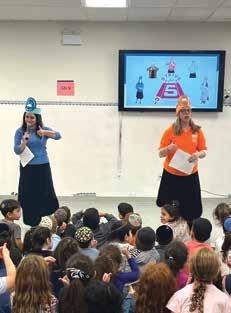
Rabbi Hal Levy, on the guitar. Students sang, “Hodu laHashem ki tov, ki l’olam chasdo,” thanking Hashem for all the wonderful blessings we have at home and at school. Be on the lookout for special Strive for 5 stickers that were given to the students to remember these values! Stay tuned for more updates about our Strive for 5 family, the accompanying song, and more special programs at YHT!


At HANC ECC in West Hempstead, the children were introduced to the judicial system that we practice in the United States. The students discussed the candidates, their roles and responsibilities, and the importance of their positions. Through group projects, the children in Morah Temira and Morah Yael’s UPK class partnered together to create their own rendition of the can-
didates. They then drew pictures of the candidates and proceeded to vote for the candidate of choice.
We expanded voting for the entire building, during snack time. The yeladim had strawberry, chocolate and regular milk and voted for their favorite. In addition, sweet cookies and salty crackers for snack were served, and the children voted on their preference as well. Further discussions ensued about how we don’t always get our number one choice, but we must conform to the choices of others. The winners, for those who are curious, were chocolate milk and Oreos. It was a truly delicious voting experience for all!
Believe it or not, most people have an estate. That estate might include a big house or a more modest one. An estate can include jewelry, financial securities and even art. The question is, however, what becomes of the estate, or rather, where will it go, once its owner passes?
Emmanuel Haas and Ari Zaltz, of Haas & Zaltz, LLP, are general estate planning attorneys who also specialize in elder care. They say that one of the biggest mistakes people make is waiting too long to make an estate plan.
The Torah addresses halachic issues as they pertain to inheritances, and of course, estate plans, and it provides several halachically approved ways of establishing one. For many of their Orthodox clients, Haas and Zaltz will come up with several provisions when helping them plan their estates and will even provide their clients with a shtar—a halachically legal document. A shtar can ensure that the intent of the person who creates the estate plan will be carried out, without prejudicing his children, who may or may not be “heirs,” at least according to halacha.
Unfortunately, a majority of estates still go through surrogate courts, inviting people to challenge and contest a will on any number of criteria. Even if a will is accepted, another potential area of conflict could be in the accounting, where an appointed executor must marshal the assets and then distribute them according to the terms and conditions as outlined
in the will. In order to avoid as much conflict and dispute as possible, Haas and Zaltz advise clients to set up a trust which typically discourages people from going to court.
In addition to making an estate plan, which should include provisions for longterm care, and setting up a trust to protect assets, Haas and Zaltz also advise clients to establish a health care proxy. There are several different types of healthcare proxies, including halachic ones that could require an appointed agent/ individual to consult with a rabbinic authority in the event that a serious life and death decision must be made. In any given health care proxy, there are many different options that people may choose, and Haas and Zaltz make sure to discuss any and all options and potential issues with their clients.
“It’s something people want to consider,” Haas cautioned. “People never know what their situation will be.” He said it’s important that one trusts their agent and feels comfortable with them. In preparation, a person should discuss with their appointed agent the overall approach that they want taken should a situation arise.
“Every individual and every family has some kind of need, whether it is a young family with minor children who are concerned about guardianship— which could be the single most important provision in a will—or whether they are a little bit older and have accumulated some assets and have become concerned about the dreaded probate process,” Zaltz
said.
By setting up trusts, assets are protected for both parents, while they are still living, and for the children, after the parents pass. In some situations, parents are concerned about the risks associated with leaving a substantial amount of money to an adult child who they fear might be a spendthrift, and a trust can prevent an inheritance from being distributed outright. “Even if a child has significant control over the trust, it would not be vulnerable to creditors or even to marital partners, which may or may not become a problem at some point in the future, should there be a divorce,” Zaltz said.
Ensuring their hard-earned money doesn’t end up in the hands of a child’s ex-spouse is a very realistic concern that parents should consider when planning their estate. Another concern is how to ensure that a spouse’s assets will end up with his or her children and not go to children from a second marriage.
For families that wish to leave money to a child or grandchild with special needs, Haas and Zaltz have emerged as specialists in this particular practice area, dealing with it on a regular basis, carefully planning and drafting solid provisions unique to this circumstance.
Another crucial part of estate planning includes burial arrangements and Haas and Zaltz tell people that those cannot be included in the will since the document is examined long after the burial takes place. Instead, those plans should be clearly communicated to family

and loved ones. Because tragedies occur quite suddenly, or because people often don’t want to address such topics during their lifetime, the chevra kadisha or similar organizations will usually step in and make the necessary arrangements. However, this may not be at all what the decedent would have wanted.
While many people do not feel comfortable discussing these topics, Haas and Zaltz want to do what they can to encourage it. “It’s brought down in seforim that if you address these issues, it’s a segulah for arichas yomim,” Zaltz said. Planning ahead makes for a significantly less expensive burial and takes away a lot of stress and anxiety from the family. Not making arrangements can lead to chaos during an extraordinarily difficult process and can lead to unnecessary arguments at the worst possible time.
“There are people who prefer not to discuss it for any number of reasons, but it is certainly something that should be considered, and it happens to everyone. Everyone knows that eventually they will go and that’s the way Hashem created us,” added Haas.
“We’re not the most exciting conversation, and people don’t love addressing the issue in general,” said Zaltz. “We try to make the conversation as easy as possible.”
To learn how to protect you and your family visit www.haaszaltz.com or call 516-979-1060. You can also email them at info@haaszaltz.com




What a week it has been at the Five Towns FM Home Loans Flag Football League. The boys were so excited to play a double header after Sukkos! The Pre 1A and first grade division had a lot of fun catching the ball and playing with their friends. In the second grade division, the Vikings beat the Broncos, and the Patriots beat the Jets. The Eagles beat the Giants, and the Jets beat the Broncos. The Eagles beat the Vikings, and the Patriots beat the Giants. In the third and fourth grade division, the Saints beat the Broncos, and the Seahawks beat the Falcons. The Giants vs. Packers game and the Eagles vs. Jets game both tied. The Patriots beat the Dolphins, and the Steelers beat the Vikings. The Falcons beat the Patriots, and the Steelers beat the Seahawks. The Vikings beat the Dolphins, and the Jets beat the Saints. The Packers tied with the Broncos, and the Giants beat the Eagles, with amazing defense by Judah Joszef and a great game by Ari Marmorstein!
In the fifth and sixth grade division, the Seahawks beat the Patriots, and the Panthers beat the Broncos. The Dolphins beat the Packers, and the Giants beat the Seahawks. The Dolphins beat the Patriots, the Jets beat the Broncos, and the Steelers beat the Panthers. Baruch Dachs had great catches on offense and Avi Konigsberg had an amazing game-winning touchdown!
In the seventh and eighth grade division, the Jets beat the Patriots, and the Eagles beat the Vikings. The Vikings beat the Patriots, and the Eagles tied with the jets.
The boys were very excited after the game as they all got Five Towns FM Home Loans Flag Football League hoodies! These one-of-a-kind genuine league-approved Flag Football hoodies were sponsored by the one and only FM Home Loans.
See you on the field next week for the Playoffs. Can’t wait!


On Wednesday of Chol Hamoed Sukkos, October 23, Jewish Community Council of the Rockaway Peninsula (JCCRP) host-
ed a bubble show on Reads Lane in Far Rockaway which was attended by nearly 300 children! Families enjoyed the show and thanked JCCRP staff

members for coordinating a local and free event. Thank you to JCRC-NY, UJA-Federation of NY, and Assemblywoman Stacey Pheffer Amato and
On Sunday, November 3, the Yeshiva University High School for Girls (Central) hosted its annual Open House. The 2024 edition was a whirlwind of fun, warmth, and learning as Central’s faculty and students shared the wildcat experience with the wider community. The morning gave the Central team a chance to demonstrate the unique value of Central, a small school that offers big opportunities for its students – including entry into the Yeshiva University family.
After registration and a reception in the lobby, families convened in the gymnasium for the opening program, where YU Vice President Mr. Andrew (Avi) Lauer of Yeshiva University welcomed the crowd, as did Rabbi Aryeh Lebowitz, the Abraham Arbesfeld Torah Dean of YU’s Rabbi Isaac Elchanan Theological Seminary. They were followed by Central students of the past and present: proud alumnae Mrs. Aliza Gewirtz (‘06), Central’s Dean of Students, and Central’s Associate Principal, Ms. Leah Moskovich (‘07), who were able to highlight Central’s blend of warmth and academic rigor as both graduates and educators.
“In my role, I am privileged to get to know each and every student and her family, and act as an advocate, cheerleader, and supporter throughout the
four years of high school,” Mrs. Gewirtz reflected. “For me, the highlight of the school year is the full-circle moment I experience each June at senior graduation. As the students walk across the stage to accept their diplomas, memories from their Central story play out in my mind. This moment – where an unsure 9th grader develops into a senior who is confident, secure, educated, and excited to bring all that she has learned and all that she is into the world – is the ultimate nachas, and representation of the one-ofa-kind Central experience that is unique to each precious student.”
Sophomore Jamie Blass (‘27) also addressed the room in order to give the student perspective.
After introductions, prospective eighth graders moved on to the Student Life Panel in the cafe, followed by the Only at Central gallery walk, while parents attended the Parent Legacy Program in the gym, followed by parent session options. Options included: a tour of the building, guided by faculty ambassadors, a session on academic opportunities, a parent-led panel discussion about student life at Central, and lastly, a session about the various levels of support offered throughout the four years at Central. The session led by Mr. Lauer highlighted the special opportunities
Councilwoman Selvena Brooks-Powers for their support.

and benefits at YU available to students at Central – including the new YU Residency Credit Program, in which seniors taking twelve hours of college courses on Central’s campus can gain a semester of residency credit at the Stern College for Women, and the YU Honors Pathways Program, which offers freshmen who maintain GPA and school portfolio expectations can be automatically accepted
into the Stern Honors Program during her senior year at Central.
Eighth grade applicants will get an additional opportunity to spend time at the Holliswood campus when they come for their interview, tour the building with friends, and talk to students and teachers as they get another taste of life at YUHSG.

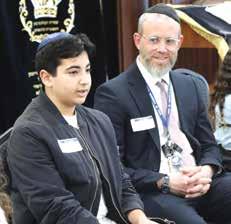
On Sunday, November 3, nearly 100 families gathered for YCQ’s Annual Open House, experiencing the warmth and unique spirit of a yeshiva known for its commitment to academic excellence in a Torah environment.
The day began with a lively performance by the Torah Tots, setting a warm and exciting tone for the day. Families rotated through classes and participated in different activities, including an interactive lesson for Parshat Noach, a Fundations literacy demonstration, an

Israel-themed music activity, and an engaging Ivrit presentation.
Families also had the opportunity to connect with administrators, current students, and alumni at an informative Meet and Greet session led by Rabbi Mark Landsman, principal of the Yeshiva.
The event concluded with a video showcasing the many special moments that fill each school day at YCQ.
Early Childhood applications are now open at ycqweb.com/apply. Apply today!
By Lindsay Appel
HAFTR High School is back in session after an invigorating Sukkot break, with students and teachers returning full of energy and eager to get back to the swing of things! On Wednesday, October 30, students participated in the annual Club Fair, which was held on the front lawn. All 73 clubs are run by students, for the students, with a teacher assigned as a supervisor. Prior to the fair, students worked together to create club ideas that appeal to a variety of interests. Once an idea is approved, students work with the Student Activities Department to add it to the coming year’s catalog of choices. Each club’s booth showcased the goals and activities that students can be involved in throughout the school year.
“It was very inspiring and interesting. I love how they incorporate everyone’s ideas and interests,” commented Shiri Cohen, an 11th grader. Her ideas were echoed by Daniella Asherov, 12th grader,

The children at Gan Chamesh practiced exercising their civic duties on Election Day as they voted in a Gan Chamesh election for their favorite snack. The contenders were corn pops

and cookies, and the children submitted their ballots in the Gan Chamesh voting booths. Cookies was the big winner of the day!
Milton Hershey started his first company, Lancaster Caramel Company, when he was 30 years old – long before he founded The Hershey Chocolate Company.
who said, “It’s a great way for students to see and interact with the club and its members. You really get a feel for what the club is about.”
There are several special interest clubs, as well as fellowships and publications that are available for students to join. Some examples of special interest clubs are the Mandarin Club, Improv Club, Stock Market Club, Crafts 4 Israel Club, and even Rabbi Blinder’s Potato Kugel Club. Among the fellowship opportunities are the Committee for Israel Action, Shalom Task Force Purple Fellowship, Digital Citizenship Club, and Brighten Their Day (BTD). Sarah Braverman, 9th grade, added that the fair was “very informative! The weather was beautiful and… The goodies the clubs gave out made it even more fun!”
The positive vibes continued on Thursday, with HAFTR High School’s Spirit Day. The students and teachers arrived full of energy and excitement, wearing HAFTR apparel and shining in HAFTR colors of red and blue! During fourth period, the entire student body
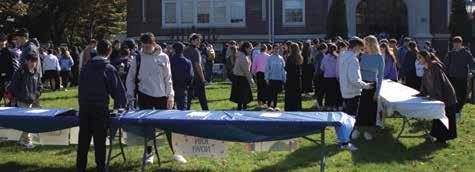
gathered in the Scott Satran Arena for the annual pep rally. HAFTR’s mascot, the HAWK, greeted all the students, and then the student government spirit leaders, Shmuel Gettenberg and Gabrielle Heller, took the stage and announced all the players on each athletic team, including basketball, hockey, volleyball, and dance. The school also presented entertaining videos and a raffle for HAFTR and gave out incredible HAFTR swag.
“The pep rally was an incredible event that really brought the whole school together. It was amazing to see everyone showing their school spirit and getting
excited for our teams. The energy was electric, and it’s the moments like these that make HAFTR so special,” said Gabrielle Heller, 12th Grade Spirit Head. Shmuel Gettenberg, 12th Grade Spirit Head, added, “It was hype! It is the beginning of the road our teams will take to victory this athletic season.” After being away from school for the holidays, it was a great way to jump back into the excitement of HAFTR spirit and athletics. It was a way to get everyone involved and excited for the rest of the school year. Most importantly, it helped everyone feel connected as part of the HAFTR family!

The Village of Cedarhurst honored Dr. Marc Sicklick with a formal citation recognizing his retirement and decades of dedicated service to the community at its October board meeting. Dr. Sicklick, longtime pediatric allergy and immunology specialist, began his practice in Lawrence in 1979 before relocating to Cedarhurst in 1989. He has served the community for over 40 years with outstanding care and compassion, often being available to his patients day or night.
His commitment to Cedarhurst extends beyond his medical practice. From 2001 to 2003, he served as President of Young Israel of Lawrence-Cedarhurst (YILC), where he demonstrated his ded-
ication to community values. Notably, upon discovering the theft of American flags from Village streets, he promptly led efforts to replace them on behalf of YILC members, fostering a continued spirit of patriotism and unity in Cedarhurst.
In addition, Dr. Sicklick has spent over two decades as the community’s liaison to the Nassau County Office of Emergency Management, helping to ensure the area’s readiness in times of crisis.
The Village board commended Dr. Sicklick for his remarkable contributions, reflecting on his legacy of compassion, civic leadership, and commitment to Cedarhurst. His steadfast dedication leaves an indelible impact on the community.
New Book by Touro Dean Explores Talmudic Narratives
Aggadic stories in the Talmud offer profound insights into the lives of some of Judaism’s greatest sages – Hillel, Rabbi Yehuda HaNasi, Rav Sheshet, Rav Yannai, and many others –as they grapple with moral and existential dilemmas that resonate through the ages. In A Mysterious Guest for Dinner, Rabbi Dr. Moshe Sokol, the dean of Touro University’s Graduate School of Jewish Studies, delves into these timeless tales, asking thought-provoking questions: Should one sacrifice everything for a life of extreme holiness? Who truly deserves charity in a time of poverty, and how should one respond when a seemingly affluent individual begs for food? When a marriage falters because a wife attends a Torah lecture, who bears responsibility? And, most intriguingly, is it ever possible to encounter the Messiah?
“The more I carefully studied Aggados in the Gemara which tell stories, the more convinced I became that behind the often striking and fascinating storyline itself there was embedded the deepest wisdom of Chazal. And the more I sought to plumb the depths of that wisdom, the more excited I became about sharing it with others,” said Rabbi Dr. Sokol.
This volume, the second in Rabbi Dr. Sokol’s series on Talmudic stories published by Koren, presents a close
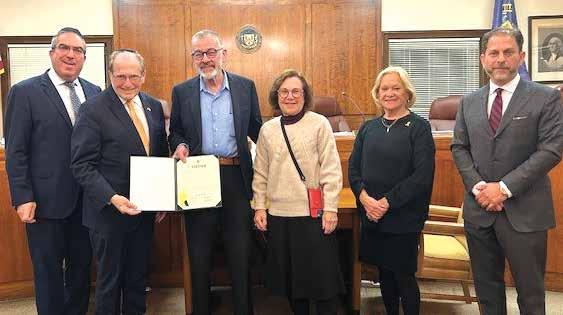
analysis of ten narratives, uncovering the rich dialogues, ironies, and reversals they contain. Drawing on classical rabbinic commentaries, contemporary scholarship, and insights from psychology, literature, history, and philosophy, Rabbi Dr. Sokol demonstrates how these compact stories speak with enduring relevance to today’s seekers of Talmudic wisdom.
“Many who learn Gemara either skip over such Aggados or learn them quickly without devoting to them the attention they deserve. I hope readers of the book will be inspired themselves to work at understanding the many Aggadetas they encounter in their own learning, to focus on every word and phrase of the Gemara with meticulous care, to raise careful questions about the Aggadata, and then to their best to answer them. Every word, every teaching of Chazal is precious. They often sought through the fascinating stories they told to convey their deepest insights, about the human condition, about the complexity of human relationships and moral obligations, about the challenges of avodas Hashem and the costs it sometimes exacts, about the impact of our past upon the difficult choices we sometimes make, and about our deepest yearnings as Jews and human beings. I hope this second volume, like the first, introduces its readers to the complex and often surprising depths of

Rabbi Dr. Moshe Sokol is the Dean of the Touro University Graduate School of Jewish Studies and rabbi of the Yavneh Minyan of Flatbush. He holds a PhD in philosophy from the University of Pennsylvania, where he was a Thyssen Foundation Research Fellow, and received semicha from the Israel Torah Research Institute (ITRI) in Jerusalem after seven years of study in the Talmudical
you
of Philadelphia. He has taught at the University of Pennsylvania, New York University, and Touro University’s graduate and undergraduate schools. Rabbi Dr. Sokol has written or edited six books, including Judaism Examined: Essays in Jewish Philosophy and Ethics (2013) and best-seller of the year The Snake at the Mouth of the Cave: Exploring Talmudic Narratives (2021). A Mysterious Guest for Dinner can be purchased at korenpub.com

Party Pets had their annual visit to Lev Chana last week in honor of Parshat Noach. The students always love seeing and petting all the animals that visit! Students in HALB elementary also had special visitors at their Noach show. The students especially loved watching their principals and teachers holding the parrots!
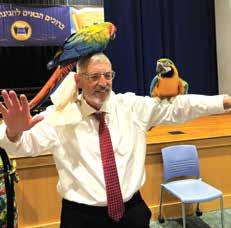



This past Shabbos, MTA’s Class of 2028, along with their Senior Cubs2Lions mentors came together to bond on a special Shabbaton. The talmidim boarded the buses for Camp Nageela after their regular Thursday night Mishmar, and after a quick surprise stop for bowling, arrived just in time for a delicious midnight barbecue. After receiving their room assignments, the talmidim enjoyed ping pong, nine square, and of course the open Beis Medrash until curfew.
On Friday, after a beautiful Rosh Chodesh davening and deluxe breakfast, the freshmen enjoyed Concentric Chaburas with the seniors. Each senior prepared a 90 second dvar Torah on the Parsha – the
room reverberated with words of Torah and companionship as the mentors rotated from group to group.
As it was Parshas Noach, it seemed fitting to have a Teiva Challenge! Groups of freshmen, teamed with their senior mentors, were tasked with building a Teiva out of cardboard and duct tape, with the goal being to float across the pool with a talmid on it! The teams worked together to plan and build their crafts –while competing in quick team building activities in order to win extra duct tape for their teiva. In the end, most of the cardboard teivas met a soggy finish – but two groups managed to build a teiva that made it across the pool!
The unseasonably warm weath-

er enhanced the sports and recreation that took place on the grounds of Camp Nageela. Softball, football, basketball, tetherball, tennis and hiking were enjoyed by the talmidim, rebbeim and administrators. Then the boys headed to their rooms get to prepare for Shabbos.
Shabbos itself was jam packed, filled with inspiring tefilla, delicious seudas, uplifting zemiros and divrei Torah from rebbeim and talmidim. The tisch was a highlight for many – as the grade joined together along a table packed with candy, fruit, cake and cholent for divrei chizuk and spirited singing. The beis medrash was hopping throughout Shabbos as the talmidim tried to complete their first MTA360 – a learning incentive program
that challenges each talmid to learn for 360 minutes over the course of Shabbatons or extended breaks from Yeshiva. There was also time for board games, ping pong, mini hockey and of course well deserved menucha.
The Shabbaton concluded with a Melave Malka that led to singing and dancing. It was an amazing Shabbos that really helped the freshmen bond as a grade. The boys boarded the buses home with smiles on their faces, reflecting on the new friendships made and memories that will iy”H fuel four years of growth ahead. As MTA begins its winter zman, the freshmen have a renewed sense of belonging at Yeshiva and are ready to learn with increased zeal.
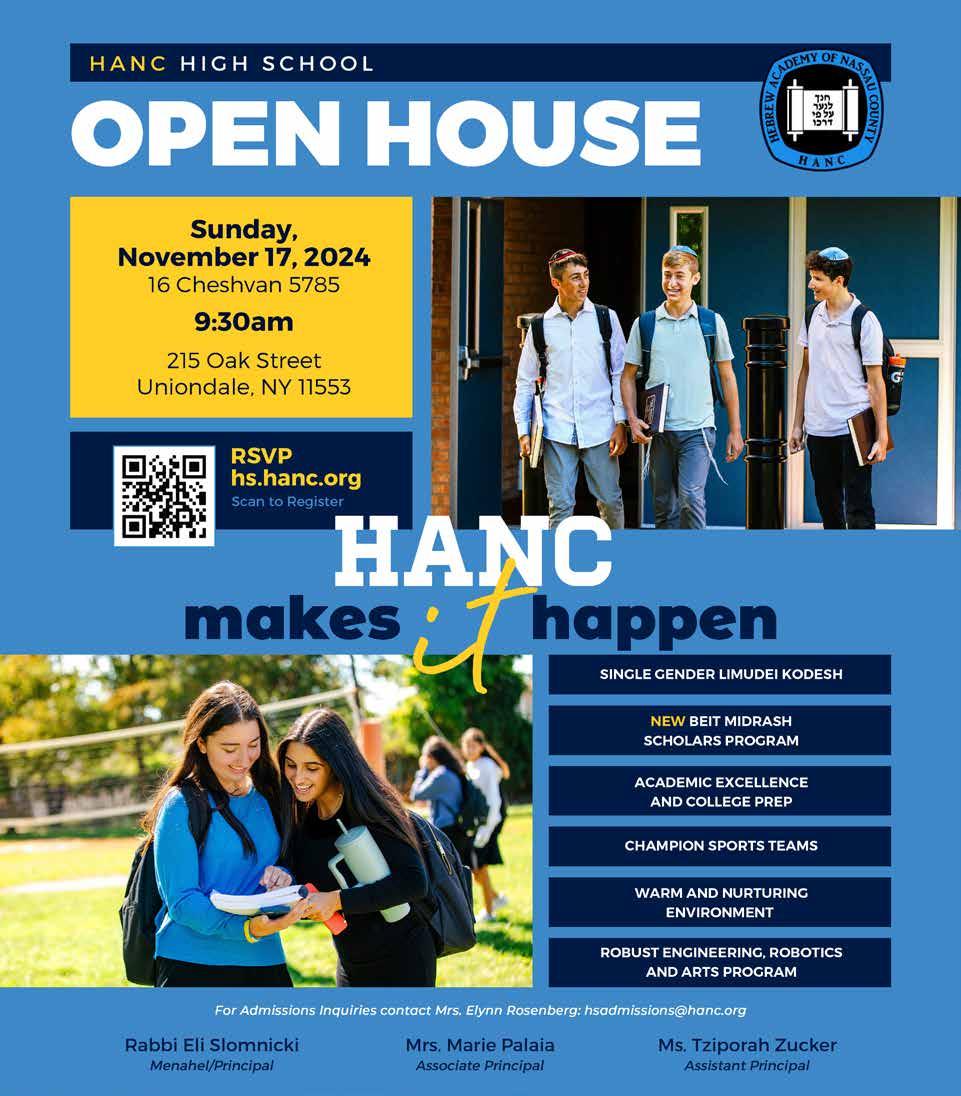

The Middle School girls kicked off a special program, “R.A.I.S.E. (Respect and include students everywhere) the Bar.” Each girl received her very own “R.A.I.S.E. the Bar” sweatshirt.
The goal of the program is to cultivate an appreciation of the elevated status of a Tzelem Elokim, guiding our thoughts and actions toward others to reflect these values.

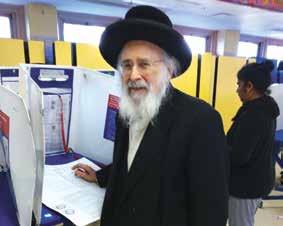
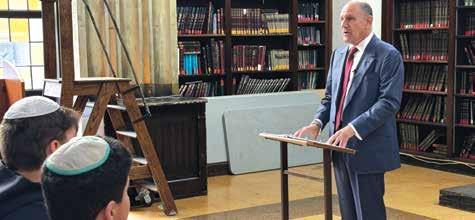
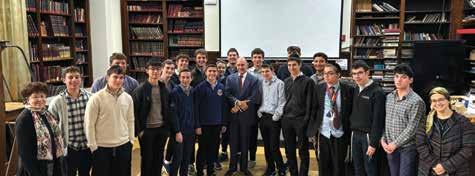
On Tuesday October 29, seniors at MTA who are part of the Names Not Numbers Holocaust Documentary Elective participated in a unique lunchtime assembly with a special guest. Jeff Salgo, a retired CBS News producer, spoke to students about best practices of interviewing techniques that he gained from over 35 years lecturing about and working in the field of Broadcast Journalism. His session was designed to give the students tips and tricks for their upcoming interviews with Holocaust survivors.
To start, Jeff introduced the mnemonic HRE which stands for History, Research, and Empathy, the three major responsibilities an interviewer has to their interviewee. You must have a clear understanding of the background of the individual in front of you (History), you must show respect to that person by preparing adequately for the interview (Research), and you must give the interviewee whatever space necessary for them to deal with the emotional difficulty of going through the interview (Empathy). If you have mastered these three elements, Jeff explains, you will be able to create trust between the interviewer and the interviewee, and that is the foundation of an effective and qualitative interview. Jeff also reminded the students about the
importance of speaking loudly, rewriting questions that lead to Yes or No answers, and asking follow up questions to get the most out of the information the survivor shares.
Students enjoyed the opportunity to ask Mr. Salgo about some of his personal experiences as a CBS News Director, Associate Director, and Producer. To the question about who was the most interesting person he interviewed, Jeff shared a story of the time Kermit the Frog was being interviewed on CBS, and rather than put the mic on Jim Henson, Jeff had the idea to put the mic on Kermit! Jeff is also a professional Scuba Diver, and he drew on his expertise in illustrating the piece of advice “Don’t Panic” by describing the time he was diving 60 feet underwater when he ran out of air in his oxygen tank....
These and other stories peppered his talk, and made it entertaining, engaging, and fun for the students. When the session was over, students crowded around him, eager to continue the conversation and learn more.
The 22 seniors involved in the Names Not Numbers project will be working on preparing for their interviews over the next three weeks and are looking forward to welcoming their survivors to MTA in the fourth week of November.
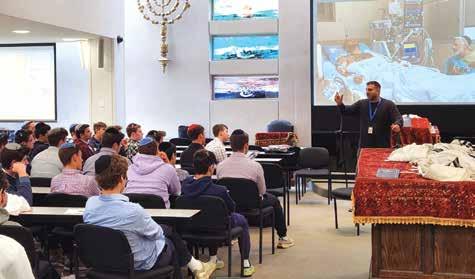
Last week, DRS was privileged to welcome Dvir Dangur, an IDF reservist and true hero of Israel, who shared his harrowing experiences from October 7th and his current mission in Gaza. At just 25, Dvir embodies the spirit of selflessness and sacrifice; he volunteered to stand on the front lines to defend Am Yisrael and Eretz Yisrael, setting aside his own life and aspirations to answer the urgent call of duty.
On that fateful day, as he bravely confronted the enemy, tragedy struck – Dvir’s unit was ambushed, resulting in the heartbreaking loss of his closest
friend, Shalev, and leaving Dvir critically injured. For days, he battled not only for his mission but for his own survival, emerging as a living testament to resilience and unwavering courage.
Now, Dvir is on a different kind of battlefield: the path to physical and emotional recovery. Every step he takes is an inspiring victory. With humility and strength, he spoke to the talmidim about the momentous day he was finally able to remove his hospital bracelet – a symbol of his reclaiming freedom and personal strength.




The JSL reached the midway point of the Fall Season by FM Home Loans. There were some incredible games and individual performances this past Sunday! Registration for the Winter Season is open and filling up fast. Register and more info at 5TJSL.com
K/P Hockey
Bright Futures had a shining performance with a crazy comeback, securing an 8-6 win over Gerber Bedding. Smash House smashed through Growtha with a 5-1 victory, as Eitan Koegel showcased his skill with 2 goals and 2 assists. 5 Towns Landscaping trimmed down Posh Home + Bath in a 4-2 win, with goalie Yehuda Tepfer stepping up for 13 crucial saves. 5 Towns Central steamrolled SR Whee 5-0, and Abraham Glatzer locked in a shutout.
K/P Soccer
Maidenbaum delivered a powerful 9-0 shutout against Future Care Consultants, with Yehuda Wach scoring an impressive 4 goals. Better Image Contracting edged out Hewlett Auto Body 6-5, as Yehoshua Berkovsky netted 5 goals in a stellar
performance.
Football
Rides To Fly soared to a 3-2 win over Beautox_AL Beauties, highlighted by Shua Abrams’ incredible full-field, over-the-shoulder touchdown. Newman Dental had a flawless 4-0 game over Tikva Fire, led by Shua Goldman’s 3 touchdowns that secured the victory.
Hockey: 1st
Town Appliance turned up the heat against PlumbPro, winning 8-6, with Yaakov Kret dominating the scoreboard, scoring 7 goals thanks to excellent stickhandling. Wolf Phone Repairs dialed in a 10-4 win over John’s Automotive, as Avi Langer’s all-around passing contributed to the victory. Simcha Day Camp celebrated a 6-3 victory over Seasons Express, where Gadi Menche showcased impressive defensive steals.
Hockey: 2nd/3rd
SR Whee and Newman Dental ended in a 3-3 tie, Liam Sides making save after save to keep his team in the game. Maidenbaum clinched a close 4-3 win over Smash House with a last-
minute goal from Mordy Frank. S.I.N.G. Entertainment kept up the momentum, defeating PIP Printing in a 6-5 thriller.
Hockey: 4th/5th
Russo’s Pharmacy dispensed a 10-4 win over Smash House, thanks to Aharon Zeidel’s stellar saves and Gavriel Levine’s selfless empty-net pass that led to a teammate’s score. BlueBird Insurance soared over Target Exterminating in a 4-2 victory, with Nesanel Taitelbaum finding the net twice. Town Appliance and Marciano Pediatric Dentistry ended in a 2-2 draw, as Naftali Pfeifer brought his team level with a game-tying goal.
Hockey: 6th/8th
Wieder Orthodontics flashed their brightest smiles in a commanding 13-4 win over Tikva Fire. Seasons skated smoothly to a 5-1 win over 925 Sterling, with Dovi Einhorn putting up 2 goals in the first period to set the tone.
Men’s Basketball
Aron Azose, who earlier in the day ran basketball clinics for the JSL youth, was dominant as Growtha played like a welloiled machine to easily defeat Future

Care Consultants 66 to 48. Nussie Felder was smooth shooting all game, helping to lead Town Appliance to a 76 to 62 versus Maidenbaum. Wieder Orthodontics defeated SR Whee 65 to 49, led by 4 threes from Shimon Benklifa in the second half! Emporio was victorious over Rides To Fly 63 to 34.
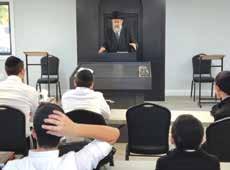


The momentous relocation marks a significant milestone for the flourishing institution, which has experienced remarkable growth since its founding just four years ago.
The first day of the new zman was highlighted by the presence of the distinguished Rosh Yeshiva, Harav Dovid Harris, shlita, who delivered inspiring
divrei bracha in the newly established Beis Medrash.
The significance of the occasion was palpable as students, faculty, and prominent local rabbanim joined together in joyous dancing outside the new facility, celebrating this new chapter in the Yeshiva’s history.
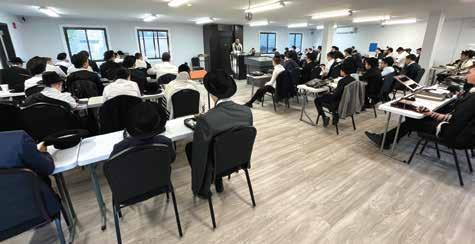

By Alexandra Fuchs
As of the 2024-2025 school year, the Hebrew Academy of the Five Towns and Rockaway (HAFTR) High School has been named in the Top 100 Debate Programs in the country. This honor was bestowed on HAFTR by the National Speech and Debate Association (NSDA), which is celebrating their 100th year as the premier American honor society for Speech and Debate.
Under the leadership of Coach Alex Libkind, the HAFTR program has grown rapidly and includes many Academic All Americans. Over the past two years, HAFTR has fielded numerous students at the National Tournaments in Phoenix, AZ, and Des Moines, IA. This year, the team is expanding further with a strong crop of freshmen.
“HAFTR has always supported the Speech and Debate Program,” said Coach Alex Libkind. “The administration of HAFTR allowed the school to become the hub of the Citron Online District, which
offers students from Yeshiva high schools throughout the country the opportunity to compete on equal footing with other public and parochial schools. Citron was founded two years ago, and this accolade shows what Yeshiva high schools can accomplish at the national level. I am grateful to my co-coach Mike Convey for his support in making us such a competitive program.”
This year, the coaches from Citron and HAFTR are working with high schools throughout the United States, to expose more students to the rigors of speech, debate and model congress. The district will offer numerous Zoom group training sessions that will help Yeshiva students become strong advocates for the Jewish community.
“Especially at this time, with ongoing threats to the State of Israel and growing antisemitism in the U.S., we want our students to capably and articulately support and defend our nation and our people,” said Ms. Naomi Lippman, Head of School at HAFTR High School. “Training
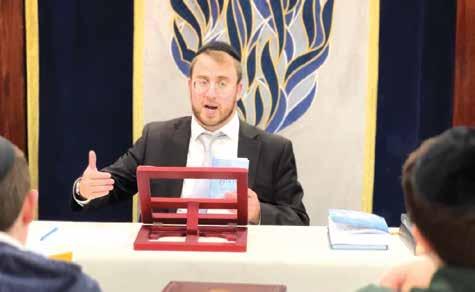
As a new zman begins and more talmidim join Yeshiva Ateres Eitz Chaim, we are very excited to welcome Rabbi Yisroel Harrar! As a close talmid of HaRav Binyomin Forst, shlita, and an experienced rebbe of mesivta bochrim, Rabbi Harrar came highly recommended.
Yeshiva Ateres Eitz Chaim is com-

students to debate all sides of a complex topic gives them a deep understanding of how to argue effectively for the causes about which they are personally passionate. HAFTR is committed to developing strong advocates and leaders who will represent us in the Jewish community and the broader community.”
HAFTR and Citron offer the following diverse competition events to the
students: Extemporaneous Debate, Lincoln-Douglas Debate, Public Forum Debate, Big Question Debate, Congressional Debate, Worlds School Debate, Informative Speaking, Radio Speaking, Humorous Interpretation and Original Oratory. Students who compete in these events earn NSDA points that they accumulate throughout their high school careers.
mitted to maintaining a small learning environment, even with the growth of the Yeshiva. Aside from giving shiurim, Rabbi Harrar will be working with talmidim individually and in small groups to help strengthen and master skills in their limudei kodesh. We look forward to another successful zman!



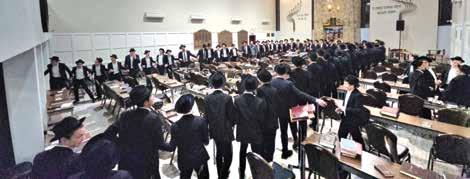

This past Sunday night, 3 Cheshvan, Mesivta Shaarei Chaim held its grand siyum on Maseches Bava Metzia in memory of the soul of Yerachmiel ben Eliezer, the late Mr. Richie Jedwab, a”h. Close to 60 bochurim were misayaim the entire masechta.

Ezra Academy celebrated Rosh Chodesh Cheshvan with a festive school-wide breakfast, bringing students and staff together for a morning filled with warmth and inspiration. The dining area was decorated with a creative “flood” theme, drawing on the story of Parshas Noach. Blue and water-themed decorations reminded everyone of the flood story, setting the stage for this month’s new theme: “Raining Positivity.”
The theme, “Raining Positivity,” encourages students to focus on using their talents, especially the power of positive
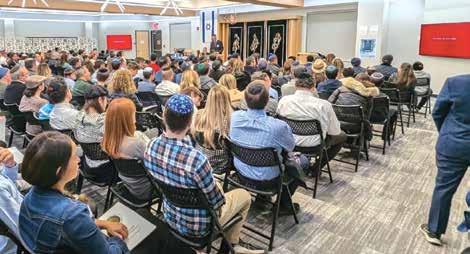
Rambam Mesivta recently hosted two highly successful Open Houses this past Motzei Shabbos and Monday evening, attracting a large crowd of prospective students and their families eager to learn more about the Mesivta’s distinctive approach to Torah, Midos, and Excellence.
speech, to uplift one another. Through kind words, encouragement, and thoughtful conversations, students are challenged to contribute to a supportive and caring school environment.
The breakfast also included inspiring words from two students who gave divrei Torah, sharing insights into Parshas Noach and the value of positivity. Their words reinforced the importance of using our voices for good, echoing the theme’s message that positive speech can truly “rain down” goodness and growth within the community.
The evening began with families gathering in the shul, where Assistant Principal Rabbi Avi Haar led a heartfelt Tehillim for our brothers and sisters in Israel. Rabbi Zev Meir Friedman, Rosh HaYeshiva, then shared the school’s unique hashkafic approach and core values, providing attendees with insight into the Mesivta’s educational philosophy and history. Rabbi Avi Herschman, the newly appointed Rosh HaMesivta, spoke passionately about the essential ingredients for developing a successful ben Torah. He also highlighted Rambam’s exceptional Limudei Kodesh program, which will offer three tracks of Gemara study for incoming ninth graders, as well as the diverse extracurricular offerings such as Halacha Yomi, Sugya Yomi, Masmidim, and “Meet the Rabbi” club. These initiatives help foster a dynamic 24/7 Makom Torah and build lasting relationships between talmidim and rebbeim.
Hillel Goldman, Rambam’s newly appointed Principal, addressed the crowd with a presentation on Rambam’s distinctive approach to leadership and extracurricular activities, which promote student confidence, values, and instill a sense of responsibility to give back to the community. Mr. Goldman also proudly shared that Rambam is the only all boys high school to ever win the prestigious Blue Ribbon Award more than once.
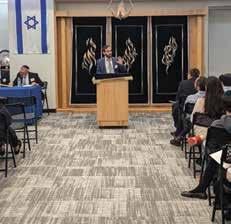
The event was engaging and informative, with attendees having the opportunity to hear directly from the school’s new leadership, tour the state-of-the-art facilities, and speak with dedicated faculty members. Current students and parents also shared their enriching experiences at Rambam, giving prospective families a true sense of the school’s unique blend of academic rigor and warm community spirit. Students and parents were also given the opportunity to experience mini lessons and learn more about the Kodesh and General Studies programs.
In addition to the presentations, students had the chance to spend time in the gym, and later enjoyed a delicious collation in the lunchroom, where they could mingle and ask personalized questions to staff and parent volunteers.
Spots are filling up quickly for the school’s third and final Open House of the season, which will take place on Tuesday evening, November 12th at 7:30 PM. If you’re interested in attending, please visit http://openhouse.rambam.org. The Class of 2029 is already shaping up to be a truly exceptional group!


At Mercaz Academy in Plainview, sixth grade students have been transforming their weekly independent assignments into opportunities for collaborative learning with their innovative “help desk.” At the beginning of each week, teacher Rabbi Moshe Rubel assigns work in Chumash to be completed by students at their own pace. On Friday, students who have already successfully done the work man a “help desk” where students who missed material, did not fully understand a lesson, or just need a different perspective to finish the assignment can get a little help from their friends.
While assisting classmates, those manning the “help desk” reinforce their own understanding through teaching others, develop leadership and communication skills, and gain confidence in their abilities. Meanwhile, students on the receiving end benefit from their friends’ prior experience with the mate -

rial and learn to view challenges as normal parts of the learning process. Beyond all this, the most valuable feature of the “help desk” is the supportive classroom community it fosters, in which academic success is a shared goal, rather than a source of competition.



By C.B. Weinfeld
A Potent Brew
Sometimes I wonder what would have happened if Aryeh hadn’t tampered with my coffee.
Would the story have had a similar ending? Or would things have turned out differently? But I can only conjecture. We are simply players on the field of life, puppets held from Above on a string.
If anything, Aryeh’s story has taught me how little control we have over our destiny, and how Hashem’s will prevails.
My name is Simcha, and I’m an older bachur who works as a sho’el u’meishiv at an upstate yeshivah geared for chassidishe bachurim. One of my least favorite jobs is fielding the inevitable phone calls. Naturally, it’s hard to watch my talmidim get married one after the other, while I am still frustratingly single.
But that’s not the issue with which I’m grappling. My struggle is that I’m constantly walking a tightrope, a fine line between sharing too much and saying too little.
Each time I receive a phone call from a prospective mechutan I break into a sweat, cognizant that the words I choose will possibly affect his entire future.
I had been successfully giving information about my bachurim for several years and have rarely been off the mark. It’s a fine line between being honest and not misleading anyone, and portraying my boys in the best possible light. As the saying goes, “One may not say a lie, but one mustn’t always say the absolute truth.” For example, if a bachur is slightly overweight I wouldn’t call him obese, but full and geshmak. Or if a young man was lively and had a hard time sitting still during the shiur, I would describe him as full of life and chein, a bachur who was eager to help others.
All of these descriptions were true, of course, and if someone were to ask me, point-blank, if said bachur was a masmid, I wouldn’t lie. But I didn’t need to volunteer information unless asked.
All this is just a prelude to Aryeh’s story, which began last winter.
Aryeh Miller was a handsome boy, tall and broad, blessed with a lively and energetic disposition. He was popular among the boys and had leadership abilities as well. He was an average student, with a moderate amount of zitzfleish, a Yiddish word for one’s ability
to sit over one’s studies. Aryeh was quite likable, but he had one issue that drove me bananas. Aryeh was a practical joker, who enjoyed pulling fast ones on bachurim, and sometimes on the staff as well. Since I was only a couple of years older than the boys, I was often the target of their mirth.
I’ll never forget the day I walked into the beis medrash one day before Purim, on an especially blustery afternoon. I hurried over to my shtender, on the far side of the beis medrash, to find a hot cup of coffee already waiting for me. I was very grateful — I usually prepared myself a cup, so that I would remain alert all afternoon, and that day I was running late. The bachurim knew that I didn’t take my coffee with sugar, I liked it bitter, and with only an ounce of milk. They sometimes teased me, calling me “bitter-sweet Simcha,” but I took it in good humor.
“Who prepared the coffee?” I asked, sitting down, making a bracha, and taking an appreciative sip.
I saw the twinkle in Aryeh’s eyes just as I swallowed, and nearly gagged. For someone had spiked my coffee with a heaping amount of salt.
I ran to the sink to wash my mouth, gagging on the sickeningly salty drink, and heard muted snickers behind me. Thirtythree bachurim were chuckling, trying to contain their mirth at my desperate dash to remove the salty phlegm from my throat. Though it was supposed to be a Purim shtick, perhaps in good humor, I didn’t think it was funny.
Nor did the rest of the yeshivah staff.
The Rosh Yeshivah was very upset when he heard what had occurred. It didn’t take long to discover the culprit, our very own Aryeh, who had wanted to make things lively in the yeshivah l’kavod Purim. Instead, he was given a stern lecture and suspended for two days. Aryeh was warned that if he would try that shtick again, he would be sent away from yeshivah for good.
The other bachurim felt very sorry, especially when they realized that they had gone a bit too far, and that my feelings were truly hurt.
To his credit, Aryeh apologized immediately, writing me a heartfelt note asking for mechilah and explaining that it had been meant as a lighthearted Purim joke.
I accepted the apology, telling him I was mochel, but my insides were raw.
Why had Aryeh thought I was fair game? True, I was a bachur, but I was at least a decade his senior. What was I, chopped liver? And where was the kavod haTorah?
I had to hand it to Aryeh. The suspension had shaken him up a bit and he seemed to become more serious. He stopped pranking others, though he still preferred to make a joke out of things that most people didn’t find funny.
We settled into an uneasy truce, with both of us avoiding each other for the rest of the zman. Which was easier said than done, because the yeshivah was not especially large, and we all shared the same beis medrash for a couple of hours a day. Aryeh and I were cordial, of course, but things weren’t the same between us.
I felt belittled, as if I didn’t matter, as if the fact that I was an older bachur made me fair game for ridicule. Until then I had thought I was one of the staff, albeit a few years younger. Now I realized, with stunning clarity, that I had become the target of the boys’ jokes.
Aryeh tried his best to patch things up, including when he distributed a generous cash gift before Pesach and complimented me on my new hat. I nodded, coolly, but wasn’t going to be taken for a ride yet again. The entire debacle left a bitter taste in my mouth (excuse the pun) and had me keep a subconscious distance from the other boys as well.
And then came the day I was subconsciously dreading, the day I received a phone call from a man we’ll call Reb Shaya Fried. Reb Shaya was a successful businessman whose daughter was in shidduchim and who wanted information about one Aryeh Miller.
“I heard he is quite lebedig,” said Reb Shaya, “but at the same time, he’s responsible and mature, a leader type whom the other boys look up to. Do you agree?”
“Uh, I have a lot of wonderful things to say about Aryeh,” I hedged, “but I can’t talk right now because I’m late for yeshivah. Can I call you back in the evening?”
“Let me call you back,” said Reb Shaya. “I have a tight schedule but I really need the information as soon as possible. The shadchan is on my back.”
I ended the call, my mind awhirl. Though normally I had no lack of wonderful things to say about almost any bachur, there was a subconscious barrier between myself and Aryeh. Try as

I might, I couldn’t bring myself to extoll his praises after he had embarrassed me in public.
But I couldn’t bring myself to tell Reb Shaya what had happened a couple of months earlier, because I knew that would be the end of the shidduch. Aryeh had apologized and had mended his behavior. He deserved a fair chance just like anyone else.
I entered the beis medrash a short while later, my mind awhirl. I knew I couldn’t escape the phone call that evening. What was I going to do? I was in such a tizzy that I couldn’t concentrate on anything.
I’m going to tell Reb Shaya that I don’t know Aryeh well enough and recommend that he ask someone else, I decided. After all, I didn’t have to know every bachur in the yeshivah equally well. I breathed a sigh of relief, realizing that this was an excellent way out of my dilemma. Now I was able to concentrate on my job without any lingering feelings of guilt.
Toward the end of afternoon seder, Aryeh came over to my shtender and gestured that he wanted to speak to me.
“In private,” he whispered. I nodded and waited until seder was over. Then the two of us went into an empty classroom.
“Reb Simcha, I have a favor to ask of you,” he whispered urgently, looking over his shoulder to make sure the coast was clear.
“Uh, okay?” I ventured.
“My parents just told me there’s a very good shidduch brewing, that it’s very shayach,” he said. “The future mechutan — er, he will be the mechutan if the shidduch goes through – mentioned to the shadchan that he knows your father very well, and that he will ask you for your opinion. I wanted to ask you, I know you’re still upset about what happened
with the coffee, but I wanted to beg you, please, to give top-notch information.”
I was silent for a few moments, my mind awhirl.
“I know what you’re thinking,” he continued desperately. “You’re wondering if it’s the right thing to do, because you don’t want my future wife to have to go through the same thing. But I promise you” — and here there were tears in his eyes — “you have my word that I grew and I learned from the experience. I know I was wrong and I will never do anything like that again. But this shidduch — I don’t want it to fall apart. Can I rely on you? Please?”
I was very moved by his words, and especially by his promise that he had changed. “Aryeh, you have my word,” I told him. “I won’t lie and tell you that I forgot what happened and that it doesn’t bother me, but I can see you’ve done teshuvah and you deserve a second chance.”
Aryeh and I embraced, and he left the classroom. A few moments later, the phone rang. It was Reb Shaya, right on cue.
I sang Aryeh’s praises, assuring
him that he was a solid young man who had grown and matured tremendously during the past year, a bachur with true leadership qualities and the ability to admit his mistakes.
Reb Shaya thanked me profusely, telling me that my opinion mattered a lot to him and that he would give the shidduch the green light.
Two weeks later, Aryeh celebrated his vort, a joyous occasion attended by all his friends. I wasn’t at the vort, though, because I was busy with a shidduch that had been suggested to me, out of the blue, by a former rebbi. I was engaged a short while later, and my wedding was two days before Aryeh’s.
Coincidence? I think not. After all, I had looked away for a bachur who had wronged me. And in Shamayim, the Master Shadchan had taken notice and done likewise for me as well.
Reprinted from One Good Turn by C.B. Weinfeld with permission from the copyright holder, ArtScroll Mesorah Publications.
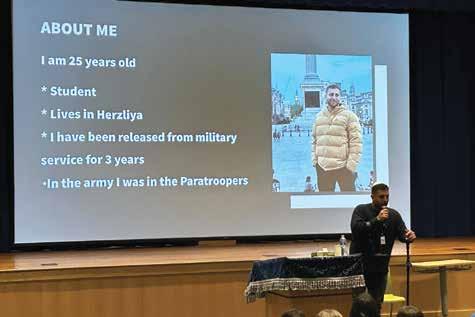
HALB Middle School students had the honor of hearing from Dvir Dangur, a chayal in the Tzanchanim unit of the IDF. Dvir was injured from an explosion that went off in a house while he was there searching for tunnels. His friend Shalev was sadly killed in that same explosion. Dvir spent 11 months in the hospital and underwent 16 surgeries. His goal now is to spread a
message of gratitude in honor of Shalev who lived his life that way. Dvir told the students to wake up, say modeh ani, and really appreciate being alive and being part of Am Yisrael. He also shared that he felt the love and tefillot from America to Israel, and we should continue davening for our brothers and sisters in Israel. Am Yisrael chai!





Less than 25 years ago, such an innocent time, when both presidential candidates were funny even when they weren’t trying to be……

“I am Al Gore. I used to be the next president of the United States of America.”
“It’s time for the human race to enter the solar system.”
“My attitude is you win some and you lose some. Then there’s that little known third category.”
“Put yourselves in my position: I flew on Airforce 2 for eight years and now I have to take off my shoes to get on an airplane.”
“I took the initiative in creating the Internet.”
“I have made good judgments in the past. I have made good judgments in the future.”
“They misunderestimated me.”
“Rarely is the question asked: Is our children learning?”

“For every fatal shooting, there were roughly three nonfatal shootings. And, folks, this is unacceptable in America. It’s just unacceptable. And we’re going to do something about it.”
“More and more of our imports come from overseas.”
“Our enemies never stop thinking of ways to harm our country and our people, and neither do we.”
“You teach a child to read, and he or her will be able to pass a literacy test.”
A politician dies and goes to heaven. He is greeted by an angel who says, “Welcome to Heaven. Before you settle in, it seems there is a problem. We seldom see a high official around these parts, you see, so we’re not sure what to do with you.”

“No problem, just let me in,” says the politician.
“Well, I’d like to but I have orders from higher up. What we’ll do is have you spend one day in in Heaven and one day in…. Then you can choose where to spend eternity.”
“Really, I’ve made up my mind. I want to be in Heaven,” says the politician,
“I’m sorry but we have our rules.”
And with that, the angel takes the politician to see both places. He is taken to the bad place first. He is greeted by another angel who shows him around. Much to his surprise, it looks great. He is in the middle of a green golf course. In the distance is a club and standing in front of it are all his friends and other politicians who had worked with him. Everyone is happy and looks great.
The politician is then brought to heaven and it’s nice too, but not as nice as the other place.
The next morning, it is time to make his choice and he decides to go to you-know-where.
Well, much to his surprise, when he returns there, it is nothing like it was before. It is a barren land covered with waste and garbage. He sees all his friends, dressed in rags, picking up the trash and putting it in black bags.
The politician runs over to the angel and screams, “What happened?”
The angel replies, “Yesterday we were campaigning. Today you voted for us!”
1. In 2000, George W. Bush won the presidential election after the “2000 Florida recount” sage. Who was the Democratic presidential nominee who ultimately lost that election?
a. Bill Clinton
b. Al Gore
c. Michael Dukakis
d. John Kerry
2. How many days did the recount go on for?
a. 13
b. 23
c. 36
d. 49
3. According to a study conducted by a number of news organizations after the 2000 election, it was concluded that Bush was the rightful winner. As the AP noted, “A vote-by-vote review of untallied ballots in the 2000 Florida presidential election indicates George W. Bush would have narrowly prevailed in the partial recounts sought by Al Gore.” How many more votes—of the more than 6 million cast in Florida— did Bush have than Gore when the official counting was done?
a. 537
b. 1,323
c. 12,916
d. 24,376
4. The term “hanging chad” became part of the news vernacular during the recount. What did that refer to?
a. There was a third-party presidential candidate in some areas of Florida by the name of Chad Cosmo Kramer. The Democrats argued that his
presence on the ballot violated federal law (because he did not meet the statewide threshold), as such, people who were given such ballots should get to cast a new vote.
b. At one voting precinct, in a heavily Democrat area, there was a vagrant named Chad who was blocking the entrance to the precinct and many people did not get to vote before the polls closed. The Democrats argued that those people should have been allowed to cast their votes after the polls officially closed.
c. Some ballots were punchcard ballots in which voters were supposed to detach a portion of the perforated paper in order to indicate who they were voting for. When the perforated paper wasn’t fully detached, election officials had to determine whether the hanging chad ballot was clear enough to indicate who the voter intended to select.
c. A full hand-recount was completed and Bush won.
d. The Florida legislature enacted a law that whoever was ahead on election day wins. Since Bush was ahead on election day, he was automatically declared to be the winner.
6. In Palm Beach County, due to “butterfly ballots” which were a confusing type of ballot it seems, one 3rd party candidate received 3,400 votes. The argument made by the Democrats is that there are a lot of elderly Jewish women in Palm Beach County who certainly did not intend to vote for this party candidate. Who was the 3rd party candidate?

Jesse Jackson
Pat Buchanan
Al Sharpton
David Duke

d. Chad was an acronym for how officials who hung up each ballot on a board were supposed to proceed. C-check; H-hand the ballot to a superior; A-ask for advice; D-determine honestly.
5. What caused the 2000 Florida Recount to come to an end?
a. Al Gore conceded the election because he didn’t want to tear the country apart.
b. The Supreme Court ruled that the recount must end. Since Bush was ahead, he won.
Ballot Card
5-6 correct: Al Gore, is this what has become of you? Reading TJH Centerfolds?
2-4 correct: Well, well, well, this is right in the middle. OK, we need a team of election officials to review where you stand.
0-1 correct: Chad! It’s you again!

By Rabbi Berel Wein
There is much comment and many different interpretations regarding the first two words of the second verse of this week’s Torah reading. The second word “lecha” – “for you” seems to be somewhat redundant in the construction of the sentence. Rashi therefore interprets it to mean “for your benefit and good.” The L-rd instructs Avraham to leave his homeland and family located in Mesopotamia in order to achieve the greatness that is inherent within him, as
the forbearer of nations and the founder of the Jewish people.
There is an alternative interpretation of the use of this second word “lecha” in the verse that has always fascinated me. Travel can be a very broadening and entertaining experience. The travel industry the world over is bourgeoning as people crave to visit unseen shores and exotic locations. So why would the travel of Avraham and Sarah from Mesopotamia to the land of Canaan be considered by Jewish


tradition to have been such a challenging test of Abraham’s faith on the Al-mighty? He simply was embarking on a travel experience and was one of many such travelers in his time and world.
The answer lies in the fact that the word “lecha” implies permanence. Abraham, you are never going to return home to Mesopotamia again. You are not a visitor, a tourist, a traveler, but you are now a refugee, an alien, and a non-citizen. And such a status in life is truly challenging and potentially dangerous. So, unlike the interpretation of Rashi, the word “lecha”
accommodate our presence. We were always a positive part of any national society we found ourselves in but at the same time we were always the odd man out. But somehow, we were able to survive this enormous test and challenge because we always believed and knew that eventually we were going to go home. We prayed for it to happen, and we struggled against all odds and enemies to make it happen. And in our time, it has happened.
This belief of the return to Zion and Jerusalem sustained us in our darkest hours. It transferred us in our minds,
We were always a positive part of any national society we found ourselves in but at the same time we were always the odd man out.
has a certain ominous characteristic to it. Abraham and Sarah were to be truly challenged by this travel experience. They were not going on vacation.
Abraham’s descendants, the Jewish people, have shared this test and challenge with him over our long history. We always were insecure and homeless during the long night of our exile and dispersal. Even countries where Jews resided for centuries, such as Spain, Germany, Poland, etc., eventually no longer would
though not in the minds of others, from the status of tolerated but unwanted aliens into mere visitors and sojourners who have a legitimate and permanent home elsewhere. This is the feeling I have every time I present my Israeli passport for inspection when I travel to a foreign destination. I am no longer a pariah, a refugee, but merely a visitor, a tourist, perhaps even an honored guest. The children of Abraham are returning home. Shabbat shalom.


By Rav Moshe Weinberger
In a way, this Shabbos is like a Shabbos Sheva Brachos for the entire Jewish people because if you count the blessings Hashem gives Avraham at the very beginning of the parsha (Bereishis 12:13), there are seven blessings. We must understand how the covenant of Avraham Avinu relates to our covenant with G-d and the covenant between a chosson and a kallah, a husband and wife.
The Midrash (Bereishis Raba 46:9) teaches, “If your children uphold circumcision, they will enter the land, and if not, they will not enter the land… Thus Hashem said to Avraham Avinu, ‘And I have given to you and your seed after you…’ (Bereishis 17:8) on condition that ‘And you shall guard My covenant’ (ibid. at 9).” The Tur at the beginning of his discussion of the halachos of bris milah (Yoreh De’ah 260) teaches this concept as well, stating that in the merit of the covenant of milah, Hashem entered into a covenant with us to give us Eretz Yisroel. But this is very difficult to understand. There are very few mitzvos that even the most non-observant Jews try to keep, but bris milah is one of them. Yet Eretz Yisroel is not truly in our hands in the way that it should be. If almost all Jews try to observe this mitzvah, why don’t we have a true hold on Eretz Yisroel?
It must therefore be that there are two aspects of the mitzvah of milah. Chazal did not say, “If your children uphold the mitzvah of circumcision…” They say, “If your children uphold circumcision.” We see that one aspect of milah is the mitzvah to physically perform the act of circumcision. That is over in a moment. The second aspect of milah is our obligation to uphold our covenant with G-d to which we commit ourselves with the mitzva of milah. This is the lifelong mitzvah of “And you shall guard My covenant.”

The act of circumcising the flesh is merely a signature, a sign of our consent to the obligation to uphold a lifelong covenant. Yet we do not merit entering Eretz Yisroel just by performing this act. We can understand this with an analogy.
Reuven signs a contract obligating him to repay a certain sum of money to Shimon over a period of time. But as time goes on, Reuven never makes any of the payments under the contract. When Shimon approaches him about this, he answers, “That’s my signature on the document. I have fulfilled all of my obligations by signing. I stand by my signature, but that does not obligate me to do anything further!”
We can all see that Reuven’s claim is patently ridiculous. The whole point of a contract, a covenant, between two parties, is that the parties fulfill the obligations outlined in the agreement over time. A signature is not the end of one’s obligations. It is only the beginning. A
signature without the intent to fulfill the obligations embodied by that signature is a completely empty gesture. Similarly, circumcision is the “sign of the covenant between Me and you” (Bereishis 17:11). It is our signature, obligating us to fulfill our obligations to Hashem over time. It is only a sign of the covenant, but it is not the be-all and end-all of our fulfillment of the covenant itself.
These two aspects of the mitzvah of milah are reflected in the two blessings we say at a bris. The first bracha thanks Hashem for sanctifying us with His mitzvos and commanding us “regarding circumcision.” This bracha relates to the one-time physical act of circumcision. The second bracha thanks Hashem for our obligation “to bring [the child] into the covenant of Avraham Avinu.” The first element relates to a mitzvah that is over in a moment. But guarding the “covenant of Avraham Avinu” involves changing how one views his entire life.
It is a life in which one is always conscious of not desecrating the sanctity of his covenant with G-d.
In the words of the Seforno (Bereishis 17:11), the bris is an “eternal reminder to go in His ways like the sign of a master on his servant.” Through the covenant on our flesh, Hashem whispers to us at work, on the train, in the street, and while we are sitting at the computer, “And you shall guard My covenant.” Guarding the covenant means always looking for ways to sanctify everything associated with the part of the body on which Hashem has sealed His covenant with us. If we live a life in which we guard the sanctity of the covenant, it is a completely different life. It is a life with which we merit to enter into Eretz Yisroel, into the palace of the King, the land of true life.
This type of covenant exists in the relationship between a husband and wife as well. The first Mishna in Kiddushin says there are three ways one can betroth his wife, but our custom is to use a ring for betrothal. In explaining this (Even Ha’Ezer 27:1), Rav Moshe Isserles, zt”l, the Rama, writes, “And therefore we have the custom to betroth with a ring, and the reason is explained in the Tikunei Zohar (5).” Although he was a great kabbalist, the Rama almost never quotes the Zohar in his emendations to the Shulchan Aruch. We therefore see that the ring has a very deep significance. The Sefer Hachinuch, however, offers a simple explanation (Mitzvah 552). By using a ring, the wife always carries something with her to remind her that she is a married woman. If her husband used money to betroth her, the money would be spent right away and nothing would remain to remind her of her special relationship with her husband.
Marriage is a covenant. The chasuna,
the wedding ceremony, is the initial act of entering into the covenant, but it is only the beginning. Marriage is a commitment between the chosson and kallah in which they tell each other, “And you shall guard My covenant.” We see the ring serving as a reminder of the connection between two sides in other places as well. The Mishkan, the resting place of the Divine presence within the Jewish people, contained beams, kerashim. And each beam had rings. The word for beam, keresh, has the same letters as the word for connection, kesher. A ring is used to remember the connection between a husband and wife and between the Jewish people and Hashem. The last prophet in Tanach even says in his last prophecy (Malachi 2:14) that marriage is a covenantal relationship: “She is your companion and the wife of your covenant.” A life in which one remembers and guards his covenant with Hashem and with his wife is completely different from one in which he views his bris milah and his wedding just as bygone events from his past, mitzvos he long ago checked off of his to-do list.
Every morning, a Jew wraps his tefillin strap around his finger like a wedding ring and says, “And you are betrothed to Me forever. And you are betrothed to Me with righteousness, with judgment, with kindness and with mercy and you are betrothed to Me with faithfulness.” Hashem is reminding us, “We are committed to each other. Remember to guard My covenant!” That covenant is forever. We use a ring to remember it because a ring is round and has no end, just like our commitment to G-d and our covenant with our husband or wife is forever.
The sefer Chupas Chasanim is very worthwhile to learn before a chasuna. He explains why we have the custom that the chosson puts the ring on his kallah’s forefinger and why the ring is made of gold. He quotes the following pesukim (Tehillim 19:8-11): “Hashem’s Torah is perfect, restoring the soul, the testimony of Hashem is trustworthy, making the simple one wise. The laws of Hashem are straight, gladdening the heart. The commandment of Hashem is clear, enlightening the eyes. The fear of Hashem is pure, standing forever. The judgments of Hashem are true, altogether just. More desired than gold and fine gold and are sweeter than honey and the dripping of honeycombs.” He points out that if one counts each word of these pesukim starting with the thumb on each hand, the word “Hashem” is always associated with the forefinger except for the last time, when
the word “gold” is associated with the forefinger. It is like the kallah, when she holds out her forefinger, is pointing to G-d, saying, “Remember your relationship with Hashem, and with this gold ring that you are giving to me, always remember your relationship with me.”
Everywhere a Jew goes, he must ask
to officiate. As he was holding the cup of wine, ready to start the brachos, the Gra stopped and turned to the chosson and said, based on the Gemara in Kiddushin (41a), “It is forbidden to betroth a woman without seeing her.” Under the circumstances, the halacha is that a blind man may marry a woman without seeing
meritorious in that the first thing you saw in your life is your kallah’s face. May you always only see her.”
If we live a life in which we guard the sanctity of the covenant, it is a completely different life.
There was an old song from a previous incarnation, “I only have eyes for you.” That is how we must approach our commitment to Hashem and our wives and husbands. As we live a life always working to fulfill our covenant with Hashem, we say, “I only have eyes for You, Hashem.” And by guarding our covenant with G-d, we also guard our covenant only to have eyes for our husbands and wives.
himself whether he is upholding the covenant of Avraham Avinu. If a woman at work starts talking with him and telling him all of her problems, what is he thinking? Is he thinking, “I am a married man. I am in a committed relationship with my wife and with G-d.” Is he ensuring that he is upholding the covenant when he looks at his computer, iPhone or Android device?
Our efforts to guard the covenant with G-d truly sum up our goals in life. We want Hashem to be able to say about us at the end of our lives, “And You found his [Avraham’s] heart faithful before You (Nechemia 9:8).” As the Malbim explains on that pasuk, “After all of the tests with which Avraham was tested and which he passed, his heart was found to be faithful.” He guarded his covenant with G-d despite all of his tests and all of the difficulties.
One of the most well-known stories of the Vilna Gaon, the Gra, took place in front of the entire community and was so famous that it was recorded in the city records of Vilna. While the Gra’s whole life was Torah, the one practical mitzvah he was involved with was ensuring that orphans, boys or girls who had lost one or both parents, were able to get married. He involved himself in making matches, and the only time he left his home was to officiate at the weddings of these orphans. One time, he made a match between a beautiful young woman who had lost one of her parents and a very talented yeshiva boy who was also an orphan. But this boy was blind from birth. The girl’s surviving parent was completely against the match, but the young woman said that if the Gra suggested it, the match must be G-d’s will. So she agreed to the match. Despite her family’s opposition, the wedding went forward and the Gra went
her. But despite his obvious knowledge of this exception, the Gra still said what he said. Everyone present was flabbergasted and began crying at the pain the chosson must have felt hearing the Gra’s words. But the Gra took the young man’s head and turned it toward his bride. He opened his eyes and was able to see his kallah’s face. While everyone was overcome with emotion, the Gra told him, “This did not happen because of me. It happened in the merit of your kallah’s faith. You are
In the merit of each of us upholding the covenant between the Jewish people and Hashem and the commitment between every chosson and kallah, may we merit to truly return in the fullest way to Eretz Yisroel and the ultimate reunification with Hashem and with each other when we will experience (Yirmiyahu 33:11) “the sound of happiness and the sound of joy, the voice of the groom and the voice of the bride” with the coming of Moshiach, may it be very soon in our days.
Rav Moshe Weinberger, shlita, is the founding Morah d’Asrah of Congregation Aish Kodesh in Woodmere, NY, and serves as leader of the new mechina Emek HaMelech.

By Rabbi Avrohom Sebrow
Daf Yomi learners have become very familiar with the Rashbam. His commentary replaced Rashi’s for most of Bava Basra.
At the end of Eruvin, the Mordechai (528) recounts an interesting incident involving the Rashbam. The Rashbam, known for his pious demeanor and unwavering humility, consistently kept his gaze lowered as a mark of his restraint and focus on spiritual matters. On one particular day, he was about to board a horsedrawn wagon, which also included a mule in the team, a scenario that presented a significant issue in Jewish law. The riding of such a mixed team would violate the prohibition against klayim, a term that refers to the prohibition against mixing different species in acts of labor.
The Mordechai ponders whether this particular violation fell under the category of a Torah commandment or was merely a Rabbinic caution.
Just at the moment when the Rashbam was about to step into the wagon, divine providence intervened in a remarkable way. His younger brother, Rabbeinu Tam, who was fifteen years his junior, fortuitously arrived on the scene. Recognizing the imminent mistake, Rabbeinu Tam promptly stepped forward to prevent his brother from boarding the wagon.
With a blend of concern and brotherly admonition, Rabbeinu Tam chastised the Rashbam for his lack of vigilance. He emphasized the importance of being aware of one’s surroundings, expressing that the Rashbam’s commendable habit of keeping his eyes downcast – though rooted in humility – nearly led him into a significant halachic transgression. Rabbeinu Tam cited a well-known verse from Koheles, cautioning, “Don’t be a big tzaddik!” This advice served as a reminder that excessive piety can occasionally lead one astray. Thus, the encounter between the siblings not only highlighted a critical lesson in mindfulness but also underscored the intricate balance between piety and practicality in religious observance.

Rav Nosson Gestetner, zt”l, wondered what was the Rashbam’s rationale for not being careful. Granted, it could be argued that a horse and mule pulling a wagon is uncommon. Perhaps, generally, one need not be concerned about unusual occurrences. Still, someone of the Rashbam’s stature should presumably have been more stringent with himself. Rav Nosson suggested that the answer lies in the Rashbam’s commentary on Bava Basra (133b).
Rav Ilish offered his opinion on a halachic question. Rava, however, disagreed and conclusively disproved Rav Ilish’s answer. Rav Ilish was embarrassed. He figured that Rava would now assume that Rav Ilish could not be relied upon for correct rulings. The one time that Rav Ilish issued a ruling in front of Rava, it was the incorrect one!
Rava, sensing Rav Ilish’s embarrassment, appeased him by quoting the pasuk: “I, Hashem, will hasten it in its
time” (Yeshaya 60:22). The Rashbam explains that Rava’s take on the incident was the exact opposite of what Rav Ilish was thinking. Of course, Rav Ilish always issued correct rulings. The one time he was about to err, Hashem ensured that Rava was around to correct him. This is how Hashem deals with tzaddikim, ensuring that when they require assistance, that assistance is nearby. So, too, Rav Nosson theorized, the Rashbam felt he could rely on Hashem’s protection. Halachically, he need not have been concerned for the unlikely possibility that a horse and a mule were pulling the wagon. Therefore, he could maintain his holiness by gazing only at the ground. He would rely on Hashem’s protection for the extra stringency of being concerned with uncommon possibilities. However, that leaves the issue of why Rabbeinu Tam admonished his older brother, who seemed to have a well-grounded philosophy. Rav Nosson
pointed to a Tosfos in Shabbos. The Gemara in Shabbos (12b) relates that Rebbe Yishmael was learning by candlelight on Shabbos. He became so engrossed in his Torah learning that, forgetting it was Shabbos, he manipulated the wick. Rebbe Yishmael wrote a reminder in his notebook that when the Beis HaMikdash is rebuilt, he will bring a Korban Chattas for inadvertently violating Shabbos. Tosfos notes that we find that Hashem even protects the animals of tzaddikim from “sinning.” For example, the donkey of Pinchas Ben Yair would not eat grain that wasn’t appropriately tithed. So how could it be that Hashem allowed Rebbe Yishmael to sin inadvertently? Rabbeiu Tam answers that the exceptional Divine Protection granted to tzaddikim to prevent them from sinning is limited to consuming forbidden foods. Hashem will save a tzaddik from eating non-kosher food by mistake. However, the exceptional Divine Protection does not extend to other inadvertent sins. Therefore, Rav Nosson explained, Rabbeinu Tam admonished the Rashbam according to his own opinion. Rabbeinu Tam is of the opinion that there is no extra Divine Protection offered to tzaddikim against the aveira of klayim. Therefore, he held that the Rashbam should have forgone his extra stringency of always gazing downwards. Instead, he should have been stringent and been concerned about unlikely occurrences of klayim, of a horse and a mule pulling a wagon. The Rashbam, for his part, disagreed. He kept his gaze downward. He felt that he could rely on Hashem for special Divine Protection even for unlikely occurrences of klayim. Rabbi Avrohom Sebrow is a rebbe at Yeshiva Ateres Shimon in Far Rockaway. In addition, Rabbi Sebrow leads a daf yomi chaburah at Eitz Chayim of Dogwood Park in West Hempstead, NY. He can be contacted at ASebrow@gmail.com.

By Rabbi Yair Hoffman

What follows will probably be a rather controversial topic.
The author invites comments because it may make for some serious differences in halachic observance. One such difference involves the many details in the mitzvah of sukkah.
This article can be divided into three parts. The first part of this article is a social behavior observation that few people will find controversial. It involves whose view is followed.
Eretz Yisroel Observance
Generally speaking, Torah observant Jews living in Eretz Yisroel observe one of three tefach measurements:
1) Rav Chaim Na’eh, zt”l: 8.0 centimeters or 3.15 inches
2) The Chazon Ish, zt”l: 9.6 centimeters or 3.78 inches
3) A Combination: 8.0 CM and 9.6 CM, whichever is more stringent for each halachic topic
Very few Torah observant Jews living there give significant weight to the view of Rav Moshe Feinstein, zt”l, that the tefach is 3.54 inches or 9 centimeters.
American Observance
Many Torah observant Jews liv -
ing in America considered Rav Moshe Feinstein, zt”l, as the posek of America. As such, these communities gave more weight to the view of Rav Feinstein than that of the two other poskim. Of course, many communities also employed some sort of combination – mostly Rav Moshe and Rav Na’eh – whichever is more stringent for each halachic topic, or even all three views whichever is more stringent for each halachic topic.
Do we assume that the general population of Jews living in the time of the first Beis HaMikdash observed halacha? Most specifically, do we assume this to be true in terms of tumah and tahara? I would like to assume that most Torah observant Jews in both America and Eretz Yisroel would agree to that supposition.
Next: do we assume that the general population of Jews living in the time of the first Beis HaMikdash liked to save money? Let’s assume that they did.
Most of us put away the milk container back into the refrigerator after we make our coffee in order to avoid bacterial contamination of the milk.
Although there are debates between the Rambam and the Rash (not the
Rosh) as to the nature of impurity when dealing with an opening less than a tefach, the vast majority of commentaries understand that when the opening of a storage vessel is less than a tefach in width and length and thus circumference, the impurity is either prevented or limited in some way.
It seems pretty clear that if the opening of the containers were larger than that of a tefach, it would subject the contents of the containers to the dangers of becoming tamei, spiritual contamination.
A number of years ago, archaeologists measured the circumference of various ceramic containers during the time of Dovid HaMelech. They discovered that all of them – without exception – had openings between 3.48 and 3.53496 inches. See https://huji.org.ar/ wp-content/uploads/2020/10/Karasiket-al-2020.pdf
This discovery is uncanny. The top figure is exactly that which Rav Moshe Feinstein, zt”l, says!
Why this may be controversial is that some may argue that archaeology has no place in terms of the determination of halacha. Others, of course, argue
with this idea – including some major poskim of the last generation. Another issue is whether the researchers have ne’emanus, credibility, in this area.
If we accept the archaeological findings, it seems clear that the most precise measurement for the tefach is that of Rav Moshe Feinstein, zt”l. That would mean, for example, that if someone wanted to sleep in a sukkah under a table, the table height should be under 35 inches. The Rav Chaim Na’eh measurement is too stringent and the Chazon Ish measurement would be halachically invalid.
A number of years ago, I spoke to a number of America’s poskim to ask whether we should push the view of Rav Moshe’s, zt”l, shiur tefach in America since he was considered by so many as America’s foremost posek. Most of them responded affirmatively. Perhaps we should push this view in Eretz Yisroel as well.
This article should be viewed as a halachic discussion and not practical advice. The author can be reached at yairhoffman2@ gmail.com.

As a lifelong educational professional, finding community in schools and being affiliated with sterling institutions was always the goal that guaranteed my many joyful years in the workplace.
That’s the way it was for me and in particular with the Yeshivah of Flatbush. I spent 24 wonderful years teaching and supervising while our three children learned to read, develop academic skills in Judaic and secular studies, and, most of all, developed their deep love for Torah and a strong committed connection to Israel.
To this day, Flatbush is my favorite school world. I can’t speak for all, but there is something about Flatbush that bonds those who have had the privilege to work, study, and grow there. From the moment that I walked through the door almost 50 years ago, the warm vibe that greeted me screamed excellence.
I loved my colleagues, my families, and my students.
A love for the country and the state of Israel is the bread and butter at the Yeshivah’s core values. Not long ago, watching as the endless days of war relentlessly moved on, our son Dov commented as the losses of the chayalim mounted. He noted that the soldiers with American parents may be the products of Flatbush dreamers who felt the call to make Aliyah because

By Barbara Deutsch

Sgt.
that’s what they heard in their classrooms every single day.
He was right.
War is bad. War in a small country with a polarized political population is particularly hard.
When I flew out of a golf cart in Camp Morasha many years ago, I made a lifelong friend with whom I have re-bonded with in Israel. Anna’s nursing skills treated my hand and elbow, and her sense of humor healed my soul.
One of her sons, Ari, went back to his unit this week – again! I called her after chag to see how she was doing.
this as you find your aliyah mojo. I have put my work on hold and am reading a lot. Will be back in the saddle in a few days, I hope. Ari (her son) is in the front lines in Sajiya, Gaza. Need to keep positive.”
I never knew Anna to lose her sense of humor; she is always thinking of others before herself.
Sammy Harari, a Yeshivah of Flabush boy, a lone soldier, knew from the minute he could that he was going to make aliyah and become a chayal. He married, fathered three children and defended his country. When the news of his passing electrified the Flatbush family hotline,
“I am so sick about it, as I feel the loss of anyone. Funerals, shivas…I am heartbroken.”
“My head is off these days,” she wrote. “We lost five chayalim from our neighborhood in the last 48 hours, 11 from Zevi’s high school, and almost lost two Golani boys that grew up in my house. I am so sick about it, as I feel the loss of anyone. Funerals, shivas…I am heartbroken.
“I did not want to burden you with all
lines filled with Flatbush mourners came to pay their respects for their brave hero.
I never taught Sammy; I did teach his sister and older brother. Jill, my dear friend, colleague, and my keeper of the Flatbush flame, said, “Go!” I have a thing about going to shiva houses where I don’t really know the person or the family of the
person who passed away. What’s my reason for being there? What do I bring to the bereaved? I was wrong. The minute the Harari mourners saw my face, they smiled widely. That’s it – I said what I had to say and left. The fact that someone takes the time for a shiva call, that moment that it takes to show that the family respect is enough; the gesture is cherished by the mourners.
Rabbi Dr. Raymond Harari is gone; a humble, brilliant and kind educator. Rabbi Harari served as the Head of School of the Yeshivah of Flatbush, was a renowned community rabbi, a teacher of many, my children’s teacher, and a friend. His passing sent giant ripples throughout the core of the Yeshivah community.
Rabbi Harari was an important contributor to why Flatbush is my favorite school, home, and community. So many gone, so much loss; waiting for it to stop.
Barbara Deutsch is the former associate principal at HANC, middle school principal at Kushner, and Dean of Students at Yeshiva of Flatbush. A not-retired educator, she is trying to figure out life in Israel through reflections on navigating the dream of aliyah as a wife, mother, grandmother, great-grandmother and friend.


Life in pastoral, verdant Western Galil is very different from living in Jerusalem, where we currently reside. For example, whereas traffic congestion exists up north, you don’t run into the expected and annoying frequency that you do in the capital. During the 11 years we lived in Ma’alot-Tarshicha, I rarely took public transport. The car was a necessary luxury.
During our first few months in Jerusalem, I oftentimes became overwhelmed by the perpetual traffic and my inability to easily find parking. Twice during that time, I was fined for illegally leaving my car in spots I had believed to be legal.
I changed my outlook on life. Since last December, I’ve been a regular customer of public transportation. I bus to the city. I bus and train to work. It is comforting knowing the congestion on the roads is not my problem. I can sit back and enjoy the ride. Most importantly, I get home – as I get to work – relaxed.
It is true that one is more of a king in a car than a bus, especially when the doors open and the body heat from scores of schoolchildren and the accompanying noise greet you like a slap on the face. It is, however, a small price to pay.
There is no monetary transaction made upon alighting public transportation in Israel. Instead, one of two methods is used: scanning a barcode via a mobile app or using what is called a RavKav, a credit card-sized card you fill with funds and, upon entering the vehicle, tap it on an onboard device reader.
It is not an honor system. The bus and trains consortiums take steps to protect their interests. For one, intercom announcements are frequent. The message is straightforward; one must validate a card even when transferring from one mode of public transport to another; the system allows travelers to pay only once within an hour and a half period, regardless of how many transfers are made. Finally, passengers are warned of steep fines if their cards aren’t validated.
By Rafi Sackville

The system is open to the abuse of freeloaders, which is why passengers are used to inspectors randomly alighting and disembarking on buses and trains.
In 2023, almost a quarter of a million people were fined for not paying fares. This resulted in collected fines totaling almost 25 million shekels. While not uncommon to see bus inspectors at work, it
the card?” she asked over and over. The inspector ran her card through his device and printed out a fine. Now, according to law, passengers do not have to provide personal identification. However, many citizens aren’t aware of the law and, like this particular woman, presented hers.
As her fine was being printed, she began to verbally abuse the inspector with a
It is comforting knowing the congestion on the roads is not my problem.
is telling that on certain lines they more often than not work in teams of up to three. I didn’t quite understand why until, within the course of a week, I witnessed what they have to deal with.
The first occasion involved a young woman who, when approached by an inspector to validate her card, quickly blurted out, “I have money on it.” Why hadn’t she validated? she was asked. “Why would I not validate if I have money on
venom of an angry sports fan. Like many of my fellow Israeli citizens, she yelled most of her criticism, making it impossible to ignore. I had observed on her face an initial confidence of defiance that very quickly turned into uncontrollable anger. This drew the attention of the other two inspectors working the aisle. They quickly came to his side to defuse the situation if need be.
Their weight of numbers did nothing
to prevent the woman’s rant from going up a notch. “You are EVIL,” she screamed over and over. It was painful and embarrassing to witness. Just swipe your card, I kept on thinking to myself.
The same story occurred later that week. Another passenger, another unpaid fare, another rant and rave about how evil people (inspectors) can be. It was draining. I felt as if I had been unfairly dragged into fights I had never wished to witness.
As for the inspectors, they maintained a restrained calm both on the bus and off it, where I followed them. I asked them about unruly and rude passengers and if what I had seen was the norm. They told me it was. They also said they had been trained for precisely these kinds of situations.
I happened to get onto a connecting bus with them headed to the hi-tech park on the way to Ramot.
Loitering in the middle of the bus were two teenagers. They immediately noticed the alighting inspectors. It was a double bus. They moved towards the back exit. By this time, the inspectors were methodically checking tickets and moving at a steady pace towards the two boys. Noticing this, the two boys rang the bell and got off at the next stop before the inspectors could get to them.
I could see they had no desire for the chase. It’s just another game of cat and mouse.
Dear readers, a few weeks ago I wrote a story about Ma’oz Felafel in Yerushalayim. In it, I mistakenly reported that the owners were planning to sell the business. I have since been assured that this is not the case. Their business will remain open for you to enjoy the delightful taste of their falafel and shwarmas.
Rafi Sackville, formerly from Cedarhurst, teaches in Yeshivat Horev in Yerushalayim.


By Hershel Lieber

It was in late October 2004 when we traveled to Las Vegas, Nevada. Our goal was to spend a few days with my mother’s brother Ben and his wife Jean. Ben, who just celebrated his ninety sixth birthday on October 18, 2024, lost his life partner Jean about three years
ago. Ben was very close to my mother, a”h, although their lifestyles differed greatly. I am close to Ben as well, and we speak almost monthly since my mother was niftar in 2014.
Ben and Jean lived in Los Angeles for most of their lives where they raised
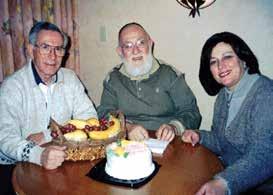
their two daughters, Sherry and Gail. When they retired, they followed a trend of many seniors and moved to Las Vegas. Ben is still extremely active in his organization, Zachor, and speaks frequently about promoting Holocaust remembrance and education.
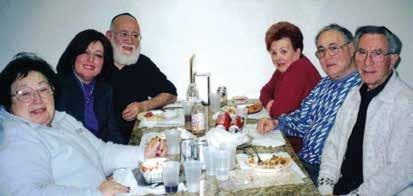
When we arrived late Sunday afternoon, Ben and Jean picked us up at the airport, and we headed to their beautiful home in Sun City, a retirement community. After freshening up, we went out to eat at Haifa Restaurant with their friends, Leo and Marilyn Soroka. Then we drove back home, passing the famous “Strip” which is lined with famous hotels and their gambling casinos. Each hotel has its own theme, some resembling famous iconic European cities like Paris and Venice and the Roman Forum. They are opulent and luxurious and cater to addicted gamblers as well as to regular tourists. The Strip is famous for its over twelve million lights which turn night into day! We just saw the outside displays, but we understood that the interiors were even plushier and most likely gaudier than the exteriors.
Monday was a very relaxing day. Ben and Jean had shopped for food at Smith’s Kosher Experience where they were able to obtain cholov Yisroel and pas Yisroel products for us. Our breakfast was a lavish affair, as was our lunch. We sat near their private, heated pool, but the air was too cold to go for a dip and sit in the sun. What we enjoyed most was connecting with Ben and Jean, just talking about family and recollecting memories from the past. His early childhood in Munkatch and Krakow as well as his terrifying World War II experiences are subjects that he recounted in detail. His post-war chance encounter with my mother in Germany was nothing short of a miracle. All of these stories were included in both of their autobiographies. When I was a one-year-old baby who just arrived after the war from Germany in February 1947, we lived in Williamsburg, Brooklyn. Ben, who came to the U.S. seven months later, was my trusted babysitter who soothed me to sleep by singing Yiddish lullabies. I do not really remember that, though I do remember that right after Ben and Jean married in California in the summer of 1950, they came for a Shabbos to the farm that my cousins the Scharfs had in Frenchtown, New Jersey. There we celebrated a sheva brachos in



their honor. I was just four and a half years old then.
On Tuesday, we rented a car and headed out to Zion National Park in Utah. Our drive, which passed through Northwest Arizona, was spectacular. We stopped lit-
erally dozens of times to take photos. The mountains, the peaks and the desert with its cactus plants were mindboggling. We hadn’t even reached Zion National Park, and we were already overwhelmed with the natural beauty that surrounded us. When we arrived, we checked into a Best
Western on the edge of Zion, davened, ate supper, and made an early night.
On Wednesday, we drove into Zion! It was not our first encounter with desert wilderness; we had been in Palm Springs, California, a number of times between 1988 and 1991. It was also not the first


time we visited a national park; we had explored Acadia National Park in Maine in 2002. But Zion was truly something else! I still am hard-pressed to describe the majestic wonder that greeted us as we drove along Canyon Scenic Drive viewing Hashem’s handiwork. Every few feet we stopped to gawk at the unusual formations of mountain peaks and a terrain interspersed with desert plants and bushes amidst rock and boulders. The desert colors kept on changing with the sun’s position in the sky. From crimson red to shades of orange interspersed with hues of yellow and brown, the green desert shrubs and the prickly pear cacti stood out in contrast to the ever-changing color scheme. The distinguished steep red cliffs formed an imposing background along the road. Forest trails led to the Virgin River, which flowed into the Emerald Pools that are surrounded by waterfalls and a hanging garden. We took a two-mile trail and were rewarded with more stunning scenery. A section of the magnificent cliffs are called the “Three Patriarchs” since they form three distinct mighty formations.
There are a number of “not to miss” sights in the Park, and we did not get to see all of them, since it would involve rigorous hiking, which we were not able to

do. The photos we took were quite good, but they did not do justice to the magnitude of splendor that we encountered. We spent six hours in the Park and followed it up with an IMAX film about the Park’s When we returned to Las Vegas, Ben

coffee. Then we headed off to the Hoover Dam which is in Arizona on the border of Nevada. The Dam is concrete, arched and sixty stories high. It is located in the Black Canyon and controls the flow of the Colorado River. It was built between 1931
I still am hard-pressed to describe the majestic wonder that greeted us as we drove along Canyon Scenic Drive viewing Hashem’s handiwork.
and Jean surprised us with a key to the Suncoast Hotel for two nights. This was in honor of Pesi’s upcoming birthday. We first ate our packaged kosher dinner and headed to the hotel with Ben and Jean. When we entered our room, there was a beautiful birthday cake, a fruit platter and drinks on the table. Ben and Jean joined our celebration, and we were touched by the warmth and thoughtfulness that they showed to us.
Thursday was our final day in Las Vegas. We went to the café at Smith’s where they had a section called The Kosher Experience. We met Ben there and shared some great bagels with cream cheese and

and 1936 during the Great Depression with the backing of President Franklin D. Roosevelt. The purpose was to control flooding and provide irrigation water and hydroelectric power. We took a tour of
this massive monument to man’s ingenuity and were surprised how fascinated we were with Hoover Dam’s history and its benefit to mankind. We were also awed by its dimension and massiveness.
We returned to Vegas and went to Chabad for Mincha/Maariv where I met Rabbi Shea Harlig, the shliach, and then we joined Ben and Jean and their friends, the Sorokas, for dinner at Adar Pizza. The food was delicious, and the company was great. We spent over two hours together just shmoozing. We then headed back to our hotel where we polished off the remnants of Pesi’s birthday cake. We retired early since the next morning we were traveling to San Francisco where we would stay from Shabbos through Monday.
Yes, Zion was stunning and Hoover was awesome, but spending time with Ben and Jean was the best of all!
Hershel Lieber has been involved in kiruv activities for over 30 years. As a founding member of the Vaad L’Hatzolas Nidchei Yisroel he has traveled with his wife, Pesi, to the Soviet Union during the harsh years of the Communist regimes to advance Yiddishkeit. He has spearheaded a yeshiva in the city of Kishinev that had 12 successful years with many students making Torah their way of life. In Poland, he lectured in the summers at the Ronald S. Lauder Foundation camp for nearly 30 years. He still travels to Warsaw every year – since 1979 – to be the chazzan for Rosh Hashana and Yom Kippur for the Jews there. Together with Pesi, he organized and led trips to Europe on behalf of Gateways and Aish Hatorah for college students finding their paths to Jewish identity. His passion for travel has taken them to many interesting places and afforded them unique experiences. Their open home gave them opportunities to meet and develop relationships with a variety of people. Hershel’s column will appear in The Jewish Home on a bi-weekly basis.
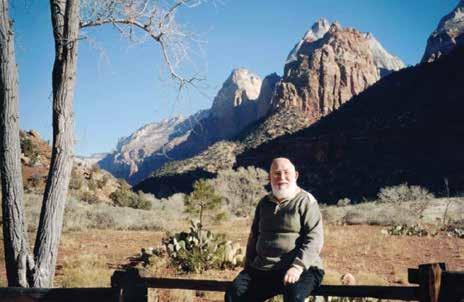


By TJH Staff
In a surprising landslide, Donald Trump handily won the 2024 presidential election on Tuesday, mounting the most momentous comeback in political history. Republicans now control the House and Senate, as the country was painted red on Tuesday night with decisive wins by the GOP in key states.
In a deeply divided nation, voters embraced Mr. Trump’s pledge to seal the southern border, to revive the economy with 19th-century-style tariffs that would restore American manufacturing, and to lead a retreat from international entanglements and global conflict.
Trump is the first president since Grover Cleveland in the late 1800s to have sat in the Oval Office, lost a reelection, and then mount a successful run. He is also the oldest person to have been elected president of the United States, winning the election at the age of 78.
As of Wednesday morning, not all states had counted all their votes. Still, by 2 a.m. on Wednesday morning,
the Associated Press called the election for Trump, as Trump came in with the 270 electoral votes needed to win the presidency. He had earned stunning victories in North Carolina, Pennsylvania, Wisconsin and Virginia, guaranteeing him an electoral triumph. He is set to win the popular vote as well, the first Republican to do so in 20 years.
In his victory speech at Mar-a-Lago resort in the early hours of Wednesday, Trump vowed to “heal” the nation, fix the border fiasco, and deliver a strong and prosperous economy.
“I want to thank the American people for the extraordinary honor of being elected your 47th president and your 45th president,” said Trump. “This will truly be the golden age of America.”
He praised his running mate, JD Vance, in the speech as well.
“He turned out to be a good choice. I took a little heat


at the beginning, but I knew in my brain that he was a good one. About as good as it gets,” he said. “And we love the family. And we’re going to have a great four years, and we’re going to turn our country around, making something very special.”
Vance, in his speech, said, “I appreciate you allowing me to join you on this incredible journey. I thank you for the trust, the place to me. And I think that we just witnessed the greatest political comeback in the history of the United States of America. Under President Trump’s leadership, we’re never going to stop fighting for you, for your dreams, for the future of your children. And after the greatest political comeback in American history, we’re going to lead the greatest economic comeback in American history.”
Trump told the audience, “This was, I believe, the greatest political movement of all time. There’s never been anything like this in this country, and maybe beyond. And now it’s going to reach a new level of importance because we’re going to help our country heal.
“We’re going to help our country here. We have a country that needs help, and it needs help very badly. We’re going to fix our borders. We’re going to fix everything about our country, and we’ve made history for a reason tonight. And the reason is going to be just that. We overcame obstacles that nobody thought possible.”
Trump told Americans across the nation, “Every citizen, I will fight for you, for your family and your future. Every single day, I will be fighting for you. And with every breath in my body, I will not rest until we have delivered the strong, safe and prosperous America that our children deserve and that you deserve. This will truly be the golden age of America. That’s what we have to have. This is a magnificent victory for the American people that will allow us to make America great again,” he said. Trump was flanked by his family while addressing his supporters, including former first lady Melania Trump and son Barron Trump. The president-elect invited UFC CEO Dana White to speak on stage and gave shout outs to Elon Musk , as well as professional golfer Bryson Dechambeau.
Vice President Kamala Harris did not concede on Tuesday night. Her campaign announced that she would not be speaking that night and would address the nation on Wednesday.
Harris’ campaign’s co-chair, Cedric Richmond, delivered brief remarks.
“We still have votes to count, we still have states that have not been called yet. We will continue overnight to fight to make sure that every vote is counted, that every voice has spoken. So you won’t hear from the vice president tonight. But you will hear from her tomorrow,” Richmond said.
Israeli Prime Minister Benjamin Netanyahu was one of the first world leaders to congratulate Trump on his stunning political comeback victory on Wednesday.
Bibi wrote on X, “Dear Donald and Melania Trump, Congratulations on history’s greatest comeback! Your historic return to the White House offers a new beginning for America and a powerful recommitment to the great alliance between Israel and America. This is a huge victory! In true friendship, yours, Benjamin and Sara Netanyahu.”
French President Emmanuel Macron and Hungarian Prime Minister Viktor Orban also tweeted their congratulations, as did British Prime Minister Keir Starmer and the leaders of Germany, El Salvador, India, and Australia. Ukrainian President Volodymyr Zelenskyy wrote on X, “Congratulations to @realDonaldTrump on his impressive election victory! I recall our great meeting with President Trump back in September, when we discussed in detail the Ukraine-U.S. strategic partnership, the Victory Plan, and ways to put an end to Russian aggression against Ukraine.”
He added, “I appreciate President Trump’s commitment to the ‘peace through strength’ approach in global affairs. This is exactly the principle that can practically bring just peace in Ukraine closer. I am hopeful that we will put it into action together. We look forward to an era of a strong United States of America under President Trump’s decisive leadership. We rely on continued strong bipartisan support for Ukraine in the United States. We are interested in developing mutually beneficial political and economic cooperation that will benefit both of our nations.”
It wasn’t just the White House that Republicans took in this week’s election. The GOP took back the Senate majority that they held during Trump’s first term but lost when he was defeated in 2020.
Democrats entered the 2024 election cycle with only one or two seats to spare — and an all-but-impossible map to defend, with three seats in deep-red states
on the ballot. Republicans won all three of those races. West Virginia Sen. Joe Manchin’s retirement effectively guaranteed Republican Jim Justice’s win there. Montana Sen. Jon Tester lost to 38-year-old former Navy SEAL Tim Sheehy. Ohio Sen. Sherrod Brown fell short against businessman Bernie Moreno.
Sen. Deb Fischer tightly held onto her seat in Nebraska.
Democrats hoped a long shot would materialize — longing for a win by Rep. Colin Allred against Texas Sen. Ted Cruz or that former Rep. Debbie Mucarsel-Powell could buck Florida’s rightward trend and beat Sen. Rick Scott. Neither came close.
Three Senate races in the Great Lakes battleground states of Michigan, Pennsylvania and Wisconsin were also neck-and-neck. Their outcome will determine the size of the GOP majority.
With Mitch McConnell retiring from his position as party leader, Republicans are bracing for a battle on whom to fill his seat. Texas Sen. John Cornyn and South Dakota Sen. John Thune are the two top contenders
When it comes to the House, with votes still being counted on Wednesday morning, it looked like the Republicans were going to come out on top.
Locally, Rep. Anthony D’Esposito lost his seat in the 4th District in Nassau County to Democrat Laura Gillen. Rep. Tom Suozzi, a Nassau County Democrat, bested Republican Michael LiPetri, in the 3rd District, which includes part of Queens. Rep. Gregory Meeks, of the 5th Congressional District, earned 69% of the vote. Rep. Grace Meng, in Queens, won over her Republican opponent.
Incumbent Republican Rep. Mike Lawler handily defeated former Democratic Rep. Mondaire Jones by at least 16 points in the 17th District, covering parts of Westchester, Rockland and Putnam counties. Republican Rep. Nick LaLota defeated Democrat John Avlon, a former journalist and CNN commentator, by at least 11 points in the 1st District covering Suffolk County.
State Senator Patricia M. Canzoneri-Fitzpatrick kept her seat in the state senate race against James Lynch in the 9th District.
New York Assemblymember Ari Brown came in with a decisive victory, nabbing more than 62% of the vote on Tuesday. In Far Rockaway, Assemblymember Stacey Pheffer-Amato won by a slim margin against her Republican opponent.


By Eliyahu RosEnBERg
or the first nine years of Frank Meeink’s life, he often felt embarrassed to be seen in public. Every time he pulled out food stamps at a local store or watched his welfare-dependent single mother struggle to make ends meet, he felt hopelessly lost.
His childhood, growing up in South Philadelphia, didn’t seem all that fair. Frank didn’t do anything to deserve an underprivileged upbringing. But he always trusted that his mom would make things right. After all, it was his loving mother who made their house a home.
Frank believed in her. But despite her best intentions, she couldn’t be the savior he needed.
Frank remembers the day his mother remarried, the wedding so clearly mark-
ing the end of his childhood, though he was only nine. As soon as his stepfather moved in, their house ceased to be a home, and whatever childish joy Frank had managed to hold onto quickly vanished. He no longer faced mild embarrassment. He suffered crippling shame.
This man, a drug-addled alcoholic, made it his business to belittle Frank at every available opportunity. The boy’s stepfather would make his life miserable, destroying the child’s already fragile self-image. He would beat Frank and constantly threaten to kick him out onto the streets.
Frank’s home life was so unbearable that every day, as he walked home from school, he would plan on getting hit by a car. The boy didn’t want to die. He just
humility is not that i think less of myself, but i think about myself less. if i can do this, anyone can do this. a nyone can have a relationship, but it always starts with stepping outside of yourself. Be ready to be of service.
hashem takes care of everything in the background.
wanted to get injured – perhaps hospitalized – so he wouldn’t have to go home and face his stepfather.
The idea wasn’t so far-fetched. On South Philly’s narrow, fast-moving 4th Street, people would get run over all the time. But every time Frank would hurl himself into oncoming traffic, the young boy, agile and athletic, would reflexively jump to safety.
“I was told all the time by my stepdad that I was nothing but a ditch digger, an idiot, dumb, this and that, you name it,” Frank recalled. “Those were the things I heard every day. And when I wasn’t able to get hit by a car, I thought, ‘You can’t even get hit by a car? You’re a loser!’”
Frank was only twelve or so when his stepfather’s threats materialized. His stepfather evicted him from his own home, Frank’s mother left powerless to help her son.
“Eventually, my stepdad got his way. He beat me and told me to pack up my stuff,” Frank recounted. “I got into trouble at school. I wasn’t innocent, but I didn’t deserve that. And I had to go move with my real dad in West Philly, who I’d rarely seen. I loved my real dad. And even though my dad’s living situation was a lot worse than my mom’s, I was still so willing to take that situation over living with a tyrant bully.”
Frank recounts his childhood story, not to excuse his teenage or adult behavior, but to provide context to it. An unstable childhood could easily ruin one’s chances of living a good life. Tragically, the odds of success are stacked against
survivors of substance abuse, domestic violence, and economic adversity.
Thus, it’s no wonder why a traumatized kid like Frank would embrace the neo-Nazi life. After all, hate was really all he knew.
Indeed, living with his father in West Philadelphia proved to have its own challenges. Frank, at just thirteen years old, was embroiled in daily fistfights at school. Thus, while his dad practically lived at the local bar he managed, Frank was fighting for his life at a school where he was the only white kid.
“That summer, I went up to Lancaster, Pennsylvania. I was in Bucks County, where the Amish were. That’s where my cousins lived,” Frank recalled. “And I loved being up there. It was National Geographic stuff. They lived without electricity. They churned butter. And my cousin who was up there – he was always into the cutting-edge stuff: punk rock, skateboarding. He was a couple of years older than me, and I really looked up to him.”
Notably, Frank’s older cousin was into another thing: Neo-Nazism. This sixteen-year-old boy was the coolest guy Frank knew. Tattoos covered the teen’s body. He drank beer all the time. And every night, this boy and his skinhead friends would hang out together. And Frank, who was going on fourteen at the time, felt so lucky to be a part of their get-togethers.
At one of their meetings, the conversation shifted to Black people. Each teen took a turn, bashing the race despite having never met a Black person in their

life. But then Frank’s cousin spoke up.
“You guys don’t know what you’re talking about. My little cousin over here,” he said, motioning to Frank, “he lives in one of the worst neighborhoods in Philly!”
The neo-Nazi boys stared in awe at Frank.
“Wow, man, what’s it like to live near those people?” one kid asked him.
“Do you really take the train with Black people every day?” another chimed in.
“Oh, yeah,” Frank shot back, blushing from the attention. “I have to take the L Train, and we go right through the housing projects. That’s life!”
All eyes were on him. He never felt this much attention in his life.
“If I came home with a black eye or a trophy for sports, my parents never asked, ‘How’d you get those things? Are you okay?’” Frank explained. “When these guys asked me what it was like around Black people, it was like someone was asking, ‘How’s your day? How’s your life?’ And I loved it.”
One night, the group went to a punk rock concert. Immediately when the boys entered the hall, everyone at the show turned in their direction, staring at the teens in fear.
As the skinheads began beating people up, all the concert-goers shuffled in their seats, wide-eyed and beyond frightened.
Throughout his life, Frank feared everything and everyone. He feared his neglectful parents. He feared his abusive stepfather. He feared his school and his dangerous neighborhood. He feared having enough food to survive.
But as he stood next to his neo-Nazi pals, for the first time in his life, he was the one being feared. He was the powerful, scary one.
“At the time, I had a skater haircut style going on. After we were done at the concert hall, they said, ‘Why don’t you shave that off?’ And I said, ‘Alright, let’s do it.’ And so every guy that was there that night took turns with the clippers. Every guy would take the clippers and cut one row of my hair,” he recalled.
After the final strands of hair fell from his head, Frank caressed his smooth, bald skull. He looked at himself in the mirror and saw a new Frank. He was no longer Frank the loser, Frank the idiot, or Frank the ditch digger. The boy had shed those identities along with his head of hair. Instead, he was now Frank, the neo-Nazi.
Most kids his age would be learning biology and algebra. But at fourteen years old, Frank was getting a different type of education. Instead of going to high school, he went to “Bible studies,” where he learned the “truth” about the Jews.
At these Bible study sessions, his neo-Nazi mentors taught him how to, in his words, “hate through the Christian Bible.” They would manipulate Biblical stories, like the story of the Tree of Knowledge, to make the Jewish people look bad.
During Frank’s first class, the skinhead teacher enlightened the boy about the ZOG, or the “Zionist Occupational Government,” the supposed underground Jewish government that controls America and the world and funnels money from the Federal Reserve to Israel.
But the Jewish people’s main sin wasn’t illegally giving cash to their state, the instructor insisted. Rather, the evilest thing about the Jews, he revealed, is that they’re actively trying to “destroy” the white race.
To Frank, most of it made sense. He grew up frequently hearing jokes about Jews’ “attachment to money” and their supposed deceitful nature. But he couldn’t understand how the group could take Bible verses and use them as proof that the Jews were bad.
As someone who was raised Irish Catholic, Frank couldn’t remember any of the Biblical stories they were telling over. The white supremacist stories he was hearing were completely different from the ones recounted by his childhood church.
“Hey, why does everyone else not know this?” Frank once asked during one of the sessions.
Their answer: “Because G-d chose for us alone to know the truth.”
That’s all Frank needed to hear.
For years, Frank and his neo-Nazis buddies would constantly relocate from apartment to apartment, from safe house to safe house. But even though his living conditions were less than pleasant and were always changing, for the first time in years, Frank felt he had one true home.
Moreover, Frank felt valued for the first time in his life. Whereas parents and adults failed to see his strengths, the neo-Nazis seemingly appreciated and cultivated his abilities.
Neo-Nazi higher-ups recognized that Frank had an innate talent with his words. He was a charismatic, articulate, and passionate boy; tall and muscular, with a charming smile and trustworthy eyes, despite the extravagant swastika tattoos that covered nearly every inch of his body.
It wasn’t too long before Frank became a recruiter for the skinheads, artfully and unknowingly manipulating strangers into joining the group. And whenever a prospective recruit would argue against Frank’s claims with statistics, the boy would instantly counter by saying: “No, that’s just a Deep State Jewish conspiracy.”
“I was always one of those people who were able to get people into what I was doing. It’s a gift and a curse,” he shared. “I wanted to grow this movement. So I would go around, and I would try to recruit people. I would say, ‘We’re all about being proud to be white. That’s what our group is all about.’ I would get these people to have false pride and then turn it into hate. But, I’ll tell you, we would never talk about our heritage at the meetings. We’d always talk about their heritage and those people and how they’re ruining everything.”
Before he knew it, Frank became a top spokesman for the group, speaking to media outlets and police officers who would question him whenever his band of skinheads would commit their crimes.
By seventeen, he became the face
of the group and the star of his own neo-Nazi recruiting TV show in Springfield, Illinois.
Frank was so brainwashed that he was willing to do anything for his white supremacist friends. You could say the neo-Nazis were cultivating Frank’s youthful talents. But if we’re being honest, it would be more accurate to say they were just using the boy to advance their agenda. Because when it came down to it, the group couldn’t do anything to protect Frank from what would come next.
* * *
Considering Frank violently kidnapped a member of Antifa, an enemy group, and held them captive for some time, it’s a miracle that he only got three years in prison.
He was 17 years old when he was thrown into a jail filled with serial killers. But Frank paid them little mind. Instead, he spent his prison days playing basketball with Black inmates despite his group’s hatred of the race. Eventually, after befriending many Black kids, Frank couldn’t see any reason left to hate them.
“When I got home from prison, I still wanted to be a neo-Nazi. That was the biggest thing in my life,” Frank continued. “But I knew that when I would hear other neo-Nazis say things about Black people, I would, in the corner of my mind, say, ‘Nah, that’s not true.’ But to keep me part of the movement, I could still preach against the Jews.”
It’s so easy to hate faceless strangers. But it becomes much harder to despise real human beings – individuals who aren’t that different from me and you. Likewise, for Frank, it was so easy to hate Jews simply because he didn’t know any. But upon befriending a kind Jewish man, Frank’s hatred quickly evaporated.
When Frank was desperate for work, he found a temporary job in Cherry Hill, New Jersey, working at an antique shop. The only catch: the boss was an old Jewish man. But since Frank was so desperate for money, he didn’t care. Likewise, Keith Bruckstein, the
owner of the shop, didn’t care about the swastika on Frank’s neck or his criminal record. He just wanted a half-decent worker.
“I worked for this man for a weekend. And when I got done working for him, I thought he was going to ‘Jew’ me,” explained Frank. “I thought he wasn’t going to pay me all my money because I had made tons of money in tips for the weekend—double the money that I was supposed to get paid by him. So, I figured he would say, ‘You got your money already.’”
But when payday came, sure enough, Keith approached the boy.
“How much do I owe you?” he asked Frank.
“You owe me $300.”
The man counted out $300 and then pulled out another $100 from his wallet.
“You know what? Here’s an extra $100. You’re a really good worker! Thanks,” Keith said, smiling warmly at the boy.
Frank was shocked. That night, Keith gave him a ride home to Philadelphia, during which they struck up a conversation.
“Hey Frank, what do you do for a living?” he asked.
“I don’t do anything,” Frank responded sadly.
“So, why don’t you come work for me?” Keith offered.
Frank took him up on his offer, becoming a full-fledged employee at the man’s antique shop. And, as part of the job, the two would often drive around together and have long talks.
“There were times when I could be this big bad neo-Nazi all I want, but obviously there was something wrong. I would say things like, ‘Oh, I’m so stupid,’” Frank recalled. “And Keith used to always go, ‘You ain’t stupid, man.’ One day, as we were driving, he said,

‘You know Frank, I’m sick of you saying that. Why would you say you’re stupid? You’re one of the smartest men I know!’ And he looked at me and said something that still, to this very day, clicks with me whenever I have these feelings. He said, ‘Frank, smart people can fake being dumb, but dumb people can’t fake being smart. You just are. Get over it.’”
That was the straw that broke the camel’s back.
After Keith dropped him off, Frank walked home, thinking deeply about his mistakes. He was so sick of making exceptions for being a racist (“Oh, all Jews are bad, except for Keith”). This Jewish man was the kindest and fairest person Frank had ever met. At that moment, he realized it was evil to hate.
At last, Frank disowned his neo-Nazi identity. He made the decision that night to leave the group, to avoid his old friends like the plague, and to never associate with them again.
He knew he made the right choice in 1995 after the Oklahoma City bombing, a white supremacist terrorist attack that killed 168 people. When Frank saw pictures of the children murdered in the bombing, his heart sank. He couldn’t believe that in his sickest hour, he would have saluted such an attack.
That was the day Frank not only renounced his connection to the neo-Nazis but also dedicated his life to fighting hate.
Years after leaving his neo-Nazi life behind, Frank grappled with many challenges. He became addicted to drugs and alcohol. He got married and had children. But tragically, several of his loved ones, including his mother and son, passed away. And his marriage ended in a fiery divorce.
But despite his many setbacks, today, Frank dedicates his life to improving the world. After leaving the neo-Nazis,
This article is based on a podcast, “Inspiration For the Nation,” hosted by Yaakov Langer. To catch more of this conversation, you can watch it on LivingLchaim.com or YouTube.com/LivingLchaim or listen wherever you listen to podcasts (just search for “Inspiration For The Nation”) or call our free hotline: 605-477-2100.
he founded “Harmony Through Hockey,” an initiative meant to encourage racial inclusion.
Then, Frank and several individuals, including former neo-Nazis, gang members, and jihadists, founded “Life After Hate,” an organization that helps people leave behind violent groups.
In the decades that followed, Frank wrote an autobiography, became a sought-after public speaker, and helped the U.S. government oust neo-Nazis from police departments.
How Frank discovered he’s Jewish is a long story. Basically, he decided to research his heritage after a few people pointed out that his last name was Jewish. Some research into his family tree quickly confirmed that Frank was, to his surprise, a Yid.
Soon enough, after experiencing the beauty of Yiddishkeit with rabbis and mentors, Frank decided to embrace Judaism and recovery.
To Frank, Judaism isn’t a religion. It’s his way of connecting with Hashem. Every day, he starts his morning by putting on tefillin, reading Tehillim, and davening to G-d. He passionately recites Shema, reminding himself of his special relationship with Hashem. And Frank loves eating kosher – involving G-d in something as simple as his diet.
Sometimes, he gets self-conscious about whether he’s serving Hashem correctly, but as his rabbi taught him: “Even if you’re not doing it right, you’re never doing it wrong.”
Frank’s message to those who want to do teshuva but feel they can’t is: “If I can do this, anyone can do this.”
His journey from darkness to light, from hatred to love, proves it’s never too late to change. Like everyone, Frank is a work in progress. But now, for the first time in his life, his sense of belonging is real. At long last, Frank Meeink is home.

Moderated by Jennifer Mann, LCSW of The Navidaters

Thank you for taking my question. I have been dating for a couple of years (I’m 27 years old) and recently moved out of my parents’ house. For the first days of Sukkos, I went to spend the holiday with my parents. For chol hamoed and the second days, I went back to my apartment. I had my meals set up for Shemini Atzeres, but I figured I would meet some people in shul on Simchas Torah and get invites for Shabbos. But when I went to shul on Simchas Torah, it felt very cliquey. Everyone was into their kids and even when people were nice and said hello it was only for a few minutes of conversation. Ultimately, I didn’t get any Shabbos invites for meals and ended my second days of Yom tov very lonely. I know this is not a “dating” question but I feel like our community needs to be more sensitive and warmer to singles in the community, particularly female singles. These women are on their own a lot for Shabbos and don’t have the minyan “structure” that single males have where they can meet people. What can be done?

Dear Readers,
We want to offer YOU an opportunity to be part of the discussion! Please email us at MichelleMondShadchan@gmail.com, subject line “reader’s response,” if you would like to participate in the new “A Reader’s Response” columnist spot. We will send you a question and publish your answer in an upcoming Navidaters edition. Looking forward!
Michelle, the “Shadchan”
Rebbetzin Faigie Horowitz, M.S.
Thank you for bringing this subject to the attention of the community. The issue of inviting singles for Shabbos and yom tov with dignity is one that neighborhoods and organizations have begun to grapple with. Some, like shabbat.com, were originally envisioned for newcomers to Torah life. Others have a neighborhood focus. Many shuls have welcoming committees, official or informal. It’s also helpful for shidduchim.
At a recent meeting in my community, this subject was the focus. Knowing who is living here emerged as a priority. Everyone wanted to be helpful, especially middle-aged folks who don’t have small or teenage children at home who need focus and family time. Focusing on multi-family dwellings such as apartment buildings, condos, and garden apartments is important; one individual can bring a friend. Finding folks who may not come to shul, especially women, takes initiative. Inviting a group of individual single people in a community who may be invisible for the same meal is great because friendships develop between them as well as with the host family. Eventually social and Shabbos networks do develop. This is true for singles of all ages, including divorced or widowed individuals. Often, these networked individuals do Shabbos meals together on their own.
All that being said, the sensitivities of the single must be at the fore. Well-meaning families want to keep in mind that people don’t want to be charity cases and looked at with pity. Everyone needs to be respected with sensitivity and warmth.
Michelle Mond
On Simchas Torah I sat next to a wom-
an at the kiddush at our shul. On the surface, this woman was one of the many other mothers sitting on the sidelines, pushing a stroller while balancing a plate of kugel on one knee, while feeding her baby small bites. We got to talking, and I learned of her incredible story.
This woman had been dating for YEARS until she finally was set up with her husband at the age of 37. Here, she was sitting at shul with her almost twoyear-old baby. If you were a single in that room, you would never know that just a few years earlier, this woman shared the exact same sentiments that you describe. Everywhere she’d look, she described, for years she would see women preoccupied with their children and husbands, diaper and stroller topics of conversations. This woman shared that the hardest, most painful part of getting engaged was actually not the guy himself or the relationship but the guilty feeling of leaving her single life and single warriors behind when it was finally her turn.
The loneliness and pain is real. When you are in that position, however, it is important to look around and recognize that each and every person in that room has their own story to tell. Whether it be the women who waited two decades to finally find “the one” or the women who got married right away but suffered with mental or physical health issues. There is no limit to everyone’s pekeleh in that shul at that time when you are looking around and feeling lonely.
Please know that you are not alone.
Please know that it is not that people do not see you or want to invite you, but everyone there is dealing with their own tekufas. I say this so you can understand that it is not a matter of people being cold and non-sympathetic; it’s not you. Everyone is dealing with their own pekeleh.
With that being said, it is crucial for our communities to become more aware of this issue and create opportunities for singles to have a place to go for meals if they need it. Here is one idea: every shul could have a liaison to take on the task of compiling a list of families who would love to host singles. Singles would be directed to this liaison, to share this list to help them find a nice family to spend a meal with. Who knows, maybe shidduchim could be made this way, too? I think if our communities would implement such a list, we would avoid situations as you have described in your letter.
As frum Yidden we have SO many yomim tovim and Shabbosim which consist of so many meals! Having such a database would alleviate the anxiety singles have surrounding these difficult times.
Dr. Jeffrey Galler
One of the frustrations about writing this column is that we do not get to ask the letter writer for more information.
For example, had she ever been to that shul before? Did she consider attending with a friend who is a shul regular, who could introduce her to others? Did she make a call to anyone ahead of time, perhaps to the rebbetzin, in order to introduce herself and respectfully let her know that she would love yom tov meal invitations?
Did she choose a shul that would be a good fit for her needs? Clearly, different shuls seem to have different personalities. Some shuls are known for being very cliquey and unwelcoming to newcomers. By contrast, other shuls are known for their warmth and welcoming nature towards newcomers.
Here are three suggestions for our Orthodox community: First , emulate my shul, where the
People don’t want to be charity cases and looked at with pity.
rabbi, or one of the officers, periodically reminds members to introduce themselves to newcomers and make them feel welcomed.
Second, it would certainly be helpful, responsible, and praiseworthy for shuls to organize social events for singles.
Third , I recently learned about a great initiative from a local shul that welcomes newcomers by pairing them with regular members to help ease introductions.
Good luck on your journey!
Chasi Feld Nitekman
Lev Emuna Therapy (LET) Practitioner and Coach
Dear newly independent single, firstly, thank you for trusting us with this vulnerable issue. There is so much that can be unpacked but to start, congratulations on making that most probably hard decision and your big move! Change is hard and new steps will always feel uncomfortable. But I’m sure you know the saying, nothing changes if nothing changes, so Kudos to you!
I will address the issue first from an inner work perspective, if you don’t mind. There are many times we see situations and people in how we think they should be. That is very human and normal, and I know all too well the journeys you are on, so I’m understanding your feelings. Just answering your specific scenario, I could be wrong, but if I met someone in shul on the third day of yom tov I would not assume they don’t have a meal. People in general tend to feel overwhelmed when
there are little kids involved and a chaotic holiday. There is a lot going on around them, it’s hard to think calmly, and let’s be honest, in those circumstances, it’s unfortunately easier to speak to your friends and be in your easier headspace for those few moments in shul.
As for some practical advice and maybe new perspectives moving forward, we can always learn from situations. Again, I’ve been in your shoes, so what I’m suggesting I know isn’t always easy. Sometimes it’s simply being honest and speaking up, and you will be so pleasantly surprised at their reactions. We are ultimately a united nation and are always
happy to host and make someone happy. That being said, shul for a single girl isn’t always a place to find deeper connections; it’s usually family oriented and friends that know each other previously.
This is how I navigated this situation. In the community I’m in, I found friends with similar interests. I became part of chaburahs, when we meet weekly and learn; we bond and have fun! We have so many types in one group: married, single, different age groups, etc. Now you are meeting people in a less chaotic, more intimate way.
Additionally, many shuls have sisterhoods. You can volunteer and
Dating and Relationship Coaches and Therapists
Thank you for writing to us! Your email is an important one. As many single and divorced people will tell you, Shabbos and yom tov invitations can be few and far between. And it can be utterly lonely and depressing. I think that most people get caught up in their own lives and are not purposely trying to leave anyone out. They simply don’t think about it. And your feelings are 1,000 percent valid. I wish there was a way to make this societal issue go away. There are ways in which Jews are supposed to give tzedaka (charity) and ways in which we are not. Humiliating someone, giving it publicly, are of the lower ways to give. Giving in complete privacy and anonymity is the highest way of giving. No single person wants to feel like charity (and by the way, for what it’s worth, you aren’t... being single isn’t a sin and it doesn’t mean there is something wrong with you. Our society makes being single into a disease of sorts. I think we can celebrate waiting for the right
join events, and again, be in more get-toknow-each-other situations. It takes time to build. Have patience….
You also mentioned other singles in the same boat. Planning in advance meals together can be a lot of fun. Build networks in a nutshell, LOL.
Lastly, and maybe the hardest at first (and you may not be ready for it) but in my humble opinion the most empowering, is a tool I give my clients. If your goal is to be married and not lonely, embody that person who cooks, prepares beautiful meals, looks good and is comfortable on her own. Yes, what I’m saying is embrace your situation and sometimes hang out with yourself. You will be surprised that you may look forward to it once in a while! A lot can be accomplished in that. There is a lot to be said on this topic; I hope I made some useful suggestions. I know I addressed the issue from the oth-
As isolating as this all is, it is not a reflection of you at all.
er side, but when we work on ourselves, our energy changes and so does our reality and the way others see us! You will see people will naturally call you. And yes, people do need to learn to be more sensitive and you being in this situation will be the first one to get others!
My blessing to you is that in a blink of an eye you should be on the other side of the table and this topic won’t pertain to you, except by making a difference!
Looking forward to great news.
one and hon- or our own unique jour - neys that Hashem chose for us. People like to believe that we have a lot more control here than we really do. It really is all in G-d’s hands).
I want to be very realistic. This has been an issue for a very long time. And while there are certainly steps you can take (i.e., reaching out to shuls to organize meals and raising awareness like you did by writing this email), I also encourage you to spend your Shabbosim and yomim tovim with other single and divorced people who are in your shoes. There is truly nothing like community. There is always a shiur going on in most shuls on Shabbos afternoon. I encourage you to go to those shiurim. You may find friendship and build a new network. You can start something in a local shul as well. Every organization that has ever been started began because someone saw a lack and need in the community.
a dating or relationship question to the panel anonymously, please email
And for anyone reading this who would like to do more, here are some suggestions...
Instead of telling a single person, “Come for Shabbos any time! We have an open door for you!” (so nice, by the way!), pick up the phone and invite this person for a specific Shabbos like you would anyone else. No one wants to ask. It’s a terrible feeling.
Ask your rav who is single or divorced in shul and invite them over. A certain therapist used to tell women, “Think long and hard before you get divorced because the invitations will stop. No one wants a divorced woman at the table.” I don’t love this advice or way of speaking, but I think there is some truth to this. If you have any hang-ups about having a single or divorced woman at your table, I encourage you to dig deep into why. Some people feel that a single or divorced woman has no social status to offer them (how utterly sad of these people.... Don’t kill the messenger. I say it like it is.) And others are threatened. We may not like hearing this, but it’s true. I think of the warm families who include single and divorced people at their tables, and they always strike me
as having a quiet and true confidence and incredible empathy. If it is not your way to include divorced or single women at your Shabbos table because of religious reasons, this does not apply to you. I respect cultural norms.
Please remember, as isolating as this all is, it is not a reflection of you at all. Orthodoxy must work harder to make more room for single, divorced and widowed people. It is incredibly marriageand family-centric and that is beautiful, but what happens to those who are not married and don’t have children? The emotional strength it takes for some to get dressed and walk into shul by oneself is enormous. And as my good friend says, single and divorced and widowed women are “superheroes.” Don’t let anyone make you feel bad or less than. Our value does not come from being married. It comes from one’s own values, how we treat others, our self-growth, our talents and skills and just being a human.
Thank you for your eye-opening email. I welcome reader’s responses with any ideas to help change things.
Sincerely, Jennifer
By Etti Siegel


This letter is being printed after Election Day but was sent and responded to before Election Day.
Q:Dear Etti, What happens AFTER Election Day, especially if the candidate we voted for doesn’t win? What do I tell my kids about the whole thing, and what will they hear in school? This has been touted as the most important election ever! And both sides are so passionate!
- Red, White, and Blue
A:Dear Red, White, and Blue, Uncertainty is high, and that is not a comfortable feeling. We like knowing what will happen next.
From a young age, children want to know, “Where are we going,” When are we leaving,” and “Are we there yet?” We adults are the same.
Being adults, however, we must remember that the children in our orbit look up to us for safety and security. When we walk around anxious and talk incessantly about the election, children can pick up on our fears and they become very dysregulated, especially when they are too young to catch nuance. Our older children get anxious because adults use “click bait” terminology that is great to create a headline that will grab a reader but not so great when trying to build a safe and secure environment.
The news (social media and print media) paints events in very extreme ways, magnifying every event and often catastrophizing it. We need to be careful that
we stay away from overdramatizing and present facts from trusted sources if we are talking about news events (or any events). We have laws of lashon harah, rechilus, and lashon naki for a reason!
This is the time to show bitachon and emunah. It is not just lip service, but the foundation of who we are.
We need to model and believe that we must do our hishtadlus and vote for the candidate we believe would be best for us, but we can’t control the bigger picture. Only Hashem knows what is really best for us, so we accept the results and move on with our lives. In general, dwelling on events beyond our control is not helpful or healthy.
We also need to model acceptance when things don’t go the way we want them to.
We also need to model acceptance when things don’t go the way we want them to. This lesson is vital to our children’s social-emotional growth, and they are watching us carefully. We need to show how to win and how to lose with grace. Becoming angry or aggressive in response to an election can translate in our children’s minds as permission to becoming aggressive and angry about losing a game or a competition in school or camp! Being a sore loser is not classy, nor does it make you friends. Putting down others who do not think the way we do is not the Jewish way, either. We are the only religion that does not missionize and try to convince others to join our religion. We just want everyone to live in peace, and we ask them to let us live in peace. (Of course, helping someone who is Jewish but doesn’t
know about their own religion is helping a sibling come home, not missionizing.) Perspective taking, dan l’kaf zchus, is a core Jewish belief as well. We don’t demonize others just because we feel differently than they do. We pause and realize that they might be seeing things from a different viewpoint, an outlook we don’t have to weigh in on and judge.
As adults, we need to take a moment to make sure we have clarity on the election, so we can model proper reactions and behavior no matter which way the pendulum swings. This is a teachable moment, one that will stay with our children and form how they feel and react every time votes are cast in life, not just elections. This is a time for adults to turn to the person they ask their questions to, a rav, guide, and/or mentor, so the message we give over is one we truly feel. Children value authenticity. We can show, not just talk about, how we respond in times of national or personal upheaval when we want one result and what we want does or does not happen. Our message must be one of bitachon and emunah which brings calm and serenity. It is a good time for our children to hear us mention that we asked a rav or mentor for guidance, and that it is our way to ask da’as Torah questions, not only on basar v’chalav (meat and milk), but on philosophy as well.
Wishing you, me, and all of am Yisrael the clarity of always being able to recognize the good in our life, - Etti
By Sara Rayvych, MSEd
We’ve plunged fully into fall; the weather is getting a chill but is still beautifully warm. Like many local families, we’ve been taking advantage and enjoying the great outdoors. Despite the unseasonably warm temperature, the upcoming cold is evident. The kids are grabbing their sweatshirts before running out, and the darkness comes a full hour earlier. While grateful for each day of outdoor fun, many parents are already thinking ahead to the days when the children will be playing indoors.
Along with the adjustment to being behind walls, their method of play will drastically change. Those hours of running and playing sports, swings and slides will be a memory. Rather than hear the famous, “I’m boooored,” there are many options to keep children not only entertained but also productive and learning.
Play is important for children of all ages. Starting from infancy, play is one of a growing child’s main methods of learning. This is not to belittle the crucial role of both classroom time and parental guidance – both necessary in healthy development –but many skills are best acquired through the experimentation that play provides. Rather than something kids do because they have nothing else to do, play is an important job!
While not an exhaustive list, it’s worth mentioning a few of these benefits. This will not only reassure adults of the importance of play, it will also guide parents in ensuring they give their child access to toys that meet their child’s unique needs. Play involves creativity, experimentation, and taking (hopefully) safe risks. For example, building a tower takes creativity to design, trial and error to get right, and it risks coming tumbling down.
Play encourages fine motor skills. Piecing together Legos, puzzles, play dough/ putty, coloring and cutting are among the many types of play that necessitate the use of fine motor skills.
Play builds gross motor skills. All of that running (yes, even indoors), dancing
and other activities strengthen their gross motor skills and coordination.
Playing with peers encourages interpersonal skills. Taking turns, following rules and increased communication are all inherent parts of interactive play. It’s a fallacy to think children learn these crucial skills just from peer interactions. Putting two little ones together can yield a beautiful play experience, but it can just as easily result in fighting. An adult’s supervision and guidance may be necessary to ensure the experience is positive for all participants.
More than just entertainment, play is soothing for children. One of my little ones used to fall asleep pushing a truck back and forth. The simple motion was calming for him and quickly put him to sleep. The importance of play therapy is one example of the way adults can harness this benefit.
Toys can be expensive! Fortunately, the best toys are not necessarily the most expensive ones. Usually, the simpler classic toys are the best and allow the greatest creative outlet. Balls, building toys, books and crayons can keep a child busy for hours. Toys that are open-ended will give children the most options.
Toy preference can feel as individual as the child themself. Seeing what your child gravitates towards will help, but it’s still beneficial to expose children to a variety of toys.
While age and gender can influence the toy of choice, it’s not a guaranteed method. I’ve had six-year-olds play games designed for those 10 and over, as well as older kids enjoy a younger child’s toy. Certain toys are more popular with one gender rather than the other, but many children will enjoy the toys of either gender. Little ones – of both genders – enjoy playing house, pushing a doll stroller and playing similar games.
Technology-based toys are very popular but come along with a number of concerns. The general concerns that come along with excessive “screen” use are well known, as is the very serious problem of children accessing material that doesn’t

meet their family’s standards. Nearly every game and toy has been adapted to be played in a digital version. These digital versions should not be considered a replacement for the real thing. Despite their popularity, the experience isn’t the same and children don’t gain the same benefits they would from the original.
Toys and games are a serious business, and I certainly can’t list them all here. Still, it is worth bringing up a few examples.
Building toys have been around for decades – and for good reason. Lincoln Logs, Legos and MagnaTiles can be used again and again with unlimited options. These toys can be introduced to a young child yet still fascinate an older one.
Pretend play is important for a child’s development. Often, children can play pretend with anything, and household objects are sufficient. There are nice doll strollers, play foods and tiny carpenter tools that help add to the fun for both boys and girls.
Jigsaw puzzles are very popular with a variety of challenging levels based on the number and shape of the pieces. Completed pictures can be glued and hung up or put back for another time. Jigsaw puzzles take up a lot of space and can be quickly destroyed by a younger sibling. A roll-up puzzle mat can be a worthwhile investment for a child that enjoys puzzles. This mat can be rolled up between uses and quickly unrolled to get right back into their latest puzzle.
There are many puzzle books and other logic puzzles that are fun and make a child think. Sudoku, word searches and mazes can be fun for children of all ages and are
a nice option for children that enjoy a quieter activity.
There are many wonderful board games, and this is often a favorite Shabbos afternoon activity. Kids can have fun while enjoying a challenge with friends. Games are also a nice way for siblings and other family members to bond.
We commonly think of board games as two opponents playing against each other. This can cause friction for many children. It also limits children who don’t have a second willing participant. Cooperative games require children to work together to accomplish a goal, encouraging communication and teamwork. Outfoxed, Race To The Treasure and Castle Panic are popular among the younger crew, while The Game, Pandemic and Forbidden Desert appeal to the older set. There are also a number of “solitaire” games that can be played with only one participant. Examples include Rush Hour and Kanoodle.
I will include the “great outdoors” as a toy option. Yes, it may be cold outside, but that doesn’t mean a child can’t get out and enjoy the fresh air. Bundle them up to go out and give them dry clothes when they return home.
Hashem gave us different seasons to enjoy the variety and beauty of nature. Having fun, readily available play options will help make even the coldest season feel warm and cozy.
Sara Rayvych, MSEd, has her master’s in general and special education. She has been homeschooling for over 10 years in Far Rockaway. She can be contacted at RayvychHomeschool@gmail.com.

By Aliza Beer MS, RD, CDN
In today’s modern food language, the terms “whole foods” and “processed” foods are quite familiar. The terms may appear in other forms such as organic, natural, and chemical-free. While these terms do differ to some extent, we all perceive them as healthy. However, what makes it healthy? You’ve probably heard that it’s best to reduce your intake of “highly processed foods” to benefit your health. While this is true, many people may get confused about what makes something processed and why eating too many processed foods can cause health problems. Many may ask, what is the difference between whole foods and processed foods and why should it matter?
In a world where processed foods are often faster, tastier, and cheaper, it’s easy to rely on those foods that offer convenience and speed. However, with all these convenient choices, it’s important to understand the impact that processed foods have on our health and well-being. By making informed choices, we can take control of our diets and choose foods that better support our long-term health, even in a world where fast and convenient options are prevalent.
Whole foods are foods that are as close to their natural state as possible, with minimal to no processing. Examples of whole foods include fresh fruits, vegetables, nuts, beans, seeds, whole grains (oatmeal, barley, rice, and wheat), lean meats, eggs, and fish. These foods are packed with essential nutrients – fiber, vitamins, minerals, antioxidants, protein, and healthy fats – that play a critical role in supporting our health.

Many whole foods are actually minimally processed. Minimal processing like washing, cutting, freezing, pasteurizing, or even cooking can be helpful and healthy. Processing can come in the form of buying a salad that is pre-washed, canned beans, frozen fruit, or even whole grain bread.
Items made from whole foods – such as granola made with oats, dried fruit with no added sugar, or polenta made with whole cornmeal – are also considered minimally processed and therefore “healthy.”
Additionally, some oils, such as olive oil and avocado oil, are derived from whole foods and are considered a healthy choice.
While minimally processed foods are healthy choices, the dilemma comes from the ultra-processed foods.
Ultra-processed foods undergo deliberate alterations from their natural state
for various reasons, including preservation, flavor enhancement, or convenience. These changes can involve the addition of sugar, salt, unhealthy fats, artificial flavors, and preservatives. In contrast, whole foods are in their natural or minimally processed state, providing essential nutrients without excessive additives. Some examples of ultra-processed foods include: sugary beverages, packaged snacks, sweetened breakfast cereals, baking mixes, reconstituted meat products (hot dogs and fish sticks), frozen meals (pizza), instant soups, veggie burgers, salty snacks, candies, white breads, energy/protein bars and shakes, pasta, ice cream, and margarine.
Whole foods stand out for their nutritional benefits.
• Nutrient Density: Whole foods are rich in essential nutrients without empty calories, promoting overall health. In gen-
eral, ultra-processed foods tend to be much higher in calories than whole, minimally processed foods. For example, one can of soda, which consists of sugar and no nutrients, contains 150 calories. Compare this to an apple, which has approximately 100 calories and is significantly nutrient dense, including fiber, antioxidants, and vitamins. There are some highly processed foods that are low in calories, which may stem from companies marketing weight loss products. However, this calorie reduction doesn’t automatically make them a healthy choice. When assessing whether a food is healthy, consider its entire nutritional value not just its calorie count.
• Fiber: Whole foods consist of more fiber. Natural fiber in whole foods aids digestion, weight management, and heart health. For example, a whole orange contains about 3 grams of fiber, whereas a glass of orange juice has little to no fiber.
• Antioxidants: Whole foods provide antioxidants that combat free radicals, reducing the risk of chronic diseases.
• Satiety: Whole foods’ fiber and nutrients help increase satiety and control appetite and prevent overeating.
• Digestive Health: Whole foods support a healthy gut microbiome, benefiting the immune system and mental well-being.
Research highlights links between highly processed foods and health issues.
• Weight Gain and Obesity: Processed foods are calorie-dense but nutrient-poor, contributing to weight gain and an increased risk of obesity.
• Cardiovascular Disease: The trans fats, high sodium levels, and added sugars in processed foods can elevate the risk of heart disease.
• Type 2 Diabetes: Excessive consumption of processed foods is associated with a higher risk of developing type 2 diabetes due to their refined carbohydrates and added sugars.
• Cancer: Additives and preservatives in processed foods raise concerns about potential links to cancer, while the high sugar content is associated with certain types of cancer.
• Inflammation: Processed foods can trigger chronic inflammation, contributing to various chronic diseases and disorders, including arthritis, asthma, and depression.
Making it Real
If your diet includes a lot of ultra-processed foods and you’re looking to cut back, start with a single goal. For instance, try choosing an unsweetened beverage instead of a sugary soda. Little by little, you’ll make substantial progress in reducing your ultra-processed food intake. The next time you are grocery shopping, pay attention to the foods that you are purchasing and the level of processing. Focus on buying mainly whole and minimally processed foods on a regular basis while decreasing your intake of highly processed foods.
Modifying what you eat may be difficult in the beginning, but it is a game changer. You will feel healthier, sleep better, feel stronger and more energetic, and lead a healthier life.
Meals: Compare and Contrast
A great breakfast example that consists of whole foods is a bowl of oatmeal topped with blueberries, walnuts, chia seeds, and
bers, and grilled chicken, dressed with olive oil, lemon, and spices. This meal is more nutritious and much healthier then frozen pizza and fries.
For dinner, a great option would include baked salmon with broccoli and quinoa, providing essential proteins, vitamins, and minerals. In contrast, a processed meal would include mac n’
When assessing whether a food is healthy, consider its entire nutritional value not just its calorie count.
cinnamon. This nutrient-dense meal provides fiber, protein, and healthy fats, giving you energy for the day. In contrast, a highly processed breakfast might include a sugary cereal such as Fruit Loops which is high in added sugars and doesn’t have much nutrient value, only leading you to sugar spikes and crashes.
For lunch, a whole food choice can consist of a colorful salad with leafy greens, half an avocado, cherry tomatoes, cucum-

cheese or hot dogs which are high in unhealthy fats.
For snacks, aim for fruits and vegetables like apples, mango, peppers, carrots, and pineapple – foods that come from the earth, not from a bag. By choosing whole foods for snacks instead of packaged items, such as chips, pretzels, bars, we can enjoy more natural sources of nutrients, supporting our health and energy levels throughout the day.
Prioritizing whole and minimally processed foods over ultra-processed options can significantly enhance your overall health and well-being. Whole foods are rich in essential nutrients like fiber, vitamins, and antioxidants that support digestion, immunity, and energy balance. Meanwhile, highly processed foods, with their added sugars, unhealthy fats, and preservatives, can contribute to weight gain, chronic inflammation, and increased risks of diseases like obesity, heart disease, and diabetes.
Transitioning to a diet focused on natural, nutrient-dense options doesn’t have to be overwhelming; small, consistent steps can make a meaningful difference. By making mindful choices and opting for foods closer to their natural state, we align our diets with what our bodies truly need for optimal health.
Aliza Beer is a registered dietitian with a master’s degree in nutrition. She has a private practice in Cedarhurst, NY. Patients’ success has been featured on the Dr. Oz show. Aliza can be reached at alizabeer@gmail.com, and you can follow her on Instagram at @alizabeer

6 to 8 servings

By Naomi Nachman

I have just returned from working with Kosher River Cruises on their latest cruise in the Bordeaux region in France. We toured many wineries that do kosher productions of their wines and saw the local Jewish history including two synagogues in Libourne and Bordeaux – both date back to the 1800s.
I gave cooking classes on the boat, and this was one of the recipes I demonstrated.
To all those who do not usually like fennel (me included), this recipe was a hit. Baking the fennel low and slow really changed the strong anise flavor (similar to black licorice), and it was really a hit to those who were doubters.
◦ 2 pounds fennel bulbs (3 lbs. with fronds), about 3-4 bulbs
◦ Salt
◦ 3 to 4 tablespoons extra virgin olive oil
◦ ½ cup grated parmesan cheese (about 2 ounces)
◦ ½ cup breadcrumbs (herbed or plain)
◦ 2 teaspoons fresh thyme
◦ ½ cup shredded mozzarella cheese (about 2 ounces)
◦ Chopped fennel fronds, for garnish
1. Prep and cut the fennel: Cut off the fronds and stems of the fennel and save them for another dish; they are a great addition to stocks and broths. Cut the bulbs in quarters, then 1-2 inch pieces; discard the woody cores.
and
and

2. Preheat oven, prep pan: Grease a casserole pan or gratin pan with 1 tablespoon olive oil and preheat the oven to 375°F.
3. Boil the fennel: Boil the fennel in a medium pot of salty water for 5-6 minutes, or until the fennel is just about tender. Drain well and drizzle with 1 tablespoon olive oil.
4. Mix the parmesan, thyme and breadcrumbs and set aside.
5. Place 1 layer of the fennel in the small casserole dish, then add some of the crumbs, then another layer of fennel with remaining crumbs. Top with the mozzarella cheese. Drizzle remaining tablespoons of olive oil over the top.
6. Cover the casserole and bake at 375°F for 30 minutes. Remove the cover and bake until the cheese is well browned, about 20 more minutes. Let the gratin rest for 5 minutes before serving. Garnish with chopped fresh fennel fronds.
for families and individuals within The Five
and
Table for
Naomi gives cooking presentations for organizations and private groups throughout the New York/New Jersey Metropolitan area. In addition, Naomi has been a guest host on the QVC TV network and has been featured in cookbooks, magazines as well as other media covering topics related to cuisine preparation and personal chefs. To obtain additional recipes, join The Aussie Gourmet on Facebook or visit Naomi’s blog. Naomi can be reached through her website, www.theaussiegourmet.com or at (516) 295-9669.

This column features business insights from a recent “Mind Your Business with Yitzchok Saftlas” radio show. The weekly “Mind Your Business” show – broadcasting since 2015 – features interviews with Fortune 500 executives, business leaders and marketing gurus. Prominent guests include John Sculley, former CEO of Apple and Pepsi; Dick Schulze, founder and Chairman Emeritus of Best Buy; and Beth Comstock, former Vice Chair of GE; among over 400+ senior-level executives and business celebrities. Yitzchok Saftlas, president of Bottom Line Marketing Group, hosts the weekly “Mind Your Business”
show, which airs at 10pm every Sunday night on 710 WOR and throughout America on the iHeartRadio Network.
Since 2015, Yitzchok Saftlas has been speaking with leading industry experts on the “Mind Your Business” show, sharing insightful business and marketing strategies.
In this article, we’ve gathered 5 incredible tips from business experts on how to optimize your hiring process to find the very best talent that will help your company thrive.

Look Interna LLy
David Mandel, C eo of ohel Children’s Home and Family Services
I try to use the Ed Koch approach when it comes to hiring. Ed Koch advised that someone who’s hiring should first look inside. If you have a position, and you promote someone within your company, then you can promote someone else to their old position, and then you can promote someone else to that person’s old position. You’ve used one opening to promote three people within your company. This is extremely helpful for employee retention and satisfaction as it shows them that they are an important part of the organization. That’s why we have a fellows program at Ohel. Every single year, we identify two or three people and tell them, “We want to treat you special.” We assign them a mentor, and we say to them, “Pick the one area that you want to become better in and try not to pick an area that you already know. Learn something new. We will invest in you, we will support you, we will train you, and we will spend money on you.” We’ve done that for over a decade. And while we tell them that there’s no promises at the end of the rainbow, quite a few of those fellows are now in senior leadership positions at Ohel. It’s so important to invest in your staff.

nav Igat I ng r e F erenC e S
Dr. r ich roberts, Former Pharmaceutical C eo of U r L Pharma
Generally, the references that an applicant lists on their resume don’t really provide much value. If someone who’s applying for a job is even mildly capable, they’re going to make sure that they speak to their references first to ensure that they will support them. The people they are listing are likely their friends. So, I’d actually say that references on resume are a good indicator of who not to call. I remember one candidate that I was looking into hiring listed a few of the VPs of their former company. But, instead of calling them, I tracked down the CEO of that company and he gave me a much more honest assessment of the applicant than those VPs likely would have. So, while checking references is very important to the hiring process, you can’t always trust the ones provided to you. Take the initiative to research who might be a good person to speak to or even ask the references provided if they could give you some other names of people who worked with your applicant that you could talk to.
“I don’t like calling it an interview. I like calling it a conversation.”

Marc Bodner, e xecutive Chairperson at L& r Distributors
When we meet with a particular candidate, I don’t like calling it an interview. I like calling it a conversation. I will usually open with that, just to take the edge off. “We’re having a conversation. I’m going to get to ask you some questions and you’re going to get to ask me some questions. It’s a two-way street. We have to be attractive to you and you have to be attractive to us.” So, you have a conversation with this person, coming at them with great questions, but also allowing them to ask questions.
One of the reasons I tend to use the style of interviewing is that I love to see how prepared they come. What kind of questions will they have? I’ve found that there’s a direct correlation to their talent, mindset, and culture, in how they prepared for the interview. If you want to hit it out of the park in an interview, walk in and ask the following question: “I was doing research on your company, and I noticed a couple of things about your business. I have a few ideas that I think could really help. Would you be interested in hearing what those ideas are?” What you’ve actually done is flip the interview. You became the interviewer, and the company became the interviewee. Now you’re getting to speak about something that they’re interested in. Some of the best hires that I’ve made, I don’t know if they were necessarily the most talented people or had the most experience, but they had the best questions.

Christine Comaford, noted Leadership and Culture Coach
Meta programs are the underlying structures of our identity and belief systems. When we look at hiring a salesperson, for instance, we must vet them for the appropriate meta programs. They need to be a “Toward” person, someone who is motivated to get, attain, or achieve their goals. They need to be an active person, somebody who is hungry and out there, taking rapid action. Externally, they need to be somebody who is motivated by reaching their quota. In our coaching work, we’ve often found that sales teams struggle because they have members whose meta programs are more suited to roles like client care or account management. These individuals might be more reflective. This means that they consider, ponder, understand, and analyze before taking action. No wonder they’re not making their quota, and the sales team is suffering. They have meta programs suited for a completely different role. So, when hiring, consider what meta programs you want in an executive assistant. What do you want in your sales and marketing employees? We have to make sure that we pick the people who are naturally wired to succeed based on the structure of their belief system and identity, because you’re not going to change their identity. You could expand it, but you can’t radically change it.

David k regel, C eo of y D wood Floors
When you work in an industry like flooring, with massive long-term projects, you need to look for employees who are ready to stay on for a long time. The projects that we are working on are not just going to start today and finish tomorrow; these projects are often very long-term. We can’t always control when a project gets completed. We just come in when the client needs us and is ready for us. That is why it is very important to have stable employees that can stay on the job for five years or even more. That kind of team is so essential when you are taking on these long-term projects. You need to have people that you can rely on to stay on a project from the beginning, middle, and end. If you need to start switching out employees throughout different stages of a project, communication will suffer, and the whole thing can end up falling apart.


Can someone please remind me who the media declared “quality pollsters” are again?
- Pollster Robert Chaly on X, who was derided as being a fake pollster throughout the campaign because he consistently had Trump leading by margins similar to what he won by
A dead squirrel is garnering more outrage than a GENOCIDE in Gaza
- Jackson Hinkle on X
The dead squirrel is real.
- CatBee in response
Democrats Warn That If Trump is Elected It Will Be the End of Bureaucracy as We Know It.
- Babylon Bee
New York Authorities Announce Peanut the Squirrel Died Of COVID
- ibid.
Max hug time 3 minutes. For fonder farewells please use the car park.
- A new sign posted in Dunedin Airport in New Zealand
I’m not sold on this idea that, oh, it was the cost of eggs. I worry that it was, “Well, I’m not voting for this woman. Or I’m not voting for this black woman.”
- Left-wing pundit Juan Williams on Fox News
You know, I would love to hear from Van on this, but let’s be honest on this, okay, let’s be absolutely blunt about it. There were appeals to racism in this campaign, and there is racial bias in this country and there is sexism in this country, and anybody who thinks that that did not in any way impact on the outcome of this race is wrong.
- Liberal pundit David Axelrod on NBC News
Avoid Lashon Hara / Gossip. Choose words that heal, not harm.
- Ivanka Trump on X
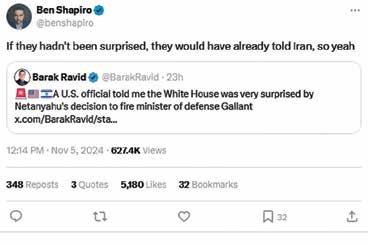

America Unburdens Itself From What It Has Been
-Headline on The Babylon Bee
Democrats Wonder If It Is Too Late to Go Back to Joe Biden
-ibid.
I will not come back, Jonathan, how’s that? I’m done.
- Conservative radio host Hugh Hewitt, as he abruptly left a Washington Post live show when the liberal hosts claimed that Trump will end democracy
Drink Guinness and don’t marry!
- Kathleen Hennings, of U.K., sharing her secrets of longevity at her 105th birthday party
It’s very meaningful that the oath was made on the Torah, especially in the week of the Parshas Lech Lecha. This parasha marks the beginning of Abraham’s journey, who, under Divine command, leaves his homeland and embarks on a path of purpose and mission. Just like Abraham, who was given the responsibility to spread the message of the Creator and bring light and guidance to the nations, this oath also carries a deep message: a call to take on a role of influence and leadership, bringing the values of the Torah and the principles of life and freedom to others.
- Argentina’s President Javier Milei at the swearing-in of Gerardo Werthein as the new foreign minister of Argentina
Abraham’s journey wasn’t only physical but also spiritual, connecting him with other nations, where his influence and values impacted many. May Gerardo receive these blessings, achieving success in his own “journeys,” becoming a channel for positive influence and transmitting the essence of the Torah in his surroundings. May Hashem grant him strength and clarity to fulfill this sacred mission, and may he be a source of blessing and light to those around him. Amen!

If you see someone in the fetal position drenched in sweat, they either just ran the New York City Marathon or they’re waiting for tomorrow’s election.
- Jimmy Fallon

- ibid.
This is why the kids hated it. What kind of lives have these people led that makes them think that this is the right way to handle young people?
- Comedian Jerry Seinfeld responding to the announcement by the private New York City school that his children attended (Ethical Culture Fieldston School) that they will allow “emotionally distressed” students to skip class the day after the election
I was in depression, and I realized that I was in a bad place. So having that, having to make those kind of choices, and I signed myself into Walter Reed to get help because of the depression. I chose to get help, or I chose not to follow the path of self-harm. And so that’s a way I’ve had an impact through all of that and also my voice through after what happened on October 7th. And I’ve decided I was gonna be a very consistent voice for Israel throughout that.
- Sen. John Fetterman on The Joe Rogan podcast
Tomorrow is Election Day and “Late Night” is officially endorsing Xanax 0.5 milligram, twice a day as needed.
- Seth Meyers
You are the media now.
- Tweet by Elon Musk on election night after Trump won and the legacy media officially died


Palestinian terrorists are freedom fighters, sanctions should be imposed on Roham, Smotrich, Ben Gabir and the IDF for carrying out a second Nakba in Gaza
- Publisher of left-wing Israeli newspaper Haaretz , Amos Shokan, at a conference, resulting in hundreds of thousands cancelling their subscriptions to the paper
I would like to issue an apology to all of those states we have not mentioned. It is not our fault, it is the founding fathers, they decided on this thing called the Electoral College. Which interestingly, no other country in the world decided to copy. Because of that, in presidential terms, in effect on nights like this, you have a right to think that it feels like no one cares about your vote. If you are in California or if you’re in New York, and when you think about how enormous a force that can be in voter suppression, there may be nothing quite like it.
- MSNBC host Lawrence O’Donnell on election night
- Headline on the conservative Gateway Pundit trolling the media
AOC Enraged to Learn Long Line is for Voting and Not Bread
-The Babylon Bee
Deny it though he may, the evidence produced in a House Committee on Education and the Workforce report about antisemitism on college campuses is an appropriate coda to Sen. Chuck Schumer’s career-long attempt to pose as the shomer of Israel in Congress. That he was advising leaders of Columbia University in New York City not to worry too much about criticism of their failures to protect Jewish students because only Republicans cared about the issue is a disgrace.
Still, the gap between Schumer’s public lip service condemning the postOct. 7 surge in antisemitism in the United States and what he says in private is indicative of more than his own corrupt mendacity. It demonstrates how badly compromised the supposedly pro-Israel wing of the Democratic Party has become in recent years.
While many in the GOP would agree with Schumer’s assertion about their party being the only one that cares about antisemitism, it really isn’t accurate. Many rank-and-file Democrats, including a solid number of Jews who may be politically liberal but, unlike Schumer, are still ardent supporters of the U.S.-Israel alliance, are deeply troubled by the rise of the anti-Israel leftwing of their party.
The Senate Punts On Antisemitism
Still, it was no accident that it was the Republican-controlled House that conducted the only serious hearings and investigation about the plague of antisemitism sweeping across the country in the weeks and months following the Oct. 7 terrorist attacks in southern Israel by Hamas and other Palestinians. The Democrats control the Senate and could have easily seized on this issue but given


By Jonathan S. Tobin

the hostility to Israel from some prominent members of their caucus, Schumer made sure none of the upper body’s committees seriously took it up.
The same is true of Schumer’s decision not to allow a vote in the Senate on the Antisemitism Awareness Act that codified the International Holocaust Remembrance Alliance’s (IHRA) working definition of the term into federal law.
That measure overwhelmingly passed the House last May by a 320-91 margin with 21 Republicans and 70 Democrats voting no. But Schumer, like the Biden-Harris administration’s chief worry during the course of the presidential campaign, is about alienating so-called “progressives” in his party who traffic in the hatred of Israel and Jews. That’s why he is carefully avoiding fighting the most prevalent current form of antisemitism, which is focused on the demonization of Israel and its supporters, even though he never tires of claiming that he is the Jewish state’s biggest booster. The fact that he’s getting very little pushback from centrist Democrats for this failure is telling.
For decades, the Senate Majority Leader has used a superficial similarity of his last name with the Hebrew word for “guardian” or “watchdog” to claim that he could be counted on to defend Israel and the Jews. But as President Joe Biden—his longtime Senate buddy—would have put it, that was always a “load of malarkey.” Schumer has always been, like so many of his fellow politicians, a cynical opportunist rather than a man on a mission to stand up for the interests of his own community.
A vicious partisan who even stooped to personally threatening Supreme Court justices for rendering decisions he opposed, Schumer has had a longtime goal of power, not policy. Whenever he was presented with a test of whether he would stick to the principles he claimed to support and partisan interests, he chose the latter. That was true when it came to the dangerous 2015 Iran nuclear deal (which he technically opposed while pledging not to try to influence anyone else to join him in voting “no,” rendering his stand meaningless). And it was equally true when he bashed Is -
rael’s government in the middle of a war for its survival, thus providing cover for Democrats who were seeking to prevent the Jewish state from defeating Hamas after the Oct. 7 massacre.
As damning as those examples were, the text messages from former Columbia University president Minouche Shafik to her board members about the advice given to her by Schumer is the sort of betrayal that should put an end to his pretensions about being someone who gives a [darn] about antisemitism or the welfare of Jewish students. By telling her that Columbia’s leaders should merely “keep [their] heads down,” Schumer showed his true colors.
According to Shafik, they should merely wait for the storm over the rampant Jew-hatred occurring on campus to pass because of their tolerance for proHamas protesters intimidating Jewish students. The reason for this was even more troubling. The advice relayed to Columbia board members David Greenwald and Claire Shipman was that they needn’t worry too much because the school’s “political problems are really only with Republicans.”
Schumer’s office has denied the evidence produced by the House of Representatives Committee on Education and the Workforce, chaired by Rep. Virginia Foxx (R-N.C.), calling it “hearsay.” But it’s highly unlikely that Shafik would have lied about her conversations with Schumer in private communications with her board that were subsequently subpoenaed by the committee.
The revelation about Schumer’s contemptible indifference to the treatment of Jewish students as well as Columbia University’s institutional failure to do something about the way its Hamas-sup -
porting students and faculty members were turning the Morningside Heights campus into a no-go zone for Jews made headlines. But the 325-page House report is a compendium of many other outrageous examples of how some of our elite universities betrayed their principles and their students after Oct. 7.
The committee behind the report is chiefly remembered for its hearing last December, during which the presidents of Harvard, the Massachusetts Institute of Technology and the University of Pennsylvania responded to a question from Rep. Elise Stefanik (R-N.Y.) about whether advocacy for genocide of Jews violates the rules of their schools. Each answered that “it depended on “the context,” which demonstrated that, like Schumer, they were more worried about being attacked by the intersectional antisemitic left for opposing antisemitism than they were about their willingness to give Jew-hatred a pass.
What mattered about that exchange was not so much the subsequent opprobrium that rained down on their heads from a broad cross-section of American public opinion outraged at the idea that elite universities thought antisemitism was merely a matter of opinion. That’s
especially true since everyone knows that advocacy for prejudice against other minorities, like African-Americans, would cause the full weight of the power of these schools to come down on the heads of anyone who advocated for, say, the lynchings of black Americans—the way the pro-Hamas mobs did for the killing of Jews and Israelis.
The committee’s report reveals how the behavior of a number of elite universities was actually worse than it was initially reported in the media. And it makes an ironclad case that their actions were clearly in violation of Title VI of the 1964 Civil Rights Act which prohibits federally-funded institutions from engaging in discriminatory behavior.
The report is important in its own right. But it begs the question as to why the Department of Justice’s Civil Rights Division, rather than the largely powerless and ineffective Department of Education, isn’t addressing the issue of antisemitism in our education system.
The answer is that the current regime at the DOJ is much more interested in enforcing the woke catechism of diversity, equity and inclusion (DEI) that is primarily responsible for enabling exactly the sort of outrages that are detailed in
the House report. What is needed is a change in federal policy that will produce a DOJ that is interested in rolling back the widespread discrimination produced by DEI rather than supporting it.
Schumer’s contemptible denials of his complicity in what happened at Columbia remain unsurprising, but they are compounded by the fact that a new book is expected to be published under his name (though likely ghost-written by a staffer) in February is reportedly devoted to his analysis of contemporary antisemitism. Given Schumer’s inveterate partisanship, it’s likely that the book will talk more about false accusations against former President Donald Trump than it will about the real antisemitism happening within his own party. But after the House report, his publishers would be wise to spare themselves further embarrassment and shelve plans for rolling out the senator’s book.
Antisemitism shouldn’t be a partisan issue. While clearly outnumbered, there are still Democrats like Sen. John Fetterman (D-Pa.) who provided the country with a profile in courage when it comes to standing up for Israel and against the woke antisemites in Congress. The two parties have largely ex-
changed identities in the last half century as each changed course on Israel. Whereas once the opposite was true, today, the Democrats are deeply divided when it comes to support for the Jewish state while Republicans have become lockstep in their support. Their attitudes towards antisemitism directly stem from this sea change.
And though they haven’t demonstrated the kind of influence that the radicals of the House “Squad” wield over the Democratic Party, there are Jew-haters on the right , like Candace Owens and Tucker Carlson, who deserve close scrutiny and condemnation.
Schumer’s public and private conduct as Senate Majority Leader made it clear that the Democratic Party establishment would rather be called out for going easy on antisemites than confront the hate within their own ranks. Regardless of the outcome of this year’s presidential and congressional elections, that decision demonstrates a trend that is at the heart of the nation’s antisemitism problem. (JNS)
Jonathan S. Tobin is editor-in-chief of JNS (Jewish News Syndicate).


BEIRUT - A company of Lebanese soldiers assigned to maintain order in this anxious wartime capital is gathered at its headquarters 100 yards from the Mediterranean. I make the blunder of asking their commander how many of his men are Shiites, Sunnis, Christians and Druze.
“We don’t talk about this in the army!” he snaps back. This is a forbidden topic for a military that is a precious symbol of national unity in a religiously fragmented country. The mission of the Lebanese Armed Forces, or the LAF, as it’s known, is to transcend sectarian identities and build a sovereign country.
So I try another question: Is the LAF ready to take control of southern Lebanon and implement the Biden administration’s plan for a cease-fire between Israel and Hezbollah? Under the U.S. proposal to implement U.N. Security Council resolution 1701, Lebanese troops would secure the border area and prevent the Iranian-backed militia from operating there.
The commander turns to a green-bereted sergeant named Walid, who steps forward, stamps his feet and gives a snappy salute. “Of course we can protect the country!” he shouts. A Lebanese general pulls me aside. “As long as we work together, and no foreign country intervenes against us, we can succeed.”
That’s the Lebanese dream for the “day after” in this war – captured in a snapshot last week as Israeli drones were buzzing over the capital and Israeli jets were bombing Hezbollah positions throughout Lebanon. Talking to more than a dozen Lebanese political figures, I couldn’t find a single one who didn’t want the Lebanese government to replace the contorted state-within-a-state that Hezbollah has created over the past few decades. But how?
Lebanese leaders insisted to me that a breakthrough deal can be achieved quickly if Israel halts its attacks.
Prime Minister Najib Mikati, a Sunni Muslim, said in an interview that his
By David Ignatius

“priority” is “full implementation” of Resolution 1701, which calls for disarmament of Hezbollah in the south. Parliament Speaker Nabih Berri, a Shiite who has been speaking for Hezbollah, said: “I want the cease-fire yesterday, today and tomorrow.”
Gebran Bassil, the head of a Christian political faction called the Free Patriotic Movement that was previously allied with Hezbollah, told me: “Many Lebanese are happy that Hezbollah’s veto power is broken. However, we believe that the diversity of sects in Lebanon is sacred and should be maintained in equal power among all.”
It’s an exhilarating vision of a restored Lebanon. But is it realistic? Can the army and nation hold together with U.S. support, when Israel and Iran still see Lebanon as the main arena for their brutal conflict?
These questions feel personal for me. I have been visiting Beirut for nearly 45 years, and I was in the U.S. Embassy in Beirut on April 18, 1983, less than an hour before a massive car bomb exploded at the front door. The attack, which killed 63, was organized by Iranian-backed operatives who were predecessors of
Hezbollah, and it was the beginning of a terrorist war against the United States in the Middle East that continues to this day.
The American official I interviewed in the embassy that day 41 years ago painted a rosy picture of how the United States was helping to create a strong Lebanese army that could repair the nation after the 1982 Israeli invasion. It was a beguiling dream of American-led reconstruction in the Middle East, almost identical to today’s. But as the bombings, kidnappings and assassinations accelerated, the United States didn’t have the stomach to see it through – and U.S. forces withdrew in 1984. The mayhem continued, and thousands of Lebanese were killed.
Will it be different this time? I want to believe the answer is yes. But the Biden administration’s laudable cease-fire diplomacy is taking place on the eve of an election. And as in past forays in the Middle East, there’s little evidence that the American people understand or are ready to stand behind the commitments that White House mediator Amos Hochstein is making.
I asked a well-informed American in Beirut last week what the United States would do if a Lebanese advocate of a
cease-fire with Israel were assassinated or a car bomb exploded. I didn’t get a clear answer, but U.S. officials need to be sure this time that Lebanon is building on solid foundations rather than quicksand, and that the United States and its allies are committed to standing with them through what will be a long process.
The Lebanese army is the cornerstone for the American cease-fire plan, but it’s a fragile one. At a roundabout near the LAF’s headquarters in Yarze is a military monument, 100 feet tall, that shows armored vehicles and artillery tubes encased in concrete. That’s an unintentionally revealing picture of the LAF in recent years, a fighting force that has been immobilized by lack of national political consensus.
The LAF is ragged right now. It has about 70,000 troops, U.S. officials believe, but many are moonlighting at other jobs to support their families. A few LAF checkpoints near key areas were sometimes empty in October, Post colleagues tell me. To keep the army afloat, the United States and Qatar have provided subsidies to pay soldiers at least $100 a month, but the money is running out.
Over a long conversation at the officers’ club, a senior Lebanese general explained how the LAF can become a real fighting force. The process starts with its commander, Gen. Joseph Aoun, a bear of a man whose bulk resembles Gen. Michael “Erik” Kurilla, the U.S. Central Command leader, who has worked closely with Aoun. Unlike many prominent Lebanese, there is no evidence that Aoun is corrupt, according to a U.S. military official here.
Aoun is making plans to bolster the LAF for its mission in South Lebanon. The senior general said the army needs $930 million to acquire a new fleet of armored vehicles and new weapons and gear. It has about 4,800 troops in the south now and expects to boost that number quickly to 5,500 after a cease-fire – on the way to 10,000 six to eight months from now.
Since Israel began bombing Lebanon heavily in September, 31 members of the LAF have been killed, 11 on the field and 20 in their homes, the general said. Perhaps 50,000 soldiers have been forced to leave their residences, part of the 1.2 million Lebanese displaced by the war, and the army is providing temporary shelter for these troops and their families.
The army continues to maintain regular indirect liaison with the Israeli military, so that it won’t encounter fire as it moves. As for Hezbollah, the general said, its main command-and-control node is now headed by Islamic Revolutionary Guard Corps officers operating from the Iranian Embassy.
The LAF’s best forces might be six “intervention regiments,” like the one I visited in West Beirut. That unit had advisers from several European countries. In the regimental operations center, commanders described how they are keeping order in an area bursting with refugees from Hezbollah strongholds such as the Dahiya neighborhood a few miles away.
“We have a crowded city now,” said one commander, in an understatement. As the new arrivals dart about on scooters, often against traffic, tempers flare. The LAF runs regular patrols, and when a group of refugees tried last month to occupy a building, the troops enforced the landlord’s order to leave. So, there’s reason to believe these troops could perform in the south.
Given Aoun’s firm hand on the LAF, some Lebanese – and many U.S. officials – see him as Lebanon’s next president, a post that’s now vacant. One member of the Lebanese parliament who’s a strong Aoun supporter argued: “You need a dictator for the country for two years,” someone who is “outside the corrupted group.” But a former Lebanese cabinet minister cautioned me against relying on a military strongman. “Lebanon is not Egypt,” he said.
Mikati and Berri, the prime minister and parliament speaker, are symbolic of Lebanon’s political class. Both are very wealthy men, with decades of experience with the mosaic of political factions and the Lebanese “art of the deal.” Detractors describe them as “the cartel” and “the dinosaurs.” But for the foreseeable future, they are the power brokers with whom Hochstein and future mediators must deal.
Mikati received me in his apartment atop one of the city’s most fashionable buildings, on the corniche overlooking the sea and mountains of Lebanon to the east. Tall and slender, elegantly dressed,
he’s a telecommunications tycoon who, in his political life, has managed to help steer Lebanon through some of its most difficult times.
The prime minister voiced strong support for each key provision of the deal he said Hochstein has proposed, including LAF deployment in South Lebanon, and a monitoring mechanism to ensure there’s a quick international response if the LAF can’t stop Hezbollah.
him about Iran, which has facilitated Hezbollah’s stranglehold on Lebanese politics. Berri gave me an encouragingly direct answer: “I don’t deny that Iran helps Hezbollah. Even Hezbollah says so. But if America helps Lebanon, then we will not take orders from Iran.”
Thinking about the United States’ role in Lebanon, past and future, I visited the American University of Beirut, passing through the main gate on Rue
named Makram Rabah.
We had an hour of earnest discussion with students about the gradual evolution of America’s policies toward Israel and the Arabs. But I finally had to ask the question that had been nagging at me. Did the students think that this time, America could finally help Lebanon regain its sovereignty?
I have been visiting
Beirut for nearly 45 years, and
I
was in the U.S. Embassy in Beirut on April 18, 1983, less than an hour before a
massive car bomb exploded at the front door.
Mikati favors extending Aoun’s term as army commander, which expires in January, because “we don’t change our officers in the middle of a battle.” But for president, he said Lebanon needs a “consensus” leader. “We are still divided” on who that should be, the prime minister said.
The most encouraging words from Mikati stressed the importance of seizing the moment for political reconstruction. “Lebanon is known for missing opportunities,” he said. “But I hope we will learn from this history and take the chance that we now have.”
I met Berri at his fortified compound in West Beirut, which has four gated entrances. He’s also a tall, welldressed man, who in addition to serving as speaker, heads a Shiite militia called Amal that has often been a silent partner of Hezbollah.
Ali Hamdan, for many years Berri’s closest political adviser, met me in a conference room outside Berri’s office. He cautioned that Israel should recognize that “military power doesn’t solve the problem in Lebanon.” Israel should see that “‘winning’ should be written with quotation marks,” he said, and avoid the overreach of its 1982 invasion of Lebanon, which became a deadly quagmire for Israel
“We have a very rare chance to save Lebanon, and we should not return to business as usual,” Hamdan said before taking me to see his boss.
Berri affirmed his support for the details of Hochstein’s plan. But I pressed
Bliss, which bears the biblical promise engraved by its Protestant missionary founders: “That they may have life and have it abundantly.” I attended a class on “the United States and the Middle East,” taught by a distinguished historian
Most students seemed to believe that change was indeed possible – if anchored in hardheaded realism. “The only way to regain Lebanese sovereignty is for the state to have a monopoly of violence,” said a bearded student named Nasser. “Militia power has brought nothing but blood and death to Lebanon,” agreed a student named Charles.
The Biden administration, in its waning days, has framed a careful plan to salvage Lebanon from Hezbollah’s arrogance and Israel’s bombs. It’s a noble effort, but the United States must be ready to walk steadily with our Lebanese friends down what will be a dangerous road. If we’re not serious this time, we’ll just get more Lebanese killed.
© 2024, Washington Post Writers Group

by Neil MacFarquhar
WASHINGTON — Paul Whelan was in Moscow that day at the storied Metropole Hotel, getting ready for the wedding of a fellow U.S. Marine, when a longtime Russian friend, a junior officer in the frontier guards, dropped by unexpectedly.
The friend handed him a thumb drive that he said contained souvenir photos and videos from a trip the two men took around Russia months earlier. Whelan pocketed the drive, when suddenly a few men in civilian clothes, some with their faces covered by balaclavas, burst into the room.
“We are with the Federal Security Service, and you are under arrest for espionage,” Whelan recalled one of them saying in English. “I have not committed espionage,” he responded.
Speaking in Washington in his first lengthy newspaper interview
since he was released on Aug. 1 in the largest East-West prisoner swap since the Cold War, Whelan, 54, said he thought the arrest, in late December 2018, was a prank. It wasn’t.
Within hours, he found himself locked into a 9-foot-square cell in Moscow’s notorious, high-security Lefortovo Prison, where Soviet-era political prisoners had been tortured. So began
buttonholes on winter uniforms for government workers.
“It was tedious, monotonous and filthy,” he said, adding: “You are somewhere you don’t necessarily want to be, you know, in miserable conditions, doing things you don’t want to do with people you don’t really want to be with. You have absolutely no control over when you’re going to leave and go home.”
He kept his morale up by beginning every morning with renditions of the four national anthems of the countries of which he is a citizen.

Whelan’s odyssey through what he described as Russia’s harsh, often surreal, state-manipulated criminal justice system. His ordeal lasted, by his own count, five years, seven months and five days.
At Lefortovo, he survived an emergency hernia surgery in the middle of the night at a hospital where, he said, half the overhead lights did not work, and when the doctors dropped instruments on the floor, they picked them up and kept going. Sent to a labor camp after his conviction, he endured a diet of bread, tea and a watery fish soup that seemed better suited as cat food, as well as once-a-week cold showers and long days sewing buttons and
Whelan’s arrest was a new chapter in what is called hostage diplomacy, when citizens of the United States or other nations are arrested and imprisoned on sham charges in order to be exchanged for a person or some concession.
For the U.S., the practice goes back at least to the Barbary pirates, who kidnapped about 100 Americans in 1793. In recent times, it can be dated to the seizure in 1979 of 52 Americans at the U.S. Embassy in Iran by hard-line student revolutionaries. Violent Middle Eastern factions like the Islamic State group continued the practice, sometimes beheading captives they could not ransom.
But Whelan’s case was tricky because the Kremlin itself, not a terrorist organization, grabbed him. The officers of the Federal Security Service — the former KGB, now known as the FSB — who took him were clear about their motive: to get three Russian prisoners held
in the United States released.
“They said, well, you know, we’re hoping that the American government and our government will do a change, you for them,” Whelan said, a statement that he said was repeated numerous times over the years.
Whelan first traveled to Russia in 2006 for pleasure while serving with the Marines in Iraq. A World War II buff, he was drawn to its major battlefields and eventually visited at least six times. When arrested, he was the head of security for BorgWarner, a Michigan-based international auto parts manufacturer. Along the way, he opened an account on VKontakte, Russia’s Facebook, and befriended about 70 Russians, usually men younger than himself, many with security backgrounds. Whelan, a former Michigan police officer, said he was hoping to trade insignia.
In 2008, Whelan received a “bad-conduct discharge” from the Marines, found guilty of trying to steal more than $10,000 in U.S. government funds in Iraq. He said he would only discuss the case in a planned memoir.
American officials have long pointed out that the United States, like most nations, dispatches spies with diplomatic passports — meaning they are immune from prosecution if accused, but usually expelled — and it would avoid sending anyone with a criminal record.
Whelan had known the officer who handed him the flash drive for 10 years: His own parents stayed at the Russian’s home near Moscow in 2009.
Russia, accusing Whelan of being a brigadier general in the U.S. Defense Intelligence Agency, insisted that he face a secret trial on espionage charges. The closed proceedings were “a sham,” Whelan said, a “Moscow goat rodeo,” designed to resemble a judicial process.
“They don’t want it to look like
they’re just grabbing tourists out of hotels and charging them with espionage so they can hold them for ransom, which is what they’re doing,” he said.
The case hinged on the contents of the flash drive, which were never shown in court but prosecutors said included the names and pictures of cadets at a department of the FSB. The drive was taken from him right after his arrest and never appeared again, Whelan said, with its contents retroactively declared classified.
During one session, the judge indicated that five cardboard boxes arrayed in front of him all contained evidence, none of which he or his FSB-appointed lawyers were allowed to read.
Years later, Russian state television broadcast a few minutes of footage from Whelan’s Metropole Hotel bathroom, showing him being handed the thumb drive in that bathroom. The FSB had clearly mounted the camera, Whelan said, and it was likely a permanent fixture because a Norwegian man arrested just before him on espionage charges had also been assigned the same room, 3324.
In June 2020, Whelan was sentenced to 16 years in a labor colony, and within minutes was told that he would be home within two weeks.
It proved to be far longer. He was left behind twice when the U.S. government negotiated separate trades for two Americans who were arrested after him, a frustrating and demoralizing experience, he said.
Initially it was thought that he was taken to trade for Maria Butina, accused in 2018 of acting as an unregistered Russian agent in the United States. But her relatively short prison sentence ended before Whelan was convicted.
In 2022, the U.S. government exchanged Viktor Bout, a Russian arms dealer, for basketball star Brittney Griner; and a drug trafficker, Konstantin Yaroshenko, for Trevor Reed, another former U.S. Marine. Russia balked at including Whelan in either exchange.
“It was devastating,” Whelan said, feeling abandoned by the U.S. government. “I was obviously not as important as others.”
He kept his morale up by beginning every morning with renditions of the four national anthems of the countries of which he is a citizen: Canada, where he was born; Britain, where his parents were from; Ireland, home of his grandparents; and the United States.
His Lefortovo cell had been newly painted and included a few amenities

like a flat-screen television, he said. While waiting for his trial to begin, he churned through spy novels and classic Russian tomes like “War and Peace.”
After his conviction he was sent from Lefortovo to the labor camp IK-17 in the remote region of Mordavia, southeast of Moscow. During World War II, German prisoners of war remodeled it, so it still resembles Auschwitz, he said, with low brick buildings surrounded by barbed wire fences.
In exchange for cigarettes, the guards would bring prisoners meat, fruit and dairy products to add to the meager prison diet. He could buy burner cellphones that way too, keeping in regular touch with his family. Griner and her basketball teammates donated money to his prison account.
At night in both prisons, guards checked on him every two hours, ostensibly to confirm that he had not escaped, sometimes shining a bright light on his face. He considered it harassment and still has trouble sleeping.
He tried to retain a modicum of control over his life by setting his own timetable. If the official wake-up time was 6 a.m., he would get up at 5 and be the first in the exercise yard. s eeing pictures of himself in prison or in court triggers a kind of post-traumatic stress syndrome, he says, and he relives the darkest moments. He hopes that will fade over time.
In Russia, at least 11 Americans or dual Russian American citizens are serving disproportionately long sentences on various charges.
Ryan Fayhee, the lawyer who represented the Whelan family pro bono in
their efforts to free him, said that to combat hostage diplomacy, countries taking captives must face sanctions or other measures; seizures must be escalated to immediate, high-level attention; and the United States must try harder to keep Americans out of countries with a record of taking hostages, including
Russia, Iran and China.
Whelan’s first hint that he might be released came when two FSB handlers asked him to request a pardon from Russian President Vladimir Putin. He wrote a letter saying that he had not committed espionage, that his parents were aging and that his beloved golden retriever, Flora, had died.
He was released in a historic exchange of 16 journalists, Russian opposition figures and others for eight Russians, including a convicted assassin.
While incarcerated, he lost his job and his apartment. Unmarried, he is back living with his elderly parents in Michigan, lacking the financial means to establish a new life. He has started a GoFundMe campaign.
He is doing advocacy work, he said, to get better medical care for his Central Asian friends still imprisoned in Russia, and to press for the release of incarcerated Americans.
“I can’t get revenge, right?” he said. “The only thing I can do is to look forward.”
© The New York Times

By Helene Cooper and Kenny Holston
MAUNA LOA, Hawaii — Early one morning this month, 864 Army paratroopers bundled into C-17 transport planes at a base in Alaska and took off for a Great Power War exercise between three volcanic mountains on Hawaii’s Big Island.
Only 492 made it. Some of the C-17s had trouble with their doors, while others were forced to land early. A few of the parachutists who did make it sprained ankles or suffered head trauma. And one — a 19-year-old private — began to fall quickly when his chute did not open.
Across the field, shouts of “pull your reserve” could be heard before the young private hit the ground and medics ran to treat him. The horrifying scene and its aftermath encapsulate every jumper’s worst nightmare.
But Pvt. 2nd Class Erik Partida’s 1,200foot fall was also a stark reality check as the U.S. Army transforms itself, and its hundreds of thousands of young men and women, for yet another war, this one a potential conflict with China.
The Pentagon calls it a Great Power War, and it would be exponentially more dangerous. It would put the world’s two strongest militaries — both of them nuclear superpowers — in direct conflict, possibly drawing in other nuclear adversaries, including North Korea and Russia. U.S. troops would be killed, in numbers that could possibly go beyond the toll from America’s deadliest conflicts.
Such a war would be fought on the ground, at sea, in the air and in space. So the Army is practicing for exactly that. Forget the Marines, who can get anywhere quickly, because they travel light. Or the Navy, which practically lives in the Pacific. Those services, which featured heavily in the Pacific during World War II, have the planning for a conflict in Asia

baked into their DNA.
But now, as the chances of war with China increase, the big and cumbersome Army is trying to transform itself after two decades of fighting terrorism in Afghanistan and the Middle East. Unlike the Taliban or other insurgents, China will have satellites that can see troop formations from the sky. The Army must, in essence, learn how to fly under the radar.
To stress-test the Army’s ability to deploy quickly and fight on Pacific island chains, soldiers with the 25th Infantry Division, along with Japanese, Australian, Indonesian and other partner troops, rappelled into jungle ravines and then made the humid climbs up, laden with gear.
Some 28 miles away at Pearl Harbor, Army transport ship crews ironed out various ways to discharge the military equipment and the troops they will need in the event of war in the Pacific.
And not far from the North Shore of Oahu, soldiers worked to disguise a multivehicle command and control unit, complete with big-screen computer stations, so that it was almost indistinguishable from
the deep green forest.
Former President Donald Trump and Vice President Kamala Harris have outlined vastly different approaches to Russia’s war in Ukraine. Their approaches to turmoil in the Middle East are also expected to be at least rhetorically different.
But no matter who wins in November, the United States will continue to prepare for war with China.
China has made clear that it will seek to expand its power in Asia, from militarizing uninhabited rocks in the Pacific to claiming sovereignty over international waters. And all of that starts with Taiwan, which President Xi Jinping has ordered the Chinese military to be ready to invade by 2027.
While Taiwan has its own defenses, military experts say it is difficult to see how the island would repel a Chinese invasion without U.S. help. Such a move would be a decision for whoever is president at the time, but American policymakers worry that staying out of it may not be an option if the United States wants to maintain its dominance.
“My sense is that a successful Chinese
invasion of Taiwan would send massive ripples throughout the region,” said Seth Jones, a senior vice president with the Center for Strategic and International Studies. “China would likely emerge as the dominant military power in the region, not the United States, and it would trigger a range of second- and third-order effects.”
For instance, America’s Pacific allies could lose faith in U.S. deterrence and try to make security deals with China. Japan and South Korea — both treaty allies of the United States — could join the nuclear club as a way to defend themselves against China.
“Is it quite the fall of the Roman Empire?” Jones said. “I don’t know, but that’s the right kind of question to ask.”
“Tyranny of Distance”
The U.S. Army knows how hard it would be to invade Taiwan.
During World War II, when the island was called Formosa and was occupied by Japan, the Joint Chiefs of Staff came up with Operation Causeway, an invasion plan that would give the United States a base closer to Japan from which to attack. Gen. Douglas MacArthur opposed invading Taiwan as too risky; it meant crossing a contested sea to fight on complex terrain against a well-defended army. Military planners said an amphibious assault on the island would have been far harder than the D-Day landings at Normandy.
Few Army planners think the Chinese military is ready to undertake an amphibious assault of Taiwan.
“The first thing you have to do is you have to generate an invasion force, which would be a pretty large force, to go onto an island which has a prepared defense,” Maj. Gen. Jeffrey A. VanAntwerp, the director of operations for the Army’s Pacific Command, said in an interview. “There’s
100 miles of Taiwan Straits that you have to get across, and you’re doing that in large transport vessels that are very vulnerable during that crossing.”
China would most likely use light amphibious vessels to try to secure a beachhead in Taiwan, military planners say, but those vessels would have to plow through heavily mined waters. And while air assault forces would probably try to target infrastructure, in the end there is no viable way to seize an island as large as Taiwan, with its own defenses and 23 million people, without putting a force on the ground — troops who would have to come by sea.
“you can’t do it without pushing a large landing force across the straits on ships,” VanAntwerp said. “There’s no other way.”
So China is working on it. Chinese military planners have repurposed civilian ferries to transport troops and equipment across the strait and are working to construct floating piers, U.S. officials say.
The Pentagon would not go into detail about how American trainers are helping Taiwan build defenses. But making clear to the Chinese that an amphibious assault would be fraught is part of the U.S. military’s deterrence plan.
Army officials also say they hope joint exercises with Pacific partners will show
Chinese military officials all the capabilities that the United States has and can bring to bear.
The officials point out that more than a quarter of the service’s 450,000 active-duty troops are already tasked to the Pacific.
But they define that region liberally, to encompass troops not only in Japan, South Korea and the Philippines but also in Alaska, Hawaii, Washington, Oregon and Cal-
nal for the exercises, can beach itself, discharging 900 tons of vehicles and cargo — and, if necessary, troops — onto islands.
Capt. Ander Thompson, the commander of the 7th Engineer Dive Detachment out of Pearl Harbor, was part of a detachment that spent several weeks this past summer with Filipino military divers clearing debris from a strategic port in the northern Philippine island of Batan, about
Learning how to advance in small teams that can attack and then dissipate into thin air was key.
ifornia. Taiwan is more than 6,000 miles from Joint Base l ewis-McChord near Tacoma, Washington, a separation the Army refers to as “the tyranny of distance.”
Docked in Pearl Harbor, the U.S. Army vessel Maj. Gen. Robert Smalls will be critical to getting all the apparatuses of the Army into the Pacific theater. The 300-foot-long ship, which recently arrived from Norfolk, Virginia, via the Panama Ca-

120 miles south of Taiwan.
The operation, which also deepened the harbor, will give Army and Navy ships better access to the port should conflict break out. Batan is near the Bashi Channel, a potential transit point for American forces headed to the Taiwan Strait.
The U.S. Air Force cannot establish air superiority over the entire Pacific Ocean, but it can open up corridors,
what the Army calls “interior lines” for unfettered movement, between, say, the Philippines and other islands. The United States has some troops already in place — about 54,000 in Japan, 25,000 in South Korea and a far smaller number in the Philippines.
The Hawaii exercises, which ended in mid-October, were devised to replicate the conditions that troops can expect in a war with China. Gone were the desert-sand-colored fatigues that became de rigueur during the Afghanistan and Iraq wars. The troops in Hawaii wore jungle fatigues and face paint.
Troops worked on new maneuvers patched together from watching Ukraine fight Russia. They dismantled and moved large and cumbersome command and control operations in 20 to 30 minutes and communicated with one another without using Army satellites, so that an adversary would not be able to pick up their conversations.
l earning how to advance in small teams that can attack and then dissipate into thin air was key. The Army sent to the troops 96 new rainforest-green infantry squad vehicles that can quickly move up to nine soldiers each through jungle terrain.
“It is so powerful to be able to send a

company’s worth of personnel, which is about 130 people, on those vehicles, along multiple routes, and then at a point bring them together to attack the enemy, and then disappear in different directions,” said Maj. Gen. Marcus Evans, the 25th Infantry Division’s commander.
The first of the 864 Army parachuters who took off from Alaska began appearing in the skies above the three volcanic mountains just after sunrise on Oct. 7.
From the ground, the sight could easily pass for an Army airborne commercial, as waves of jumpers shot out of the side of the C-17s and floated to earth, their chutes billowing. All of the soldiers were supposed to be equipped with two chutes, including a reserve if their primary chute did not deploy within four seconds after they jumped out of the plane.
Around 7:35 a.m., lt. Col. Tim Alvarado, the commander of the garrison at the Pohakuloa Training Area, peered into the sun as the next C-17 approached.
“The paratroopers should be standing at this point; they would have gotten the 10-minute warning,” he said, narrating the jump for me. “The jump master is looking out, making sure there are no obstruc -

tions as the parachuters are getting ready to jump out.”
The C-17 roared overhead, and the jumpers started appearing like closed umbrellas that whooshed open in the sky as their chutes expanded. “Some of them get twisted up so they have to unwind their ropes so they don’t land awkwardly,” Alvarado continued.
Then, surveying the scene, he said, “That’s not right.”
Before us, what looked like a cigarette in the sky was falling in the midst of the

canopy of ballooned parachutes. Above the jumper, Partida, air moved through his chute, creating a wiggly line. But the air did not inflate the chute.
“Pull your reserve,” Alvarado said quietly.
The reserve never deployed. Partida disappeared from view beneath a berm as he hit the ground.
Capt. Kaleigh Mullen, an Army doctor, started running. Medics stationed throughout the drop zone were doing the same.
Members of the Partida’s unit got to him first. He was calm and conscious, but his spine was damaged. Mullen arrived, panting from her seven-minute sprint. She and Maj. Mitch Marks, an Army physician assistant, propped up his neck and spine to make sure he did not suffer any additional damage.
“OK, so he was very talkative, and he was able to say that he didn’t have any pain,” Mullen told me later. She took his first set of vitals at 7:45 a.m., and by 8:20 the Black Hawk medevac helicopter was in flight, on its way to the hospital.
A statement released a day later provided few details. “An 11th Airborne Division soldier was injured in a training incident in Hawaii today,” it said. The release made no mention of the unopened chute or the reserve.
Nor did it mention that doctors later fused Partida’s vertebrae in multiple surgeries. Whether he will be able to walk again is not known.
Instead, the statement ended with a description of the purpose of the exercises, which included preparing paratroopers for “decisive action operations in the U.S. Army Pacific area of responsibility.”
© The New York Times


By Avi Heiligman



Both the U.S. president and Congress have awards that they are able to bestow upon deserving recipients. The Congressional Gold Medal is the highest and most prestigious award that Congress can give to a citizen. Many important historical figures and organizations have received the Gold Medal in recognition for their accomplishments. Congress has presented the award to many aviators and flying organizations for pushing new frontiers in air and space.
When World War II began, civil aviation worldwide was close to being grounded due to the needs of the military and the buildup of the air force. However, in the United States, there were thousands of pilots that for a variety of reasons had not joined the military but were capable of helping with the war effort. In 1941, the Civil Air Patrol was founded, and their operations soon began in earnest after the Japanese attack at Pearl Harbor. Most civilian planes were grounded after the attack so many pilots joined the Civil Air Patrol so that they would be able to fly. Cities and shipping along the coasts were a prime target for enemy submarines, but the military was underequipped for dealing with this threat. In
the first year of the war, hundreds of merchant ships were sunk. What the U.S. Navy needed was an early warning system to alert them of U-boats lurking off the coasts waiting to attack. The Civil Air Patrol began unarmed coastal patrols using radios to pinpoint the submarines’ locations to the army, navy and coast guard. Their planes were privately owned and operated, and both
submarines and had sunk two of them, although some historians maintain that research does not support the claim of the sunken U-boats. Additionally, Civil Air Patrol pilots reported on many Allied merchant ships in distress and came to the rescue of sailors from ships that had become victim to the U-boats.
These unpaid volunteers who put themselves in constant danger to pro -
By the end of the war, they had sighted 173 enemy submarines and had sunk two of them
men and women were accepted as sub chasers. Later on during the war, Civil Air Patrol planes were authorized to carry bombs and depth charges. It was dangerous work, and 62 civil aviators died in the line of duty. Ninety aircraft were lost on patrols. Even though the Civil Air Patrol was not military, 800 members were awarded air medals for their actions during the war. By the end of the war, they had sighted 173 enemy
tect the borders were awarded the Congressional Gold Medal in 2014. Former Jewish Congressman Lester Wolff accepted the award on behalf of the World War II members of the patrol. Wolff had served in the Civil Air Patrol as squadron commander and helped shape the unit in the years after World War II. During the war, he flew as a submarine chaser. While in Congress, Wolff was a founding member of the Civil Air Pa -
trol’s Congressional Squadron.
The Tuskegee Airmen and the Women Airforce Service Pilots (WASPs) were two World War II units that recruited minorities. Both were awarded the Congressional Gold Medal for their excellent service records during the war. The Tuskegee Airmen were mainly African-American pilots who flew as both fighter and bomber pilots during World War II. They were vital to the protection of bombing raids over Europe, and their Congressional Gold Medal is retained at the Smithsonian Museum in Washington, D.C.
In April 1942, a force of sixteen B-25 Mitchell medium bombers came out of the clouds over Tokyo in a surprise raid just months after Pearl Harbor. Colonel Jimmy Doolittle had recruited the crews and flew the land-based bombers off of the aircraft carrier, USS Hornet. Most of the planes crashed while attempting to reach China, and one crew was interred when they landed in Vladivostok , Russia. The physiological results from the raid raised morale in the U.S., and Japanese citizens began to fear their government couldn’t prevent more attacks. In 2014, these men were presented with the Gold Medal for “outstanding heroism, valor, skill, and service to the Unit-




ed States in conducting the bombings of Tokyo.”
Brigadier General Billy Mitchell also received the award for putting his career on the line trying to convince the military to spend resources on bombers and airplanes instead of battleships. His foresight during the interwar period between the two world wars was correct –battleships were soon a thing of the past while military aviation grew exponentially during World War II. In addition to the award, the B-25 Mitchell medium
bomber was named in his honor.
Four very famous astronauts were awarded the Congressional Gold Medal for their pioneer work in space flight.
Neil Armstrong, Buzz Aldrin and Michael Collins were recognized by Congress for the Apollo 11 spaceflight to the moon and John Glenn for his achievement of being the first American to orbit the Earth. The Congressional Gold Medal was also bestowed upon Katherine Johnson, Christine Darden, Dorothy Vaughan and Mary Jackson

for their valuable contributions during the Space Race as mathematicians and space engineers. In addition to these awards, there is also the Congressional Space Medal of Honor to recognize astronauts that distinguish themselves for their contributions in space.
Many other aviation pioneers and airmen also received the Congressional Gold Medal, including the inventors of the airplane, Orville and Wilbur Wright. Collectively in 2014, American flying aces, aviators that shot down at least
five enemy aircraft, were awarded the medal.
The achievements of those that have been awarded the medal is history that should be learned about and remembered.
Avi Heiligman is a weekly contributor to The Jewish Home. He welcomes your comments and suggestions for future columns and can be reached at aviheiligman@gmail.com.

VACUUM SALES AND REPAIR
All areas call Max Flam 718-444-4904
THE LEATHER SHOPPE
The spot for all your custom leather Judaica. Tallis/tefillin bags, lulav and esrog bags, havdallah sets, challah covers, shtenders, pesach sets, matzah/afikomen bags. WhatsApp: (732) 523-0007 or email: theleathershoppe732@gmail.com for a full catalog. We ship.
MY MOTTO IS DON’T WAIT TO buy real estate
Buy real estate and wait
Your realtor for life 516-784-0856 Alexandra at Realty Connect USA
PEACEFUL PRESENCE STUDIO
Men’s private yoga, Licensed Massage & Holistic Health Guidance 436 Central Ave, Cedarhurst Info. & free video training www.peacefulpresence.com 516-371-3715
GERBER MOVING
FULL SERVICE MOVING
Packing Moving Supplies
Local Long Distance. Licensed Insured
1000’S Of Happy Customers
Call Shalom 347-276-7422
HANDYMAN
For big or small jobs, Sheetrock, carpentry, painting, electrical, plumbing, install & repair appliances
Call Ephraim at 347-593-4691
MANAGEMENT STAFF WILL ASSIST
you with:
* Obtaining Medicaid and Pooled Income Trust
* In-home Assessments, Individual and Family Counseling
* Securing reliable home care assistance
* Case and Care Management services
Dr. S. Sasson, DSW, LCSW (718) 544- 0870 or (646) 284-6242
HAIR COURSE:
Learn how to wash & style hair & wigs. Hair and wig cutting, wedding styling Private lessons or in a group Call Chaya 718-715-9009
ZEVIZZ WOODTURNING JUDAICA Challah knifes, batei mezuzah, besamim holder, kiddish cups, havdalah candle holders, yad for sefer torah, pens, stenders, bowls and more 952-356-2228
ECO-FRIENDLY CONTRACTOR
Big or small jobs. from conception to completion windows, doors, plumbing, electrical, Kitchen Cabinet countertop. petitions, Bathrooms, tiling. additions , painting, any construction work. call MICHEL 9175383763 Shomer Shabbos
CEDARHURST
Don’t miss this opportunity!
4 Bedroom 21/2 Bathroom House Perfectly located in Cedar Bay Park, walking distance to all. Oversized property for expansion, A Must See. LOCATION, LOCATION. For More Info call (516) 881-7727 Leave Message
WOODMERE
Beautiful, brick, colonial boasting 5 bdr 3.5 Bth in pristine condition. Excellent location, near all! Move right in! RCUSA 516-512-9626
WOODMERE
Introducing a stunning 14-side hall colonial home in the Hewlett Woodmere School District. Formal living room, formal dining room, den with a skylight. Eat in Kitchen, two sinks, a double oven, a warming draw and a microwave. First floor bedroom, a full bathroom and laundry room. Two-car garage. Upper level has four bedrooms, two full bathrooms. Finished basement with playroom, storage and utilities. Well-groomed exterior with porch adjoining the master bedroom. Hardwood floors and back patio. Central air conditioning, inground sprinkler system, alarm system. Close proximity to schools, shopping centers, restaurants, and transportation options. Mark Lipner Associate Broker Berkshire Hathaway Laffey International 516-298-8457 mlipner@bhhslaffey.com

CAN’T AFFORD YOUR PROPERTY TAXES? MORTGAGE?
Must sell for any reason?
Call for FREE Consultation. Call now 212-470-3856
Cash buyers available!
WOODMERE
Spacious home within school district 14 with exquisite upgrades and central air conditioning, splendid kitchen with dual sinks, five bedrooms. Main level encompasses a spacious great room, office space, complementing the formal living and dining areas. Unfinished basement, detached garage. Expansive lot, measuring 80 x 100. Conveniently located near shopping, railroad, restaurants and places of worship. Mark Lipner Associate Broker Berkshire Hathaway Laffey International 516-298-8457 mlipner@bhhslaffey.com
HEART OF CEDARHURST
Entrance off Gourmet Glatt lot, second floor, shared bath, ideal for therapist/ office work, includes utilities, $600. Call 516-371-3715
Newly renovated. Ground floor 2 large bedrooms with great closets. 1 bathroom. Washer/ dryer Lots of natural light. Plenty of parking $2500 516-206-0528
BIG FULLY RENOVATED,
Woodmere, spacious 4bedroom 2 full bath split level.2 car garage +driveway. Backyard on water SD#14. W&D. Tons of storage space. 347-517-3552


LEAH SCHEININGER
Licensed Real Estate Salesperson Realty Connect USA 516-884-6530 (C) Lscheininger@realtyconnectusa.com
Franklin Ave. Hewlett NY 11557


LOCAL SCHOOL looking to hire a capable administrative assistant to assist the administrator in his daily tasks. Candidates must be detail-oriented, organized, and have the ability to multi-task. Job responsibilities include data entry, database management, reporting, vendor relations. Proficiency in Microsoft Office required. Enjoyable working environment, personal, sick, vacation days offered, Yom Tovim and certain legal holidays off. Salary commensurate with experience. Please email resume to admin@shoryoshuv.org
DON’T GET STUCK WITH A TWO STORY HOUSE YA KNOW, IT’S ONE STORY BEFORE YOU BUY IT BUT A SECOND STORY AFTER YOU OWN IT! Call Dov Herman For An Accurate Unbiased Home Inspection
Infrared - Termite Inspection
Full Report All Included NYC 718-INSPECT Long Island 516-INSPECT www.nyinspect.com
DELIVERY PERSON NEEDED to deliver this Newspaper every Thursday morning to locations in Brooklyn. Must have Mini van or SUVand availability to work Consistently every week. Good pay Please email gabe@ fivetownsjewishhome.com or call (917) 299-8082
SEEKING ELA TEACHER
Teaching position for Gr. 6. Mon.-Thurs., afternoon hours. Far Rockaway/5T area. Great salary, warm, supportive environment. Training in our curriculum is provided. Teachersearch11@gmail.com
BNOS MALKA IS SEEKING Assistant teachers, AM or PM. Also seeking Resource Room teacher. M-Th 8:00-12:30, F 8:00-11:00. Special Education degree preferred. Must teach both Hebrew and English subjects. Send resume to rungar@bnosmalka.org



GREAT OPPORTUNITY!
Looking for a Payroll Processor for a Healthcare Management office in the Five Towns. No experience required. Reach out to Jobs@FCC-Corp.com
REGENTS EXPERT
Tutoring regents in Algebra and Geometry A Darchei Torah instructor. Guaranteed results Text 347-491-8045 WhatsApp 347-767-1755
5 TOWNS BOYS YESHIVA
Seeking Elem Gen Ed Teachers
Excellent working environment and pay. Only lic/exp need apply. Email resume to yeshivalooking@gmail.com
SEEKING ASSISTANT teachers for elementary General Studies classes for ‘24-’25 school year. Candidates should have skills to take over for teachers if needed. M-Th, PM hours, strong support. Far Rockaway area. Send resume to teachersearch11@gmail.com
HELP AUTISTIC CHILDREN
Develop Lifelong Skills Seeking Behavior Technicians for Ivdu Girls’ school, 9am-4pm. Supervision and training provided. High School diploma required.
Excellent growth potential, Frum environment, Excellent salary & benefits. Email resume to: resumetfs1@gmail.com
MDS REGIONAL NURSE
5 Towns area Nursing Home management office seeking a Regional/Corporate level MDS Nurse to work in our office. Must be an RN. Regional experience preferred. 2-3 years MDS experience with good computer skills required. Position is Full Time but Part Time can be considered. Great Shomer Shabbos environment with some remote options as well. Email: officejob2019@gmail.com

DEVELOPMENT ASSISTANT
A multi-tasker needed for general office work. The ideal candidate is someone who is detail-oriented, responsible, and can take ownership. Looking for someone who is eager to learn, and expand his/her skill set while possessing the ability to work independently and as part of a team. Experience with Excel required. Five Towns location. In-office position only, not remote. Please send resume to 5tpart.timecareer@gmail.com
In Great Neck, NY, is seeking general studies teachers for both the elementary and middle schools, for the upcoming academic year. Mon-Thur afternoons. Competitive salary, warm and supportive environment. Send resume to m.kalati@kolyaakov.org
SPECIAL ED TEACHER HASC seeks Special Ed Teachers for our Early Learning Program. Warm, supportive and enjoyable working environment. Great Pay and Benefits! Sign on Bonus! Referral Bonus! Please email resume to jobswd@hasc.net
ENCORE SUPPORT SERVICES
Is seeking Behavioral Technicians in Ivdu LI and Yeshiva Ketana during school hours. After-hours cases available in Hewlett and Far Rockaway. Supervision & training provided. HS diploma required. Email: talent@encoresupport.org
SHMIRAS HALASHON
Text 516-303-3868 with a time slot of your choice to be careful on lashon hara. Be a part of the 1,000 people for klal yisroel!






















